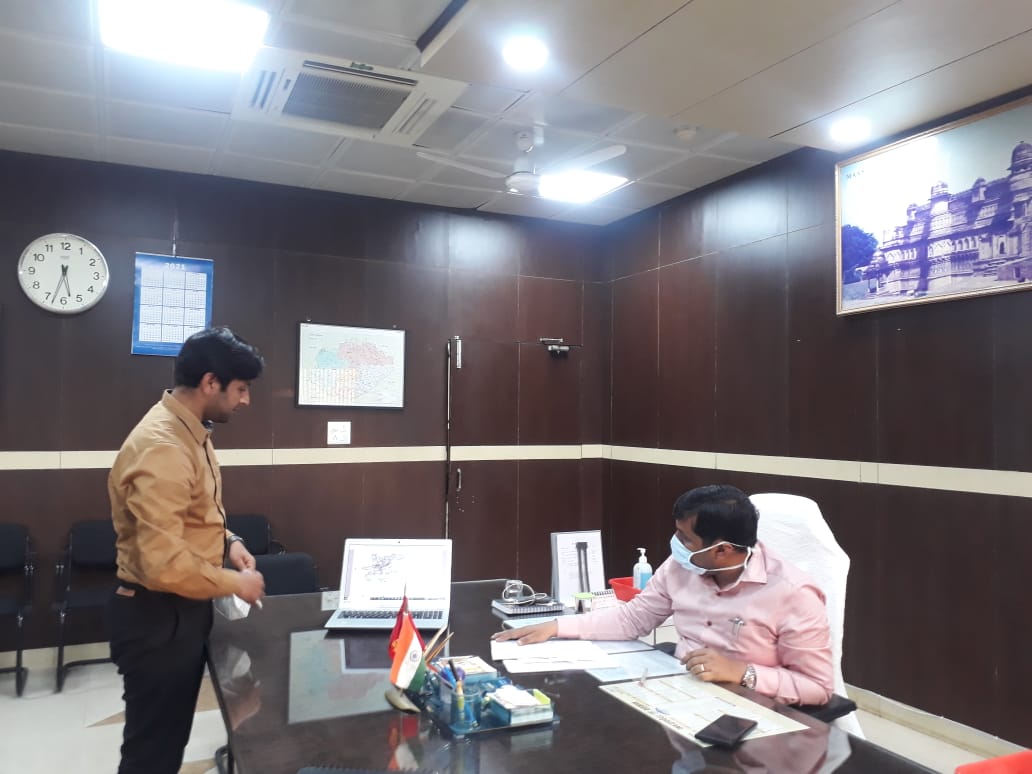2019
2020
2021
INDUCTION WEEK (14th January to 25th January 2019)
The inaugural cohort of the India Smart Cities Fellowship Program pursued a two-week induction program which started on 14 January 2019. The fellows,who hail from different parts of the country with varied backgrounds were encouraged to deeply understand India's urban system. Lectures by renowned practitioners and researchers along with excursions to project sites were arranged to help broaden their understanding during the induction. The highlights of the program included interactions with the Honorable Union Minister, Shri. Hardeep Singh Puri and Secretary, Ministry of Housing and Urban Affairs, Shri. Durga Shanker Mishra. Over the course of the induction program, the India Smart Cities Fellows were introduced to a myriad set of challenges that exist at the ground level in executing the Smart Cities Mission. They were encouraged to go beyond their own understanding and expertise while thinking of solutions and more importantly, to not think of problems or solutions in a vacuum. The induction program concluded with a team exercise in which the Fellows distilled their understanding of city systems, gained over two weeks, through presentations covering sectors such as housing, water, solid waste and finance.

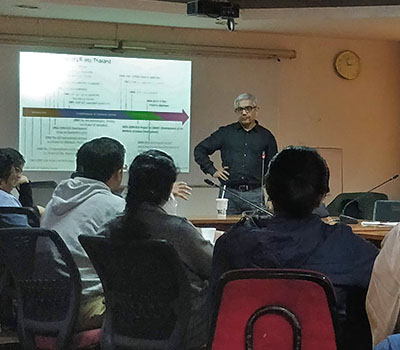
IDEATION WEEK (4th February to 11th February 2019)
On 4th February 2019, the fellows reconvened and were introduced to their deliverables and expectations. They were given the freedom to negotiate their interests with those of the Mission and draft problem statements that they would be willing to take on over the course of a year. The idea was to create not only strategies and recommendations but also pilots and action plans that could be scaled up to solve India's urban issues. So far, the Indian Smart Cities Fellows have mutually established a systematic and democratic process to identify twenty-one key problem statements of interest and impact. Over the course of the next few days, these problem statements would be further refined through literature reviews and interactions with sector experts. The envisioned goal is to create solutions that can be piloted in India's smart cities.
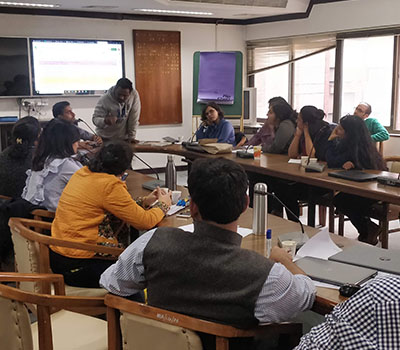
PROJECT FINALIZATION WEEK (11th February to 17th February 2019)
As the 4th week of the ISCF winds up, the Fellows are in the final stages of their project proposal. The various teams are currently in the process of preparing a detailed project proposal that includes Gantt charts that clearly show how their respective projects and team members will be deployed over the course of the next year. The ideas brought to light by the Fellows through interactions with industry Experts and Government Advisors has led to the creation of innovative, sustainable and tangible solutions that will be piloted and successfully implemented across the target geographies.
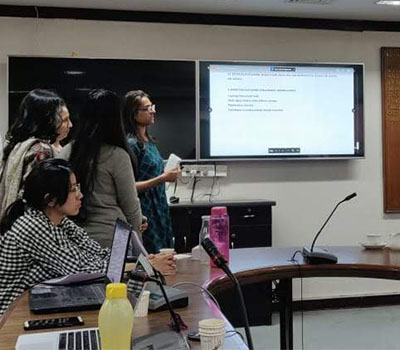
PROJECT PUBLISHING (18th February 2019 to 24th February 2019)
The fellows closed out their project proposals and created tangible deployment schedules for their projects and the pilots with their target cities. The fellowship program brochure will be officially launched at the Second Apex Conference of Smart Cities CEOs, held on 26-27 February 2019.
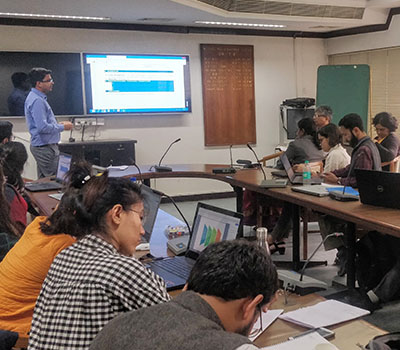
CEO's CONFERENCE (25th February 2019 to 3rd March 2019)
With the 2nd Apex Conference of Smart Cities CEO's happening this week, the fellows were deployed to the NDMC convention center to support the teams there and assist them. On 27th February 2019, the 2nd day of the conference, the Smart Cities Fellowship brochure was officially launched at the hands of the Secretary, MoHUA, Shri. Durga Shanker Mishra. Through valuable interactions with the smart city CEOs, the fellows spent the rest of the week zeroing in on the cities that they intend to deploy their pilots in.
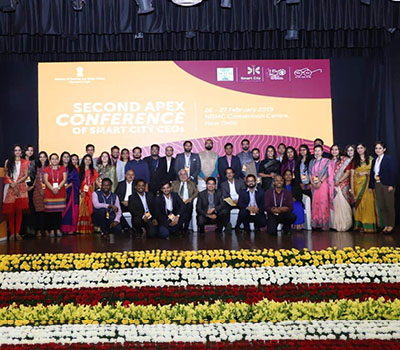
PROJECT PROPOSAL STAGE (4th March to 8th March 2019)
After an exhilarating week preparing and assisting the New Delhi Municipal Corporation and the Ministry of Housing & Urban Affairs for the Second Apex Conference of Smart Cities CEOs, the Fellows settled into the serious work of formulating their project proposals. Under the guiding influence of NIUA researchers and experts, each team reached out to sectoral experts, strategized and codified their ideas for the forthcoming year! Team Integrate met with Mr. Srinivasan (TCPO), the National Urban Livelihood Mission for data and inputs, and held a meeting with the Joint Secretary of National Urban Livelihoods Mission (NULM) and the NULM team.
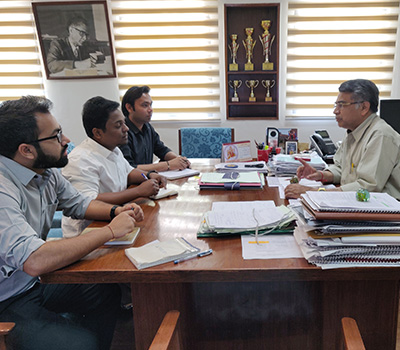
MEETING MENTORS (11th March to 15th March 2019)
Starting this week, the 12 teams were assigned expert mentors who will guide, support and analyze the projects. Fellows were encouraged to identify the industry leaders and experts under whose guidance they'd like to work. Simultaneously, the Fellows began working on data collection, writing value propositions for their ideas and creating primary data collection tools. Meanwhile, few fellows attended the India Smart Utility Week, 2019 held in Chanakyapuri, New Delhi. Team Integrate met with SCM Director Ms. Archana Mittal and consultants from NULM team.
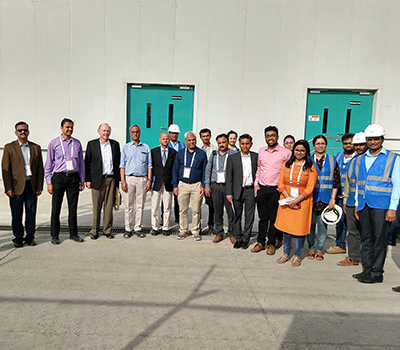
SMART SOLUTIONS FOR URBAN CHALLENGES (18th March to 22nd March 2019)
All groups worked on refining their research methods. Following Joint Secretary and Director, Smart Cities Kunal Kumar's directive, the teams worked on literature review and building a case for their selected projects. Teams visited the Mission Management Units at the Ministry of Housing and Urban Affairs for a better understanding of the projects. There was a sense of anticipation among Fellows for the festival of Holi, which many fellows celebrated together, further cementing the friendship and camaraderie begun only a few months earlier.
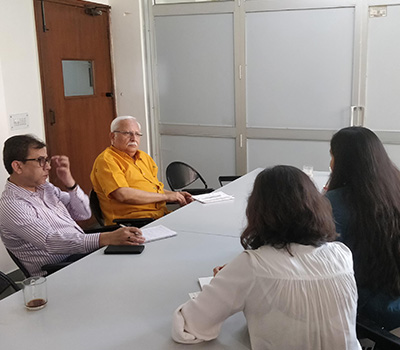
PLANNING AND FORMULATING RESEARCH TOOLS (25th March to 29th March 2019)
The Fellows felt a sense of determination to finalize their research tools and select the cities where they will study and implement solutions. Team Plan had the rare honor of meeting Padma Shri Bimal Patel, President, CEPT University along with Mission Director Mr. Kunal Kumar. The cohort had a group meeting with the Mission Director, Mr. Kunal Kumar and Ms. Janaki as well as NIUA Director, Mr. Jagan Shah to discuss the following month. The team also attended a training session at the University of Chicago Centre, New Delhi to prepare them for the challenges of field work, different approaches to engaging with various individual authorities across the district, state, and central governments. The India Smart Cities Fellows are grateful for this knowledge sharing!
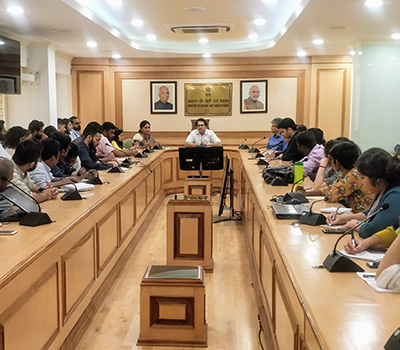
MEETINGS GALORE! (1st April to 5th April 2019)
This week teams met industry experts and reached out to the cities of their choice, in addition to meeting with their respective expert mentors to discuss their project ideas. Few teams also met with the New Delhi Smart City Limited CEO, Ms. Nidhi Srivastava to seek her guidance and permission to pilot their projects in the NDMC area.
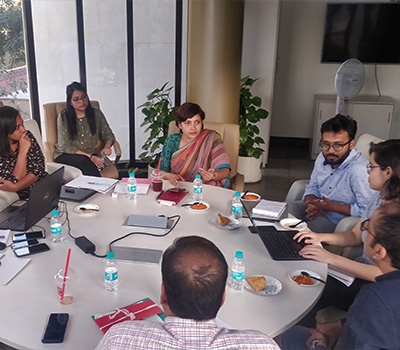
KEY-INFORMANT & EXPERT INTERVIEWS (8th April to 12th April 2019)
The team worked on refining and revising the scope of their projects under the supervision of their mentors. The fellows also met Prof. Indhumathi, Prof. KT Ravindran, Mrs. M Janaki, Mr. Kunal Kumar, Mr. Nilesh Rajadhyaksha, Prof. Jagan Shah, Dr. O P Agarwal, Ms. Kanika Narla and Mr. Sanjay Seth. Team Integrate was able to connect with their mentor Mrs. Renana Jhabvala (Chairperson SEWA Grih Rin Ltd.) and conducted field visits to New Ashoka Colony and Mahavimnagar to better understand the challenges on ground.
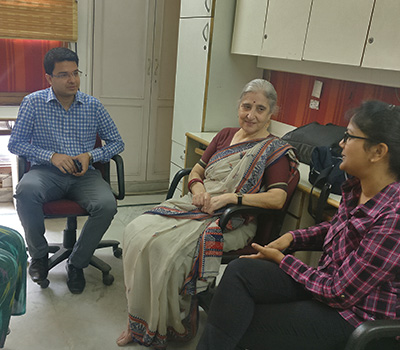
FIRST REVIEW MEETING (15th April to 19th April 2019)
The first Review Meeting was held this week on 15th April at Nirman Bhavan. It was presided over by Mr. Kunal Kumar (Joint Mission Director) and Ms. M. Janaki (Deputy Secretary, UT-I), who reviewed the fundamental inspiration for the Fellowship for the edification of the invited group mentors. Along with the fellows, the following mentors, Mrs. Renana Jhabvala, Prof. A. K Gosain, Dr. Partha Mukhopadhyay, Dr. Rajesh Tandon, Prof. KT Ravindran, Prof. RJ Masilamani and Prof. PSN Rao attended the meeting. The Fellows presented their concepts to the entire group. It served as valuable feedback to the nascent projects, as well as encouragement to all the young professionals. Energized by the interaction, the Fellows look forward to visiting cities and implementing their projects with fresh vim and vigor.
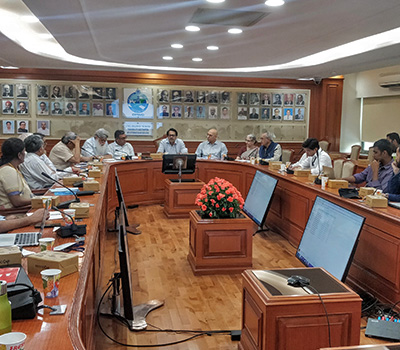
RE-CALIBRATION AND SITE VISITS (22nd April to 26th April 2019)
Following the review meeting with the Joint Secretary and mentors, all the teams took the opportunity to revisit their plans and re-calibrate according to the feedback received. Meanwhile, Team Design members visited a street redesign project in Aundh DP Road, Pune and met with Architect Mr. Prasanna Desai and Team Plan undertook a visit to Ahmedabad to visit their mentor Padma Shri Bimal Patel; understand the viability of their project on the ground and begin their project in full earnest.
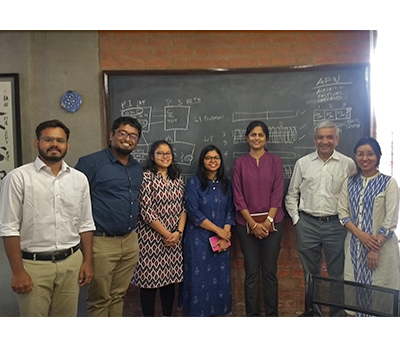
MEETING WITH MENTORS AND EXPERTS (29th April to 3rd May 2019)
Teams met their mentors and other industry experts this week as well, with many teams also contacting Smart City CEOs and Municipal Corporations for their projects. Team Asha met PMAY Urban National Director Mr. R. S. Singh to discuss their project. Team Plan attended a participatory workshop on 'Rethinking Sector 22, Chandigarh' while Team Plan continued their site visit in Ahmedabad where they visited Ahmedabad Smart City ICCC & BRTS command control center. Team Conserve attended 'Water Talk' a seminar organized by the National Water Mission. Team Zero Waste met UNDP officials Mr. Prabhjot Sodhi (Head, Circular Economy) and Mr. Srikrishna Balachandra (Program Manager, Plastic Waste Management) to discuss their work. Among others, members of various teams also met Mr. Arvind Varshney, Mr. Peeyush Gupta (Ast. Real Time Information Specialist, NMCG), and Ms. Kanika Kalra (IUT). The cohort organized themselves in groups for self-management tasks, for which a meeting was held at Nirman Bhavan this week.
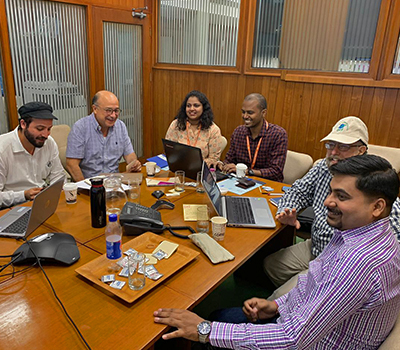
DATA COLLECTION (6th May to 10th May 2019)
Teams continued data collection and continued meeting sector experts for their projects. Team Involve underwent training in market research from Ms. Reshma Bacchwani from Societal Platform. Team Plan visited Urban India Conservatory in Nirman Bhavan to meet the ESRI Team. Teams Design, Involve and Pulse also had meetings with Mr. Kunal Kumar, Director, Smart Cities Mission; and along with the team, Fintech had an interactive session with Ms. Rushda Majeed, India representative of the Bernard van Leer Foundation. Team Mitigate continued interacting with industry experts, this week with Rocky Mountain Institute, ISGF, and TERI. Team Fintech started developing the digital model for their solution.
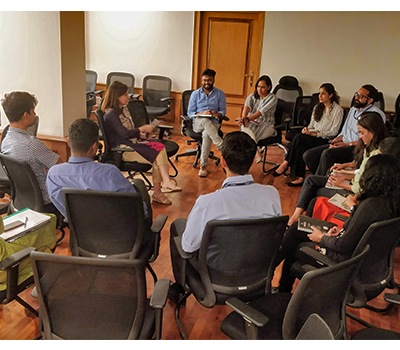
VISIT TO CITIES (13th May to 17th May 2019)
Well into the first phase of their projects' data collection, teams began visiting or planning city visits. Team Collaborate met with Invest India, Start-Up India, and AGNII for creating an open innovation framework. Teams Conserve and Design met with sector experts - CII-Triveni Water Institute and Esri, and Gurmeet Rai (Heritage Conservationist) and Sujata Hingorani (Landscape Architect). Team Conserve also attended a workshop of State Resident Commissioners on SSAP organised by National Water Mission. Team Mitigate met with an ESCO installer while Team Fintech presented their idea to the Municipal Commissioner of Chandigarh. The team also met the e-finance and 311 teams at NDMC. Team Integrate connected with Chintan NGO and conducted site visits with Khan Market waste pickers in NDMC. Team Zero Waste visited Chennai corporation to check the feasibility for piloting their project. Team Pulse connected with Societal Platform and Janaagraha. Team Involve connected with city CEOs to discuss the project and held a meeting with NDMC Chief Data Officer.
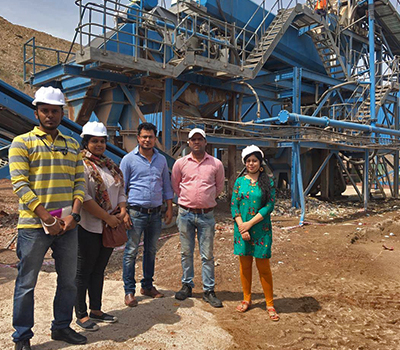
SMART CITIES INDIA EXPO 2019 (20th May to 24th May 2019)
The 5th Smart Cities India Expo 2019 was a great ground for interacting and networking with industry heads and thought leaders. The fellows also had exposure to the various facets of technology available to tackle the challenges of urban India, and how they could incorporate them into their ongoing projects at the fellowship. Additionally, various teams interacted with sector experts for their own projects including - officials from Delhi Metro Rail Corporation, New Delhi Municipal Council, Janaagraha, CII Triveni Water Institute, City Transformation Unit of Pimpri Chinchwad Smart City and Foxberry Technologies, Centre for Geomatics-CEPT, Chennai Smart Cities CEO among others.
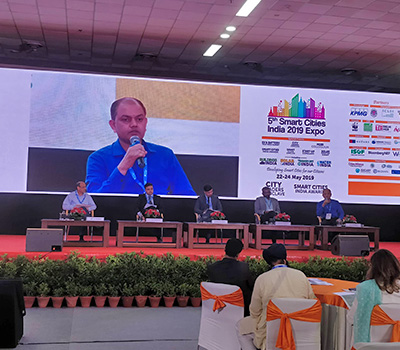
EXPLORING CITIES (27th May to 31st May 2019)
Team Conserve finalized a city to work with under the guidance of Mr. Kunal Kumar, Joint Secretary - MoHUA. Teams Involve, Collaborate and Design continued working on project parameters and began working with stakeholders while Teams Plan, Mitigate, and Integrate met industry experts from HERE Maps, Dupont Sustainability Solutions, TekMind WAIN, and Pune Lighthouse to work on their projects. Teams Pulse, Fintech and Zero Waste began their city visits to Pune, Pimpri-Chinchwad, and Chennai respectively. Fellows were able to interact with city officials from these cities, including Chennai Commissioner Mr. G. Prakash IAS, Dr. Madhusudhan Reddy IAS (Deputy Commissioner and Head of SWM, Chennai) and Chennai Smart City CEO Mr. Raj Cherubal; the Hon'ble Member of Parliament of Kalyan ' Dombivili; VC & MD of MSRDC; Advisor, MoRTH and ex-Chairman, CIDCO among other experts and officials.
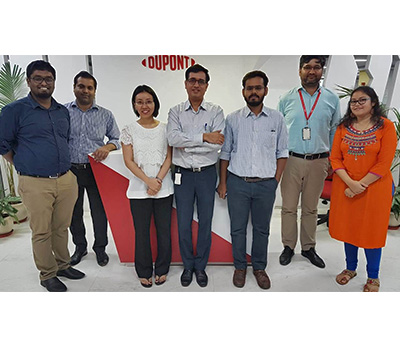
REDEFINING URBANISM (3rd June to 7th June 2019)
Team ZeroWaste began working in Chennai to develop a pilot of their project, while Teams Pulse and Fintech engaged with city officials in Pimpri-Chinchwad and Pune, where they had the opportunity to attend a full review meeting of 40 municipal departments presided over by the Commissioner of PCMC. Team Integrate embarked on a visit to Bangalore, under the guidance of Prof. Narayana of Azim Premji University they were able to meet with local sites. Team Collaborate successfully hosted a hackathon with representatives of various government bodies, while Team Involve had a second productive meeting with the CEO & CDO of New Delhi Smart City Limited. Teams Mitigate and Conserve administered a survey to all 100 Smart Cities to collect data for their projects, while Teams Asha and Design were able to meet with Vizag Smart City Manager, Mr. GV Anand Rao, and Chennai Smart City CEO Mr. Raj Cherubal. Teams Plan and Transit worked on their project parameters, with the latter digitizing maps to understand building patterns around metro stations in Delhi.
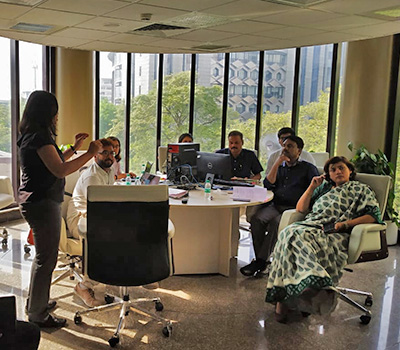
PROJECT DEVELOPMENT WEEK (10th June to 14th June 2019)
Teams continued to develop their projects, this time with inputs from various site visits and primary data inputs. Team Integrate visited Hasirudala NGO units as well as the Lighthouse Project in Pune, where they met with various program officials to discuss their project; Mitigate worked on simulations and pricing strategies for their proposed systems; Fintech worked on analyzing the data collected during their field visits to create a pilot strategy; Team Pulse began working with technical partners to develop their tool; Team Involve visited Chandigarh to deliver a preliminary presentation to the Smart City CEO; Team Transit conducted a primary survey at Lok Kalyan Marg Metro Station and Rajiv Chowk Metro Station to identify the building heights, number of employees and gender accessibility in metro influential areas. Team Asha visited various facilities to strategize plans for smart infrastructure project plans for city development; Team Collaborate worked on developing a note to ground the innovation in urban areas. All the teams geared up for their presentations in the forthcoming Fellowship Ideas Exchange.
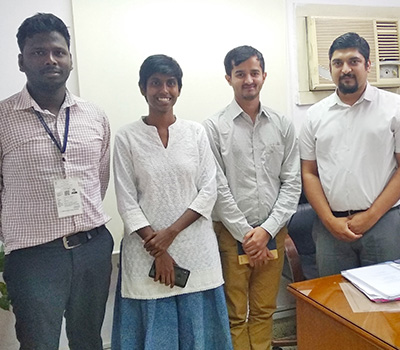
FELLOWSHIP IDEAS EXCHANGE (17th June to 21st June 2019)
The first Fellowship Ideas Exchange, a dynamic three-day program hosted by the India Smart Cities Fellows was held at Tamarind Hall, India Habitat Centre from 17th -19th June 2019. Over the course of three days, over seventeen sessions ignited discussions on leveraging innovations & the startup culture in India, sustainable mobility, housing, challenges of project implementation, the use of ICTs & fintech, data-driven governance, walkability & public spaces among many others. On the third day, the fellows were privileged to briefly pitch their projects to a distinguished audience comprising Shri Durga Shankar Mishra (Secretary, MoHUA), Shri Kunal Kumar (Joint Secretary, Smart Cities Mission), Shri Vinod Kumar Jindal (Joint Secretary, Swachh Bharat Mission), Shrimati Nandita Gupta (Joint Secretary, Labour and Employment) and Shri Rahul Kapoor (Director, SCM), Mr. V. Vijay Rama Raju (Tirupati CEO), Mr. Kamal Kishore Yadav (Chandigarh CEO), Mr. M. Harinarayan (Vishakhapatnam CEO), Mr. Rakesh Sharma (Ahmedabad CEO), Ms. Nidhi Shrivastav (NDMC CEO) and Ms. Ira Singhal (North MCD Deputy Commissioner). Project mentors and experts Mr. Jagan Shah, Ms. Karuna Gopal, Mr. Partha Mukhopadhyay, Mr. Sanjay Seth, Dr. Kaustuv K Bandyopadhyay, Ms. Shaily Gandhi, Prof. Masila Mani, Mr. R Srinivas, Dr. Poornima Dore, and Mr. Gautham Ravichander were also present and provided their valuable inputs during the panel discussion.
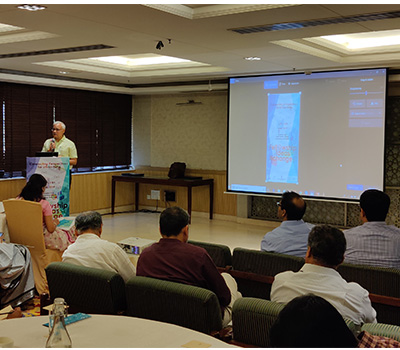
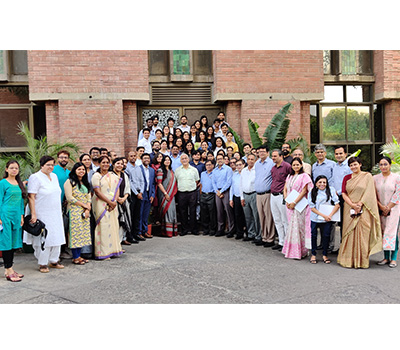
ENVISIONING PROJECT OUTCOMES (24th June to 28th June 2019)
This week saw all teams envision final project outcomes. Team Collaborate worked on a concept note for 100 Innovation Zones. Most teams continued meeting sector experts and their mentors to finalize parameters of their project. Team Asha was advised by Dr. Debolina Kundu (NIUA) and Ms. Mukta Naik of Centre for Policy Research; while teams Transit & Involve met their mentors as well as a team from University of Glasgow to discuss next steps post the Fellowship Ideas Exchange. Teams Conserve, Plan, Fintech and Mitigate worked with organizations ESRI, Social Alpha, and Yes Bank respectively with whom to collaborate on their projects. Teams Pulse and Integrate contacted city officials where they plan to execute a pilot of their projects.
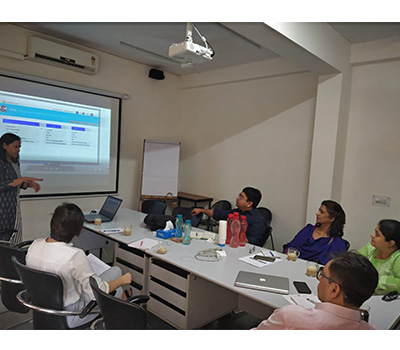
PILOT CITIES (1st July to 5th July 2019)
This week saw teams move towards visualizing the contexts of their projects. Mission Director Mr. Kunal Kumar hosted a video conference for the CEOs of 12 Smart Cities to discuss how these projects could be facilitated in their respective cities. Among the attendees were Mr. Anand Rao, Smart City Manager (Visakhapatnam), Mr. Ravinder Sharma (New Delhi SCL), Mr. Alok Ranjan (CEO Jaipur) & Mr. Amitabh Sharma (Jaipur), Mr. Swaraj Swain ( General Manager, Admin - Bhubhaneswar), Mr. Sameer Unhale (CEO, Thane SCL), Mr. KK Yadav (CEO, Chandigarh SCL), Dr. Ramnath Sonawane (CEO Nagpur NSSCDCL), Mr. Yatinder Naik (GM Tech. Dept. - Ahmedabad), Mr. Neelkanth Poman (PCMC Joint CEO) & Mr. Sebastian Mony (Project Manager, CTO), Mr. SD Sharma (Director, Planning, DMRC) and Mr. Raj Cherubal (CEO, Chennai SCL). The meeting set up specific outcomes and goals the City CEOs were expecting from the teams and paved the way for teams to take their solutions on the road. Teams Involve and Conserve worked on meeting relevant officials in Chandigarh and Jaipur respectively. Team Collaborate continued to work on the 100 Innovation Zones Program Concept Note, while Team Transit met with Mr. Rajesh Kumar Sharma (Director, Delhi Master Plan) to seek data on built-up spaces in Delhi. Teams Mitigate, Design, Asha, Integrate and Fintech worked on their pilot projects in coordination with their proposed cities, with inputs from agencies such as NIUA, ISGF, SEWA, DigiThane among others.
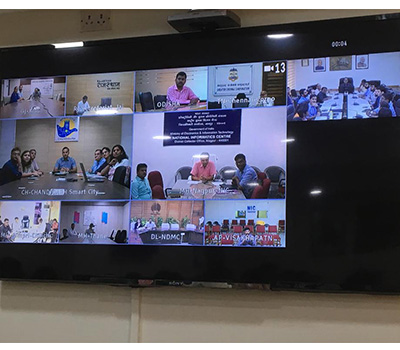
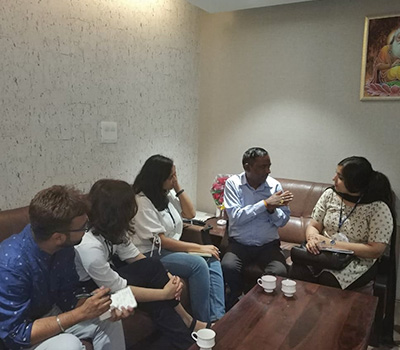
CITY FOCUS (8th July to 12th July 2019)
Team Collaborate prepared a concept note for the 100 Innovation Zones. Team Transit met with various officials at the Delhi Development Office to collect data for their project. Team Plan created and piloted their data collection tools with the help of the rest of the cohort. Team Involve articulated the findings from their Chandigarh City visit and presented the same to their Mentors & Ministry officials. Using the context of 'vulnerable points' for garbage disposal in Pune, Team Pulse tested their project in the city. Team Conserve met Mr. Vinay Bhardwaj, Sn. Hydrogeologist from Groundwater Department, Y.K. Jain, Addl Director from DOIT, Mr. Solanki from PHED, Mr. Amitab Sharma from JSCL, Mr. Ranveer from Statistics Department, Mr. Keshav Shrivastav from JNN for discussions on their project. Team Design visited Bhubaneswar to collect information for their proposed tool and presented their proposal to BSCL CEO Mr. Prem Choudhary. Team Mitigate engaged in stakeholder discussions with NSSCDCL, MAHA, MSECDL, UMTC, GT, DIMTS, and NMC in Nagpur. Team Integrate conducted site visits to the SEWA office in Rajiv Nagar. Team Zerowaste met with officials in Thane and Kalyan-Dombivili about waste management in their cities.
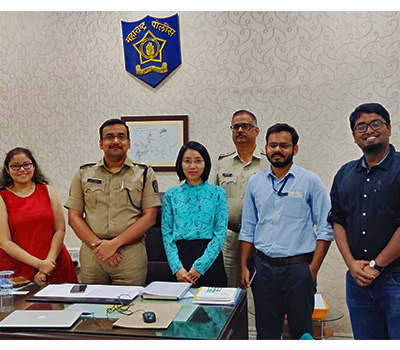
PRELIMINARY PILOT CONCEPTUALISATION (15th July to 19th July 2019)
Team Collaborate prepared and submitted a cost-benefit scenario analysis, outcomes of the 100 Innovation Zones. Team Transit worked with DMRC on data collection for the gender offshoot of their project. Team Plan visited Pune Smart City where they had several stakeholder meetings including Mr. Rajendra Jagtap, CEO Pune Smart City, Mr. Vikram Kumar Metropolitan Commissioner, Mr. Rahul Jagtap and his team from Pune Municipal Corporation among others.'Team Involve met Ms. Reema Jain (Deputy Director, Jal Shakti Abhiyan) to gather inputs for their next city visit. Team Conserve met officials from Jaipur Development Authority (JDA) and discussed the availability of land use maps and master plans for their project. Team Fintech worked on navigating a roadmap for a future good credit program in Thane. Having conducted site assessment studies in Nagpur, Team Mitigate started preparing DPR for their pilot project in Nagpur. Team Integrate conducted meetings and hosted an ideas exchange for stakeholders in Pune. Team Zerowaste met Dr. Ramnath Sonawane (CEO, Nagpur Smart City), Mr. Devandra Mahajan (General Manager, Environment Dept.), among other officials in Nagpur to discuss their project.'
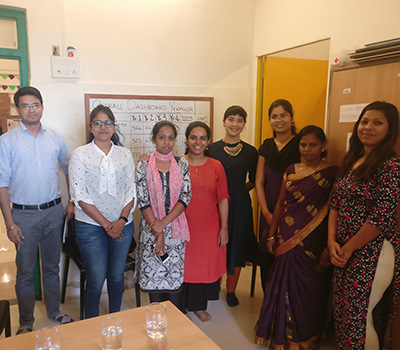
CITY VISITS & STAKEHOLDER ENGAGEMENT (22nd July to 26th July 2019)
Teams worked on analyzing data from their preliminary visits to cities and focused on refining their strategies. Team Asha began their Vizag Pilot phase with a meeting with the Commissioner and CEO, Dr. G Srijana IAS, Greater Vishakapatnam Municipal Corporation to explain their project concept. Meanwhile, Team Plan met Mr. Rajendra Jagtap, CEO Pune Smart City and his team for the formal process of piloting the tool in Pune. Team Conserve met Mr. Shivprakash Yaragal (ESRI) to discuss the team's proposed water balance tool. Team Fintech is operating out of Thane Smart City, and are in the process of creating several citizens and intra-municipality surveys to assess and map citizens' aspirations. Team Design received inputs from Smart Cities Director Mr. Kunal Kumar to integrate their tool with existing digital modules, which will aid them in scaling up their project. Team Mitigate presented their ideas at the 'Mobilise Your Cities' workshop organized by Urban Mass Transit Company Ltd. in Nagpur. Team Zerowaste was able to secure a location in Civil Lines, Nagpur with the guidance of Dr. Ramnath Sonawane, CEO, Nagpur Smart City to pursue a demo of their project.
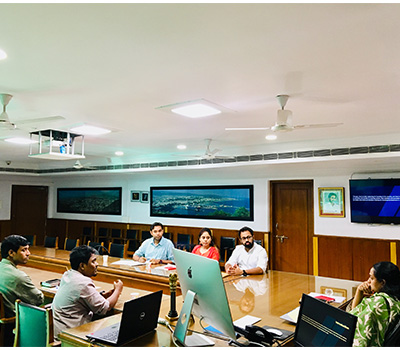
REFINING THE STRATEGY (29th July to 2nd August 2019)
Team Collaborate identified 20 smart cities for Innovation. While Team ASHA met Mr. Suresh Kumar, Chief Urban Planner, Visakhapatnam Metropolitan Region Development Authority (VMRDA ), and Dr. Srinivas Rajmani, UNDP Project Officer at GVMC to discuss environment and disaster management component to be integrated with the portal. Team Involve presented the pilot strategy for Chandigarh to the CEO in the presence of CSCL officials Mr. NP Sharma GM (Technical) & Team Leader, PMC Mr. Arun Kumar Singh, and relevant citizen stakeholders. Team Transit studied the DMRC App and the DMRC Delhi Phase 1,2,3 DPRs to identify relevant plug-ins. Team Conserve discussed the data collected and way forward with mentor A.K. Gosain. Team Design started working to integrate the tool with Bhubaneswar One platform. Team Integrate visited NDMC's ICCC to understand ongoing usage of asset location devices. Finally, Team Zero Waste proposed a waste management plan to achieve zero waste in Nagpur Smart City.
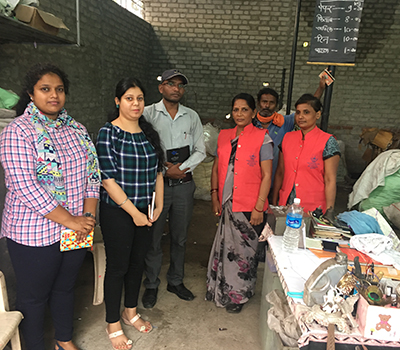
PROJECTS PROCEEDINGS (5th August to 9th August 2019)
Team Mitigate presented their proposal to MAHA Metro for installing charging infrastructure for their e-rickshaws for last-mile connectivity at Nagpur. Zero Waste team also had a meeting with Nagpur Municipal Corporation for the implementation of the waste management plan. Team Design attended the CITIIS Challenge initiation workshop organized in collaboration with Smart City, MoUHA, AFD, European Union, Republic of France and NIUA. Team Fintech analyzed the Digi Thane survey comprising more than 1.5 lakh responses. Team Integrate had a discussion with Preetham from Bono Ride for the development of the digital interface. Team Plan met with Mr. Shrikant Bhalarao, owner Cipherhut software for collaboration and are participating in Citopia, MOBI Grand Challenge Phase II. Finally, Team Collaborate worked on identifying behavioral nudges to be used as triggers by the innovation office.
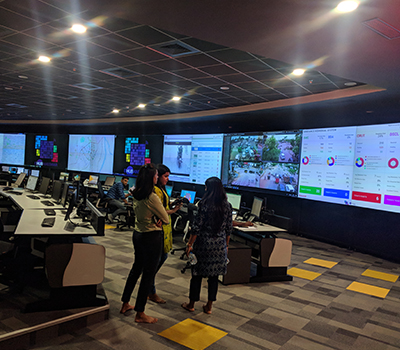
CROSS-LEARNING & PROJECT INSIGHTS (12th August to 16th August 2019)
Team Design worked on streamlining and detailing out the indicators for different typologies to be used for building their projected tool. Zero Waste team shortlisted two zones in Nagpur for piloting their project. Team Fintech is working with the app development team of DigiThane to incorporate the necessary mix of incentives for the respective municipal service. Team Integrate had a meeting with officials from World Bank, Additional Commissioner Ms. Rubal Agarwal and the Smart City Team at Pune. Team Mitigate visited ARAI facility in Pune to understand the testing mechanism of new EVSE. Team Pulse is working closely with Municipal Officials and IT team to develop the web interface. Team Conserve is working on water balance algorithm for Jaipur Municipal Corporation. Team Transit interacted with Mr. N.V.S Reddy, IRAS, Managing Director, Hyderabad Metro Rail Limited and Mr. Vishnu Vardan Reddy, Superintendent Engineer, HMRL and learned about Hyderabad Metro Rail Project in detail. Team Asha attended Psychosocial Awareness Program organised by USAID, UNDP, and GVMC regarding disaster management in the housing sector.
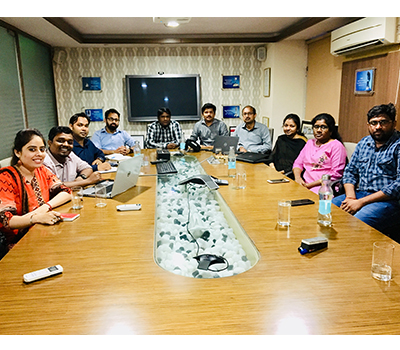
PROCESS STREAMLINING (19th August to 23rd August 2019)
Team Integrate met Mr. Sakhar Sankul (Encroachment Department) at PMC, regarding their work in linking farmers to mandis through Farmer Producer Organization. Team Fintech created a possible matrix of evaluation of the performance for the merchant vendors and began collaborating with HDFC Bank to create customized QR codes for the customers making utility bill payments. Team Transit met the Chief Operating Officer of L&T MRL at Hyderabad and discussed employment indicators, T-Savari mobile app and its impact on Hyderabad Metro Rail ridership. Team Involve met Smart Cities Mission Director, Mr. Kunal Kumar to finalise their project pilot as well as the components of their advisory toolkit.
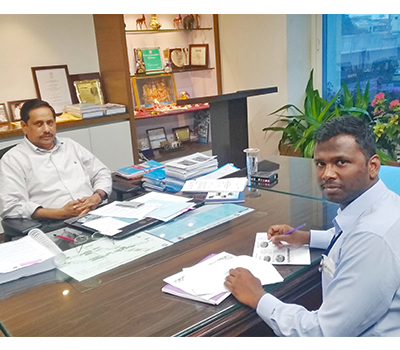
DATA COLLECTION & TIMELINES (26th August to 30th August 2019)
Team Transit developed an updated questionnaire for gendered accessibility to metro services based on the results and data acquired from the pilot. Team Fintech had a review call with DigiThane and the ADMC to delineate the roll-out plan of the intended incentive plans. Team Integrate met with Mr. Srinivasa Bharat Padavala and Mr. Manish Deshmukh from the PWC IT department, to discuss the app they propose to design and consulted Thane Municipal Corporation regarding the e-Rickshaw informal sector project. Team Involve commenced their pilot implementation visit to Chandigarh, where the CEO of Chandigarh Smart City Limited, Mr. Kamal Kishore Yadav organised a meeting of various municipal corporation and smart city officials to co-ordinate the team's efforts.
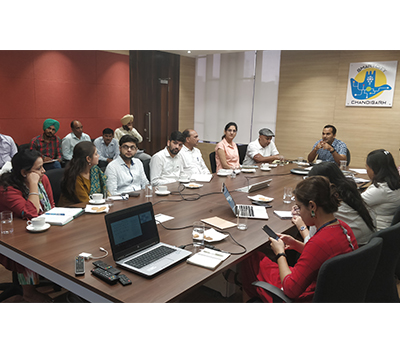
PRE-PILOT TESTING (2nd Sept to 6th Sept 2019)
Teams have spanned the length and breadth of the country to develop their projects, and many are close to implementation! Team Collaborate moved to Panaji, where they met with the Chief Secretary & Principal Secretary of Goa to discuss their solutions for Goa. Team Plan expedited their partnership with Cipherhut with Mission Director Mr. Rahul Kapoor's approval while team Involve launched their first strategy to solicit citizen inputs at the city level in Chandigarh. Team Pulse began their pre-pilot solutions testing, while team Transit coordinated with Geospatial Delhi Limited for inputs in their project. Team Mitigate presented their proposal to MAHA Metro for installing charging infrastructure for their e-rickshaws for last-mile connectivity in Nagpur. In Pune, team Integrate presented their findings to Smart City Advisor Mr. Ashish Agarwal while exploring avenues of sustainable project development.
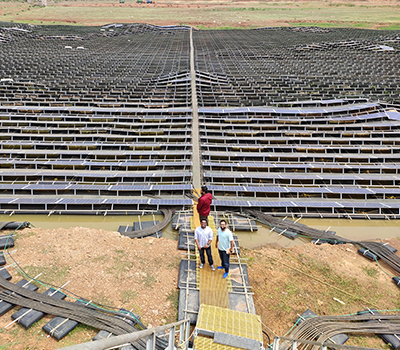
DEFINING USE CASES (9th Sept to 13th Sept 2019)
Teams began refining use cases for their projects and proposed solutions for their target cities. Teams Plan and Involve continued their pilot projects in Pune and Chandigarh respectively. Team Transit completed the procurement of the datasets required for their projects from GSDL, while team Pulse worked on defining use cases for the tool and outlining how data collected can be used in the pilot stage in Pimpri Chinchwad. Team Conserve met with Mr. Arun Sharma (PwC) to further their understanding of groundwater and surface water terminologies and calculations. As part of their pilot, Team Fintech deployed the Thane wallet and loyalty program. Team Design continued to refine their tool in preparation for their impending visit to Bhubaneswar. Team Integrate got in touch with TATA India, Social Alpha, and Urban Livelihood Mission, and Azim Premji Incubation Fund, and spoke with Radioactive about the potential to scale up their project. Team Collaborate consulted with 91Springboard, a co-working space in Goa for inputs on convening with StartUp businesses and Venture Capital to see how the Innovation Office can leverage the investment climate in Goa. Team Asha had detailed discussions with Mr. Gaurav Wahi, Chief Operations Manager, ANAROCKS for their suggestions.
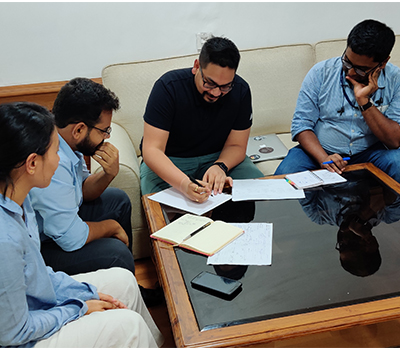
DETAILED PROJECT REPORTS PREPARATION & DEMOS (16th Sept to 20th Sept 2019)
Continuing to use the platform provided by the Fellowship, teams continued to find avenues of learning and collaboration at various events. Team Collaborate got a chance to pitch the project to the Start-up Asia Berlin delegation visiting Delhi. Team Plan's main stakeholder Mr. Pankaj Deshmukh (DCP)Pune City Traffic agreed on the timeline for their project. Team Involve ran a demo of their quadruple helix stakeholder group collaborative ideation exercise at the Municipal Corporation, incorporating various themes from the team's city-level advisory. Team Transit commenced a study tour in Kochi, while team Pulse attended the Indo-Euro Conference. Team Conserve is currently working on the calculations of the water balance model and also attended 7th Water Talk Series organized by NWM where the talk was delivered by Shri Sonam Wangchuck, Founder of the Himalayan Institute of Alternatives. Team Fintech continued preparations for their pilot, with plans to roll out the loyalty module, incorporate the nudges for the proposed discounts on municipal payments and ready the incentive ecosystem for engagement before the festive season. In Bhubaneswar, Team Design met key officers and consultants for the digital platform being developed through their project. In Nagpur, team Mitigate was able to submit the first draft of their detailed project report and began working on the Request for Proposal.
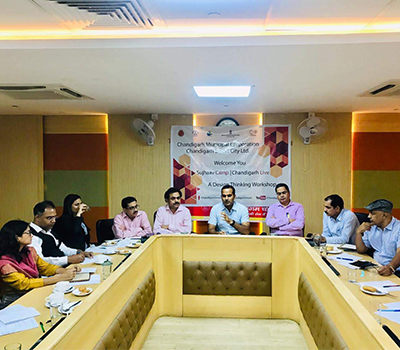
PROJECT OPERATIONALISATION (23rd Sept to 27th Sept 2019)
In an exciting phase, various teams were able to implement some of their ideas in the various cities they have selected. Team Collaborate met with Mr. Durga Prasad, Project Co-ordinator of Goa Science Museum where they have established an Innovation Hub to help students from ideation to the prototyping phase of a project. Team Involve ran a demo of one of the projects of the Chandigarh Smart City Limited demonstrating the usage of the proposed project, and incorporating user feedback to recalibrate said project for greater efficacy. Team Conserve Connected with the DoIT, Jaipur for the GIS shapefiles required for starting the work of the model; while Team Design presented a demo version of their application to the officials of Bhubaneswar Smart City Limited. Team Fintech attended a program on SDGs as the Thane Smart City Limited is eager to align their development goals with all SDGs. Team Integrate received official go-ahead in a meeting with Pune Smart City officials, where they were also introduced to the "Smart World & Communication" division of L&T Construction.
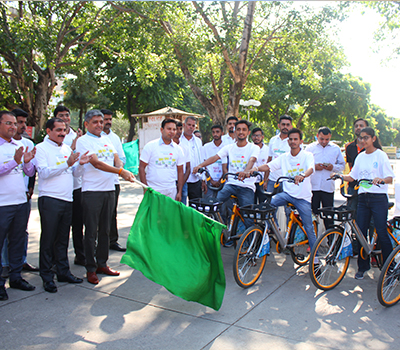
Designing Tool-Kit (30th Sept to 4th Oct 2019)
Team ASHA and Team Plan worked on developing their final tool while Team Collaborate started the ground interviews with local stakeholders to understand the local ecosystem. Team Involve continued its pilot in Chandigarh on various public engagement events. Team Fintech floated a quiz survey for the disbursement of tickets for a festival celebration. The free tickets were used to link awareness about plastic amongst citizens in Thane. Team Zero Waste in Chennai started receiving bids at their online platform while Team Transit co-ordinated with DMRC for their project Accessibility Benchmarking for Metro Systems in India along with. Team Pulse secured funds for their project from various sources in Pune City. Team Conserve interacted with Mr. Chandrashekhar, CISCO at India Urban Observatory for discussing the extrapolation and forecasting part of the model. Team Integrate designed the app with the "Smart World & Communication" team in Pune. Team Mitigate met with structural and electrical consultants to discuss the project and design the system.
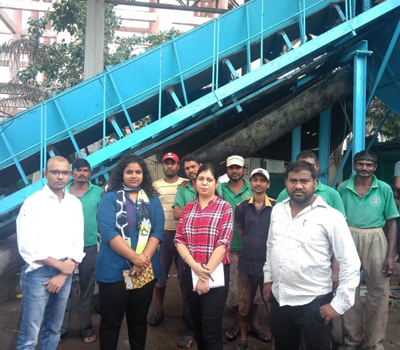
PRODUCT REFINING (7th Oct to 11th Oct 2019)
Team Design with MSI started developing their application. Team Conserve interacted with Mr. Padam Vijay at India Urban Observatory to develop their project dashboard. Team Pulse visited the pilot site in Pimpri Chinchwad to interact with the citizens and collaborated with the U-Code team to develop an action plan for Pilot in Pimpri Chinchwad. Team Zero Waste in Chennai started developing the Mobile App and a detailed project report in Nagpur. Team Fintech executed mini pilots to understand the impact of time and date on the engagement and behavioral nudge in Thane.Team Plan worked on developing its tool with the assistance of technical experts.
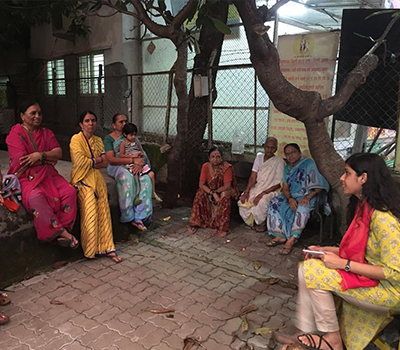
PRODUCT DEVELOPMENT (14th Oct to 18th Oct 2019)
Team Collaborate visited the Vibrant Goa Summit to understand Goa's outlook towards future investment. Team Involve organized an exhibition on Jal Sanrakshan Hackathon, attended by the Commissioner and other key officials. Team Pulse conducted two formal focus group discussions with the citizens and co-ordinated with third-party vendors for modification of a truck into a co-creation vehicle for the pilot. Team Design made a visit to Bhubaneswar for the development of the Application by MSI in BSCL. Team Mitigate revised the DPR based on the interaction with consultants and stakeholders. Team Fintech did a mini-pilot to understand the impact of time and date on the engagement and behavioral nudge.
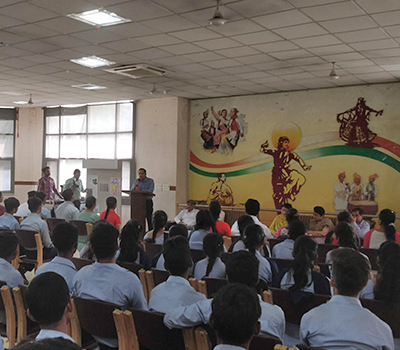
PILOT TESTING (21st Oct to 25th Oct 2019)
Team Mitigate framed the BOQ of the project with a cost estimate of 3.5cr. Team Design coordinated with various city officials to get an updated GIS layers base map for the development of the application. Team Conserve met Mr. Padam Vijay and Mr. Manish from IUO to get their insights on the project. Team Transit finalized the methodology for data analysis. Teams Involve, Fintech, Pulse and Integrate started collating field pilots to create scalable modules. Team Plan floated a survey in Pune for a better understanding of the traffic problems faced by citizens. Team ASHA visited Visakhapatnam for project implementation reinforcement and monitoring.
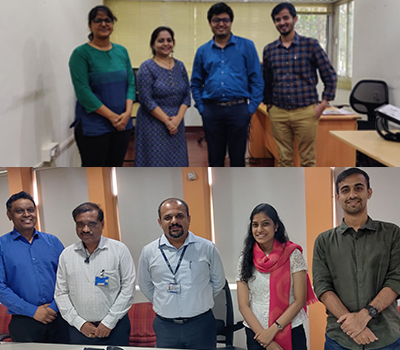
DIWALI (28th Oct to 1st Nov 2019)
Team Plan worked on their product formula and analyzed the survey results for better understanding to decide the weightages relevant for their product. Team Involve continued working with data collected in field pilots to create scalable modules and insights for the Citizen Engagement Advisory Toolkit. Team Fintech met Mr. Kunal Kumar Sir regarding the progress of the project and discuss the future trajectory. Team Transit finalized the methodology for the analysis of the collected data for their project. Team Conserve finalized the modules of the dashboard through various references and existing water database platforms. Team Integrate consulted and reviewed the preparation of SRS with the product developer. The India Smart Cities Fellowship wishes everyone a happy and prosperous Diwali and New Year.
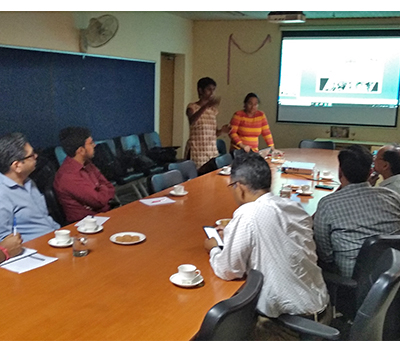
PROJECT DOCUMENTATION AND REVIEW PREPARATION (4th Nov to 8th Nov 2019)
Team Collaborate continued meeting with key resource persons, including Mr. Jack Sukhija (Tourism and Travel Association Goa), and the faculty of BITS, Goa. Team ASHA co-ordinated with the IT team in Vizag to discuss regarding roadblocks in prototype development. Team Plan met Mr. Kunal Kumar and Mr. Rahul Kapoor for discussing the tool and the way forward for the same. Team Transit analysed the number of jobs around the metro stations Rajiv Chowk, Lok Kalyan Nath and Kalkaji. Team Pulse prepared for the pilot with the U_Code Team which is scheduled to visit on Dec 1. Team Conserve along with the ESRI team in IUO started working on the dashboard of their project. Team Integrate worked on refining of specifics functionalities of the app. Simultaneously, all the teams began preparing for the review meeting scheduled to occur in the next week in Delhi.
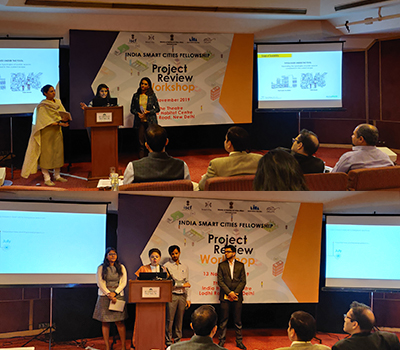
3rd REVIEW MEETING (11th Nov to 15th Nov 2019)
The teams all gathered in New Delhi for the third review meeting held at the Theatre, Stein Auditorium, India Habitat Centre. Each team provided a detailed update on the progress of their project and reflected on the evolution of its concept since the inception of the ideas in February 2019. The day-long affair was presided over by Mr. Kunal Kumar (Mission Director) and Mr. Rahul Kapoor (Director) of the Smart Cities Mission, Mr. Hitesh Vaidya (Director, NIUA) and several other key officials from Pimpri Chinchwad Smart City Ltd., Chandigarh Smart City Ltd., Thane Smart City Ltd., among others. The week also saw a training session delivered by Mr. Kapoor to the fellows which outlined the deliverables expected from the fellows for the remainder of their tenure.
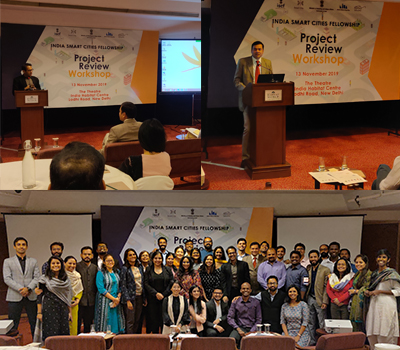
PROJECT TESTING (18th Nov to 22nd Nov 2019)
Post the review meeting, the teams met with the Managing Director and Director, Smart Cities for in-depth feedback on their projects before dispersing to their respective pilot cities. Team Collaborate interacted with Deepak Desai (Director, Department of Skill Development and entrepreneurship) and researched the rejuvenation of water bodies and pedestrianization. Team Mitigate took inputs on their DPR from various stakeholders, and Team Plan met Mr. Kunal Kumar for a visit to Kohima Smart City Development Limited and Pune Smart City for the piloting project. Team Plan's app "ENABLE" and Team Integrate's app "My Thela" will be launched on December 13th at the Pune Urban Data Exchange (PUDX) Datathon. Team transit did a literature study on land use arrangement systems around transit systems. Team Design met Mr. Rahul Kapoor to finalize on the expert assessment framework for public spaces. Team Conserve visited Delawas STP at Jaipur for collecting water quality data and met Mr. S.K. Jain for discussing the project and collecting of groundwater quality data.
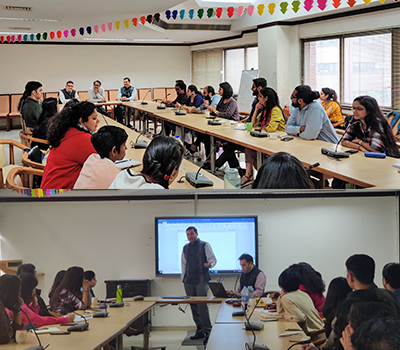
FEEDBACK AND COURSE CORRECTION (25th Nov to 29th Nov 2019)
Team Asha attended the workshop on Multi-Hazard risk and Vulnerability Assessment (M-HRVA) of Visakhapatnam city at Vizag. Team Plan visited Kohima Smart City Development Limited (KSCDL) and had a meeting with various stakeholders on piloting their project and receive feedback from Deputy Commissioner for Transport, ICCC Technical Team, Transport Planner, Joint CEO, KSCDL CEO Mr. Koye Meyase and Mr. Manom Wallim, Deputy Superintendent of Police (DSP) of Kohima. Team Mitigate handed over the final product to the NSSCDCL team. The Team Collaborate met with local innovator Captain Michael Lobo for water rejuvenation while Team Fintech went to Thane to launch the incentive-based micro-pilots. Team Design met the BUKC team to plan and organize placemaking activities. Team Integrate worked on developing a marketing plan for My Thela app, and Team Involve continued piloting citizen engagement strategies in Chandigarh.
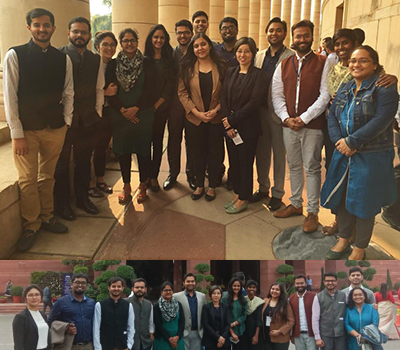
BRIDGING-THE-GAPS (2nd Dec to 6th Dec 2019)
Team Involve executed the last phase of their pilot on capacity building of Day-NULM and feedback on the e-Gov app at Chandigarh. Team Plan went to Pune and had an interview with Ms. Smriti from National Geographic and also conducted a city-wide behavioral-based survey on Traffic. Team Conserve had a discussion with Mr. Padam Vijay, MoHUA and Mr. Shivaprakash, ESRI on the idea of the tool and integrating GIS data with the statistical model and mathematical algorithms. Team Collaborate discussed their project with the Ambassador of Norway to India. Team Integrate worked on refining their app before the launch.
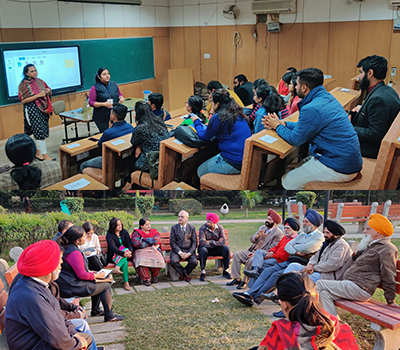
PRODUCT LAUNCH-PUNE (9th Dec to 13th Dec 2019)
ENABLE and My Thela app by Team Plan and Team Integrate respectively were officially launched on 13th December 2019 at the Pune Urban Data Exchange (PUDX) Datathon by Mr. Kunal Kumar, JS and Director, MoHUA in presence of the Ms. Rubal Agrawal, Commissioner PMC and CEO Pune Smart City and Mr. Rahul Kapoor, Mission Director, MoHUA. Team Collaborate interacted with stakeholders for developing strategy for academia, department of IT and Industries. Team Involve did a day capacity building workshop with Day-NULM on ways to approach the urban local body with their complaints - grievances and suggestions.
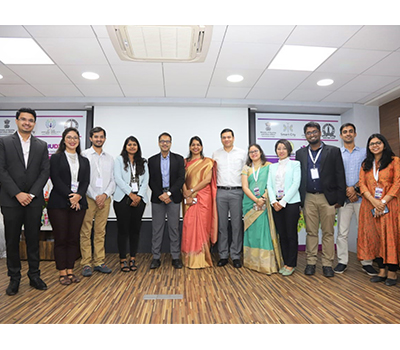
PRODUCT LAUNCH-CHENNAI (16th Dec to 20th Dec 2019)
Team Zero Waste launched the Madras Waste Exchange Platform in Chennai to be used by the Greater Chennai Corporation and the citizens. Team Plan Team surveyed four hot stop junctions to validate the tool and data. They met Mr. Sriniwas, Transport Planner from PMC about the data requirements. Team Conserve met Mr. Kunal Kumar to seek inputs on their project tools and output. Team Collaborate developed a capacity-building strategy with concerned departments. Team Integrate documented a report on the app's development and refinement measure to be submitted to the PMC team.
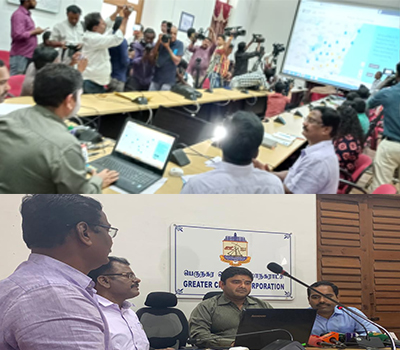
MERRY CHRISTMAS (23rd Dec to 27th Dec 2019)
At the end of the first year, all the teams worked on finishing their pilot projects and began drafting project reports. Team Collaborate conducted two joint meetings to set the agenda for each stakeholder on different strategies to be implemented in Goa and handing over the project to the local stakeholders before moving out of Goa. Team Plan met Mr. Padam Vijay to discuss the project implementation and tool development for Kohima Smart City. Among these tasks, all the teams started wrapping up their city pilots and moved back to Delhi for further processes. On behalf of the India Smart Cities Fellows (2019 cohort), we take this opportunity to wish you all a Merry Christmas.
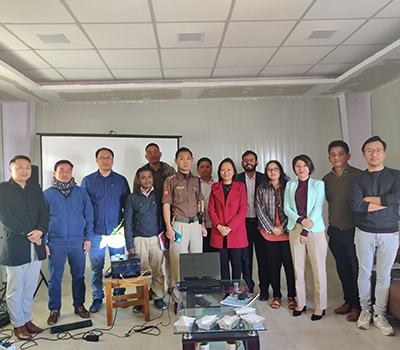
PROJECT DOCUMENTATION (30th December 2019 - 3rd January 2020)
All teams were instructed to work on project documentation to prepare for the completion of their projects. Assigned documentation methods were approved, and teams were allowed to prepare their project handovers in any way they saw fit. The India Smart Cities Fellows (2019 Cohort) take this opportunity to wish one and all a happy and prosperous New Year.
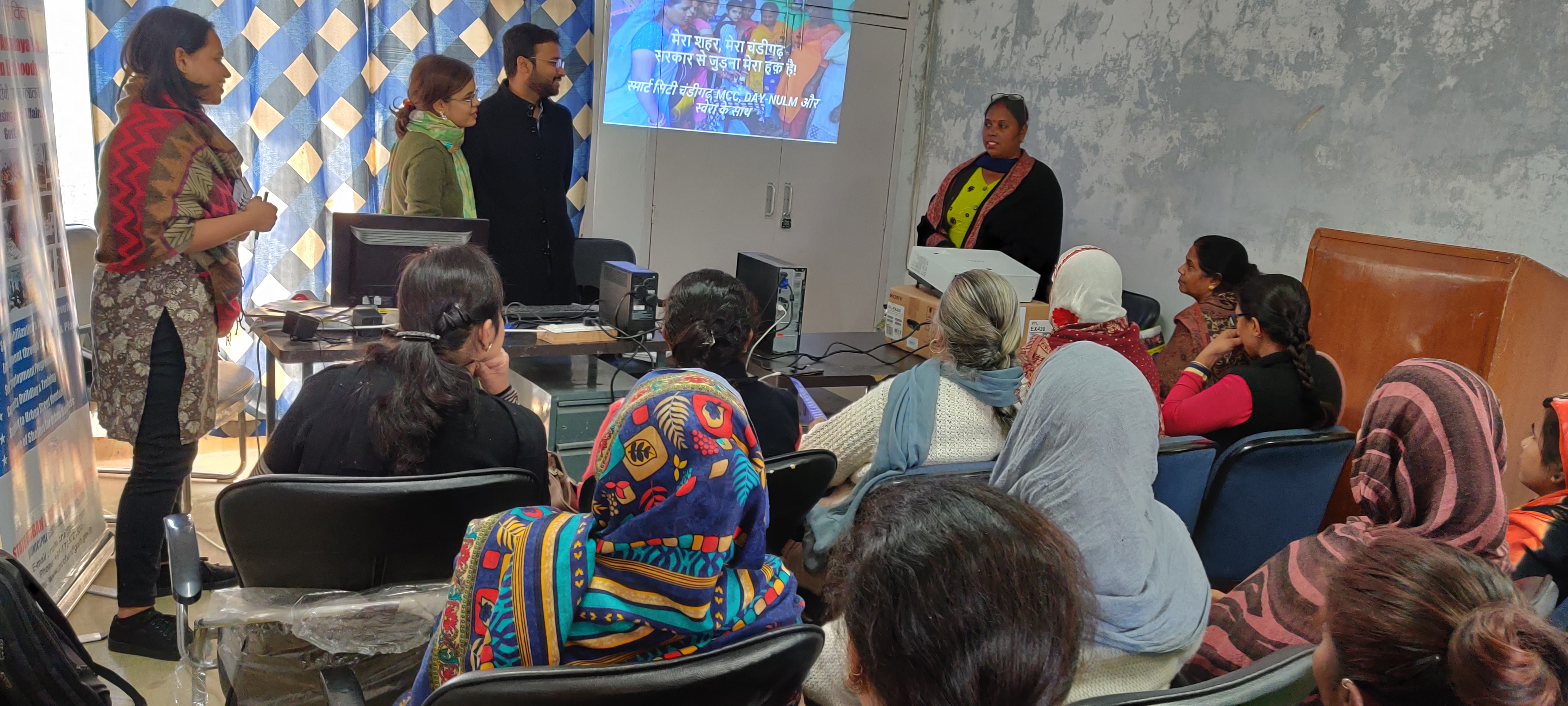
PROJECT HANDOVER (6th January 2020 - 10th January 2020)
The Fellows continued working on documenting their projects in readiness to hand over to the next Cohort (2020). Simultaneously, some projects which are still in progress were worked upon. The Fellows still in their pilot cities were invited to come back to the Centre in time for the Cohort Meeting.
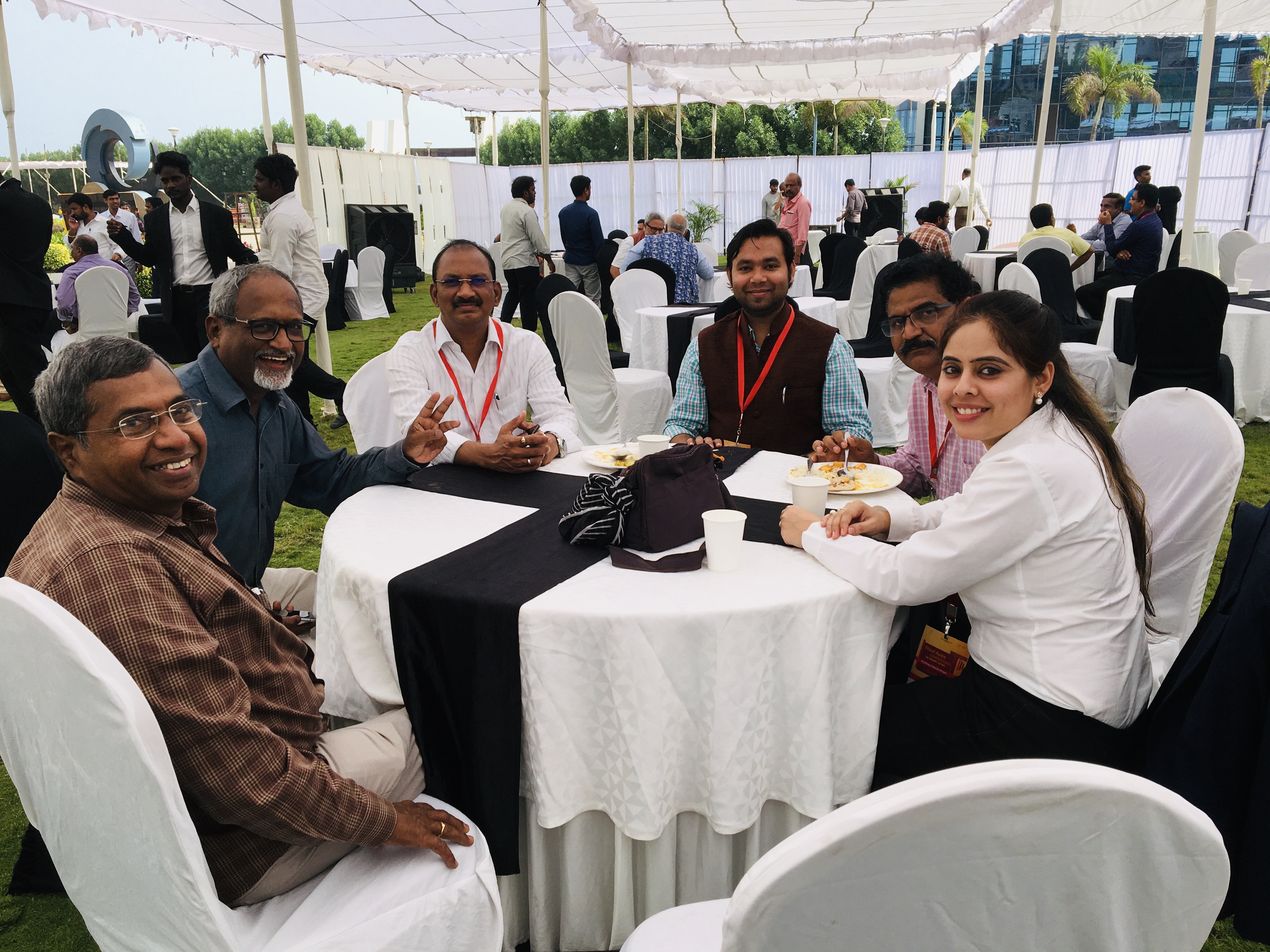
COHORT MEETING (13th January 2020 - 17th January 2020)
The Fellows were invited to be part of a meeting to conclude the first year of the 2019 India Smart Cities Fellowship Programme. Held at the Ministry of Housing and Urban Affairs, was presided over Mr. Kunal Kumar (Mission Director) and Mr. Rahul Kapoor (Director) of the Smart Cities Mission, Mr. Hitesh Vaidya (Director, NIUA) - the meeting focused on encapsulating the learnings from the year-long Fellowship experience. The Fellows recounted some of the highlights of the journey and ended the meeting with a heartfelt thanks to the Mission Director and Director for making the Fellowship a learning journey.
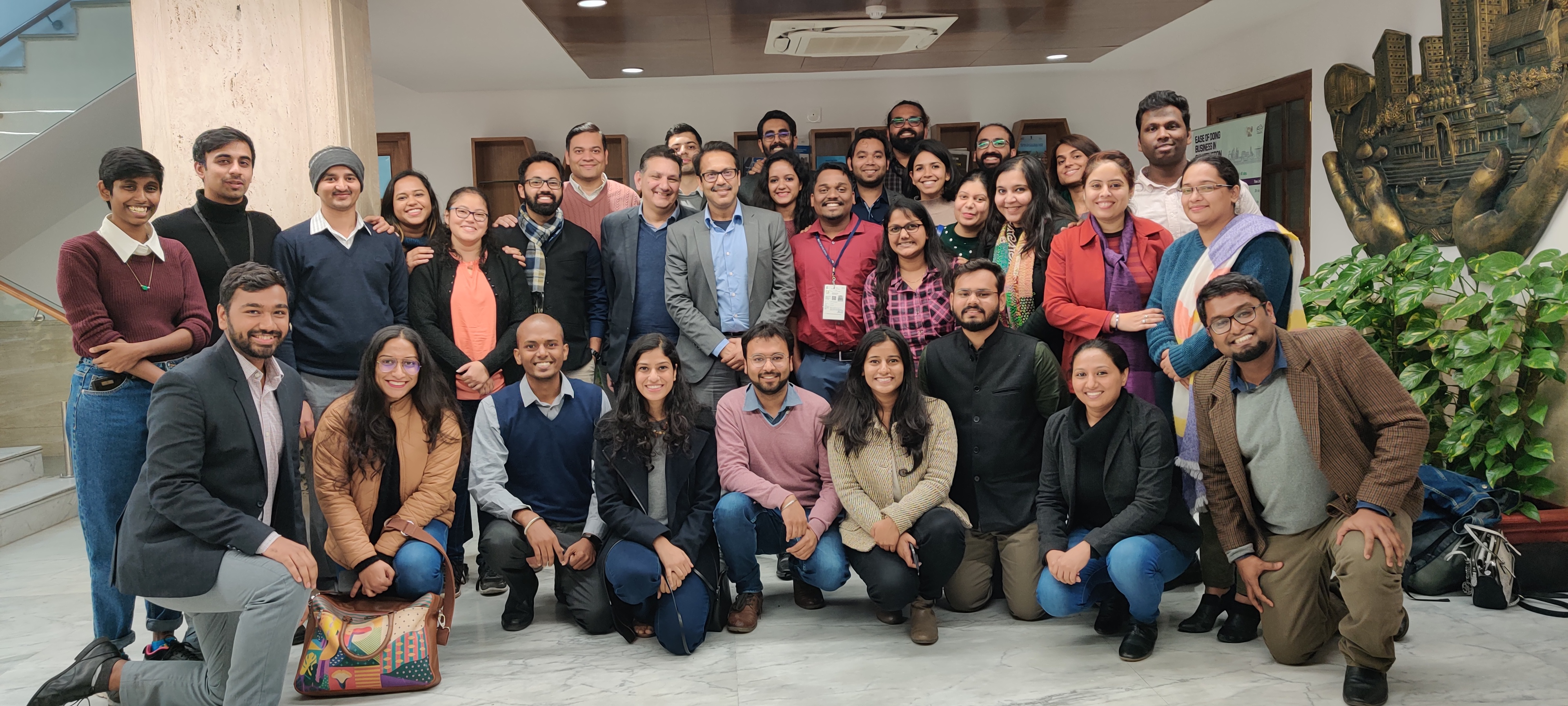
3rd APEX CONFERENCE (20th January 2020 - 24th January 2020)
Fellows attended the 3rd annual Apex Conference of Smart Cities CEOs from all Smart Cities to showcase their achievements on 24-25 January 2020 at AU Convention Centre, Vizag. The Principal Secretaries (UD)/State Mission Directors, Municipal Commissioners, Chief Data Officers of Smart Cities and other representatives from the urban sector graced the occasion. The Fellows would also like to extend their felicitations on the occasion of the 71st Republic Day of India.
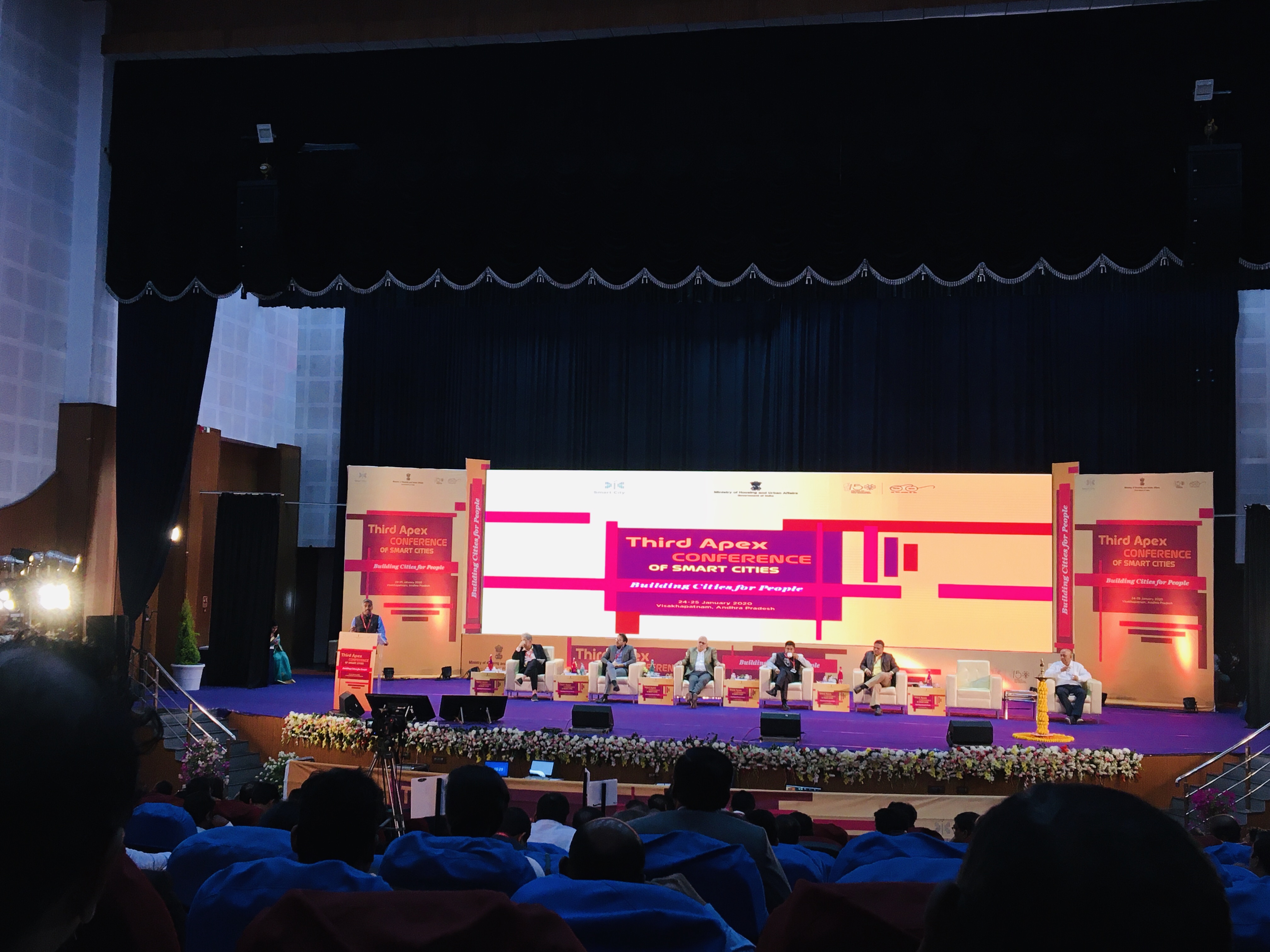
NEW ASSIGNMENTS (27th January 2020 - 31st January 2020)
Work commenced on the Ease of Living Index, Municipal Performance Index, Data-Smart Cities, Climate-Smart Cities, Mission Innovation, Mission Capacity Building and the National Urban Innovation Stack - with the remaining Fellows of the 2019 Cohort staffed on these teams across the Ministry of Housing and Urban Affairs and the National Institute of Urban Affairs.
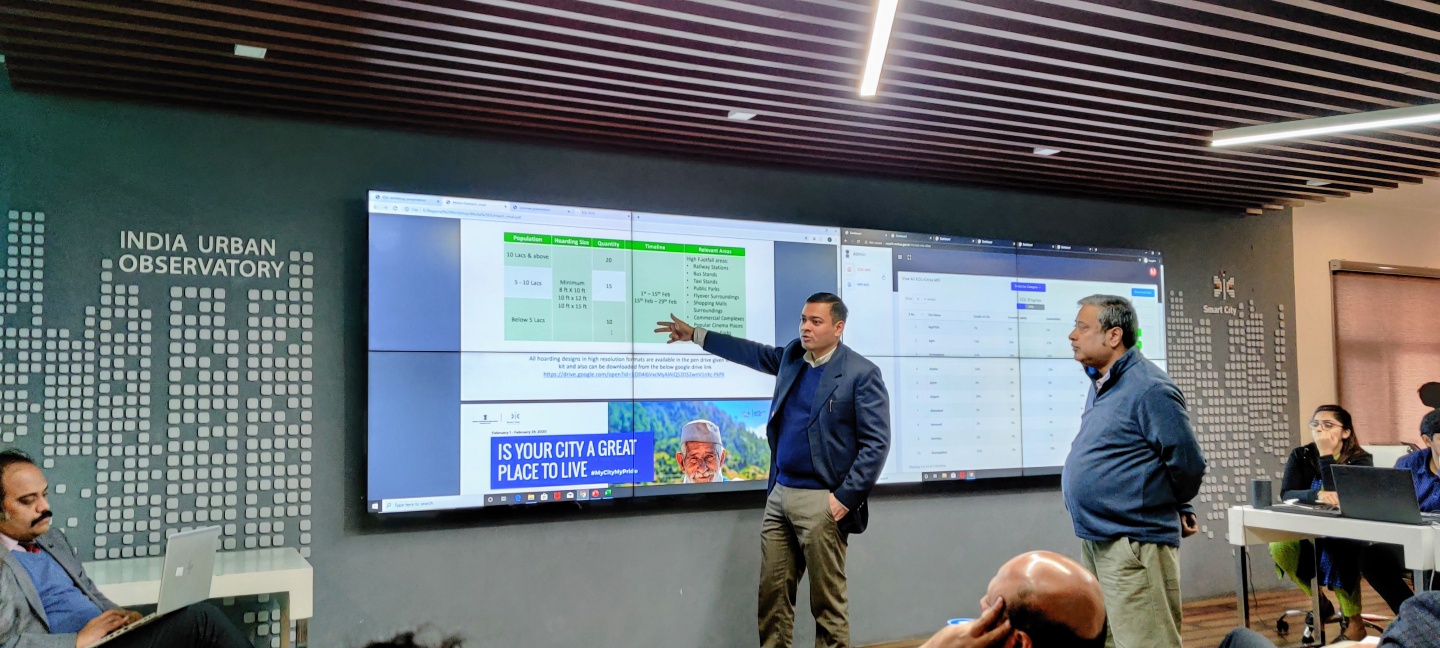
Way Forward (3rd February 2020 - 7th February 2020)
7 projects were selected for scaling it up at the national level. These include; Asha, ‘Housing Information Repository’, Conserve ‘Digital model to inform water-secure cities’, Design ‘Digital Platform to Rate public spaces’, Integrate ‘Digital Intervention for the informal sector’, Involve ‘Re-defining the scope of public engagement’, Plan ‘Real-Time Traffic Monitoring Tool’ and Zero Waste ‘Trading platform for waste’. The fellows started working on refining their projects.
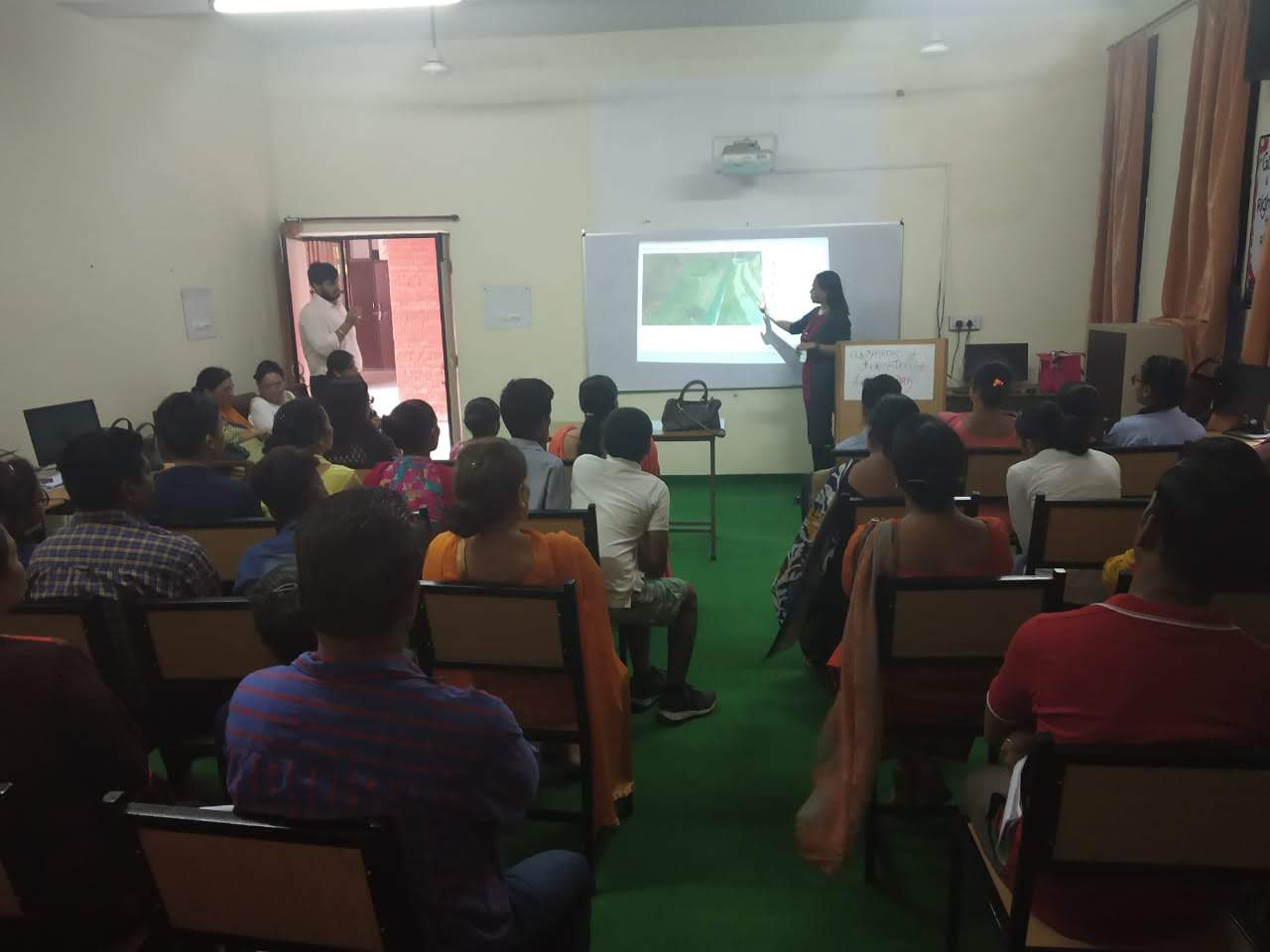
PRODUCT REFINEMENT (10th February 2020 - 14th February 2020)
Team Conserve met Mr. Vijay Chaurasiya, a joint advisor at CPHEEO to discuss the solutions and recommendations that can be added in the tool. Team Plan worked on enhancement of the tool 'Enable'. Fellow, Punit worked on developing the National Urban Innovation Stack and assessment framework for Mission Innovation Zone.
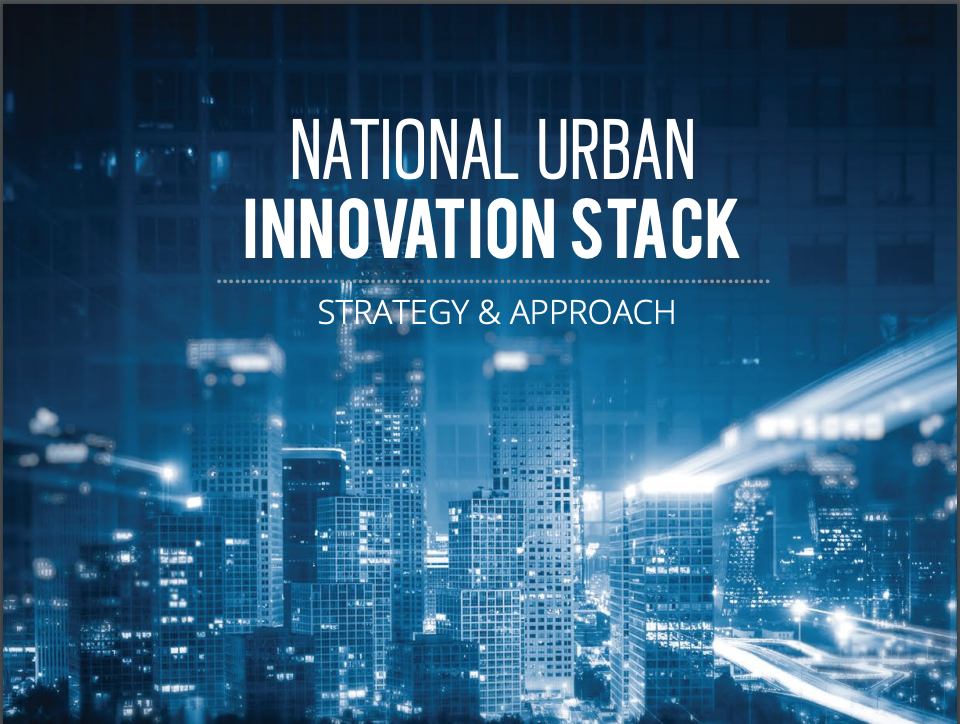
NEW ASSIGNMENTS (17th February 2020 - 21st February 2020)
The fellows worked on their projects as well as on the Ease of Living Index, Municipal Performance Index, Data-Smart Cities, Climate-Smart Cities, Mission Innovation, Mission Capacity Building, and the National Urban Innovation Stack. Team Conserve met Ms. Shravanti from CPHEEO to discuss on the ways to calculate water demand and methods of forecasting.
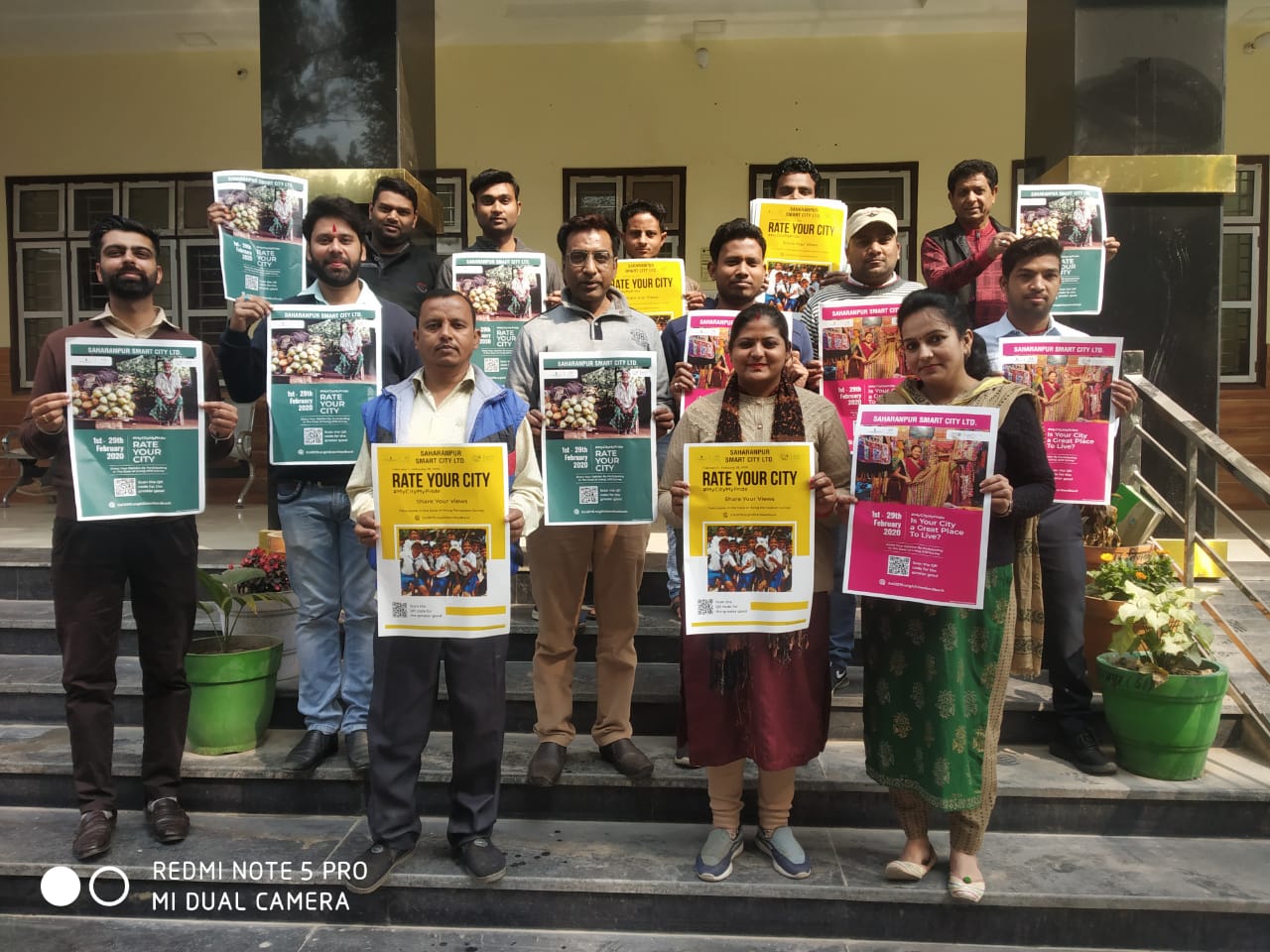
REVIEW MEETING (24th February 2020 - 28th February 2020)
The fellows had a meeting with Mr. Kunal Kumar, Mr. Rahul Kapoor, and representatives from Tata Trust and TCS to discuss the funding options in developing these projects. Team Involve started working on building cases for Global Liveability Index and had a meeting with EIU correspondents, meanwhile had a meeting with Mr. Kunal Kumar to take inputs on the toolkit.

BUILDING PLATFORMS (2nd March 2020 - 6th March 2020)
The fellows started working on developing a project compendium booklet. They also worked on data validation of Ease of Living and Municipal Performance Index and started working on the TULIP platform under the guidance of Mr. Kunal Kumar, Mission Director SCM & Joint Secretary, MoHUA.
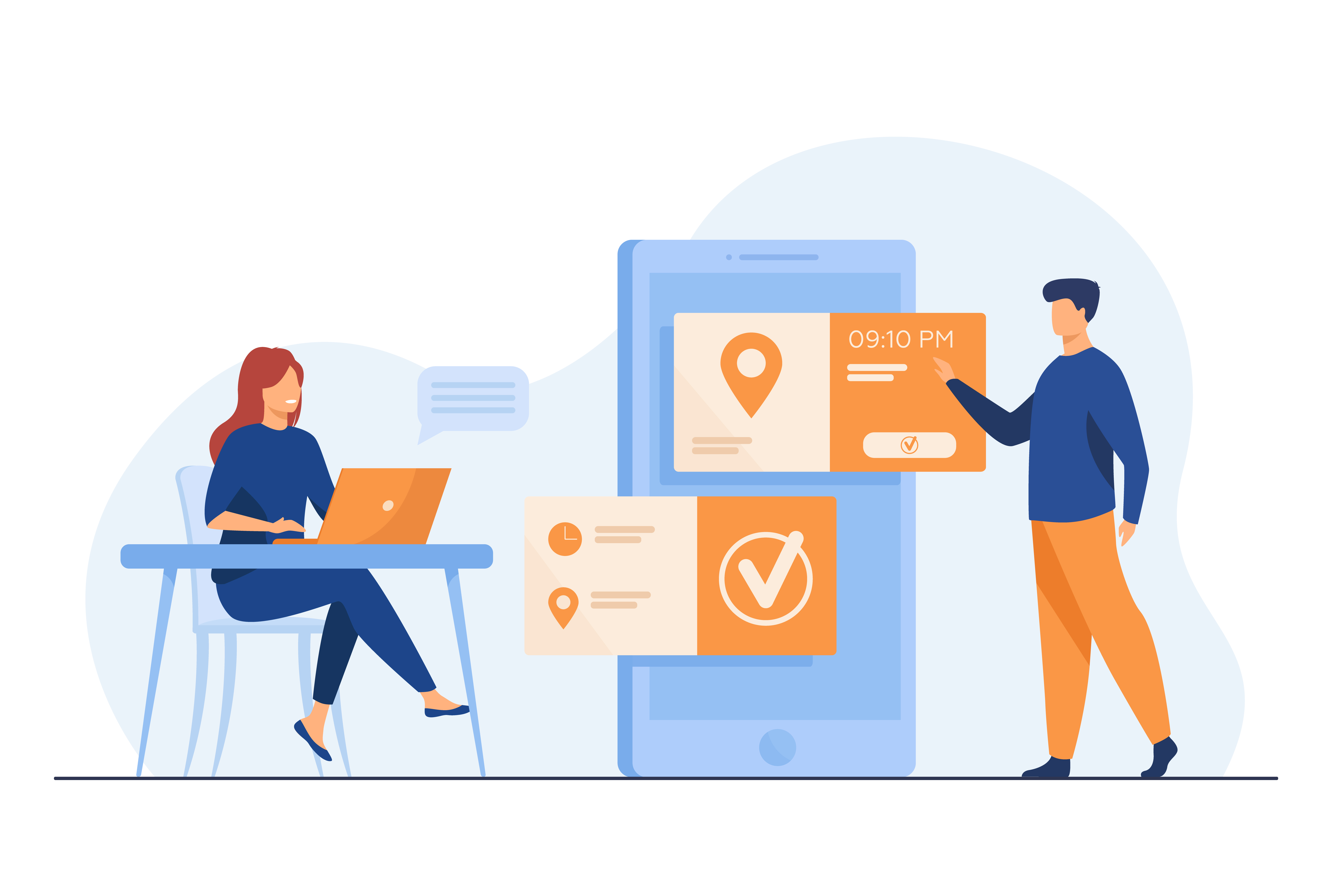
ONBOARDING OF 2020 FELLOW (9th March 2020 - 13th March 2020)
Wishing you all Happy and Colorful Holi. The Induction Programme of the Indian Smart Cities Fellowship 2020-2021 began on March 12 and continued till 20th March 2020. The cohort was introduced to Mr. Kunal Kumar, Joint Secretary of MoHUA, Mr. Rahul Kapoor, Director of India Smart Cities Mission, Mr. Hitesh Vaidya, Director, National Institute of Urban Affairs, and the extended cohort from 2019-2020.
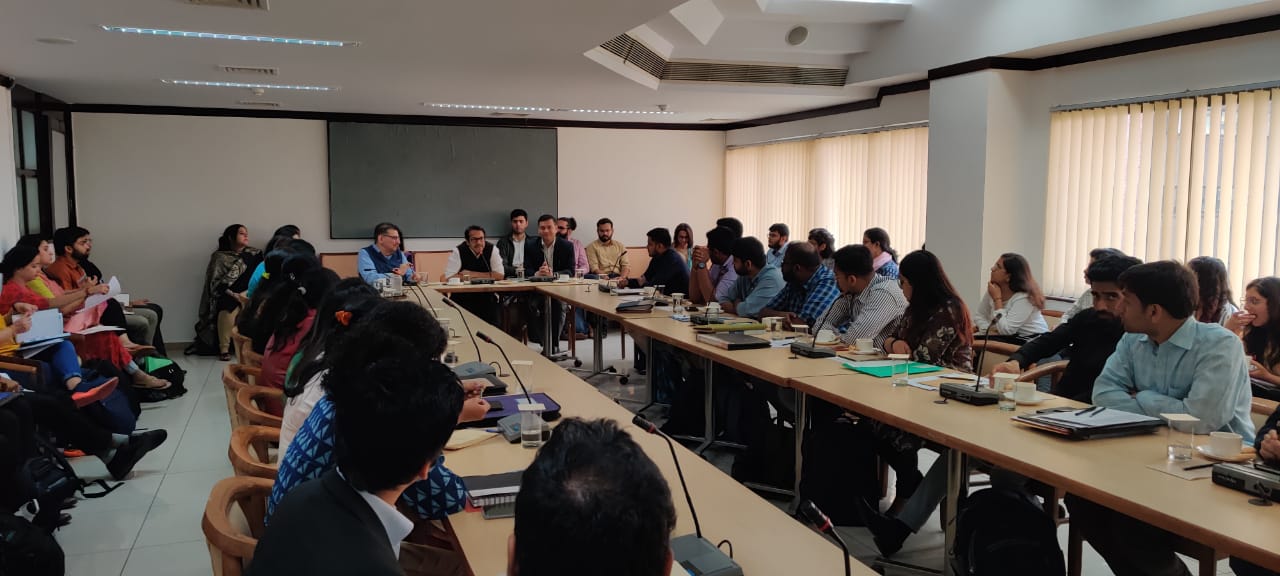
Induction Week (16th March 2020 - 20th March 2020)
The fellows were then familiarised with the ongoing Flagship Programmes and National Missions, such as SCM, AMRUT, HRIDAY, PMAY etc., by various experts in the field like Dr. Debolina Kundu, Mr. A.N.Nanda Kishore, Dr,Gautam Bhan, Dr. Debjani Ghosh, Mr.Gautam Ravichander, to name a few. Additionally, a holistic view of various sector-oriented task teams such as Data Analytics Management Unit, Climate-Smart Cities, Ease of Doing Business etc. was given to the new cohort. After only four days of in-person engagement, the fellows were asked to shift to a remote working location due to the ongoing COVID-19 pandemic. The rest of the Induction Programme involved expert lectures on the pressing urban issues of the country and the projects done by the first cohort, all of which were presented online.
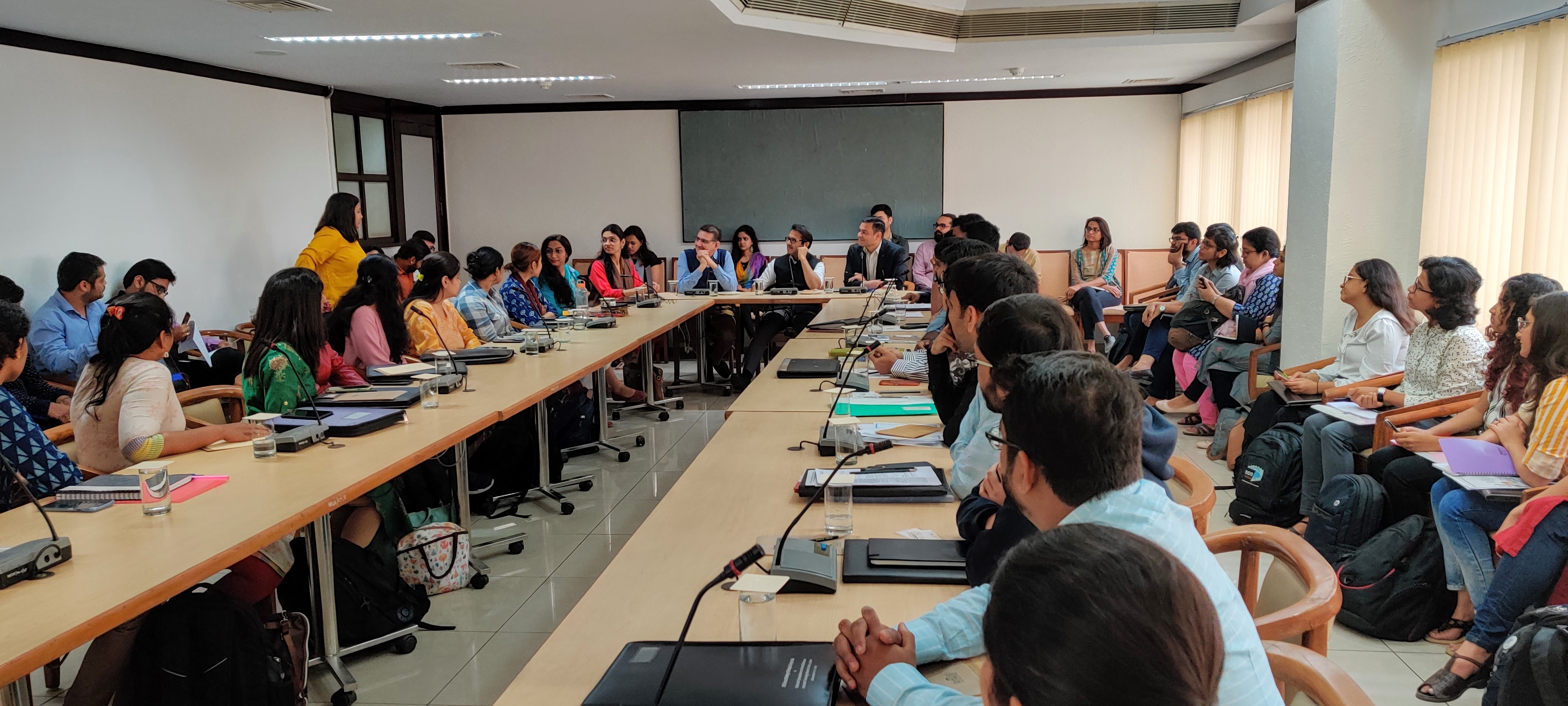
EXPLORATION PHASE (23rd March 2020 - 27th March 2020)
The 46 fellows of the 2020 cohort were divided into groups to conduct a SWOT analysis of 100 smart cities. Fellows explored the smart cities through their sector-based proposals, the extent of its feasibility on the ground, the challenges the SCM is currently facing across the country. The exploration phase primarily involved secondary research through newspaper articles, research papers and official reports produced by cities under the SCM. To this extent, certain teams chose a quadruple-helix model of assessing the interventions of smart cities and identified certain stakeholder level and implementation level challenges which were yet to be validated through a primary MIS based research.
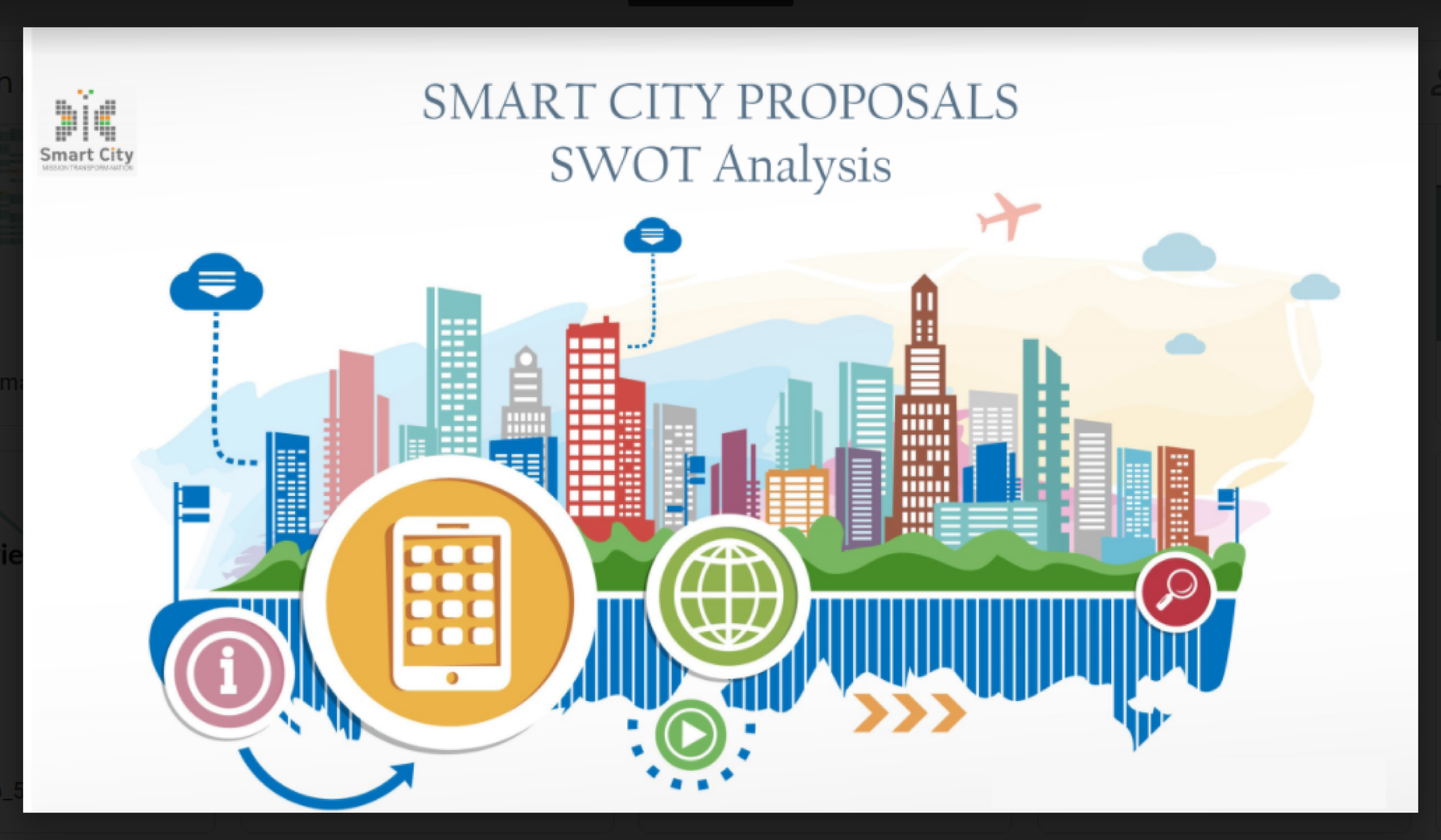
INVESTIGATION PHASE (30th March 2020 - 3rd April 2020)
Since 2015, India’s Smart Cities have implemented various sectoral level interventions through Area-based Development modules. The next phase in the SWOT analysis process for the 2020 cohort was the Investigation Phase, where data on the various sectoral interventions was mined to comprehend the extent of project implementation and completion amongst those proposed in the Smart City Proposals. The scheduled and actual rates of completion were compared, leading to the identification of weaknesses and opportunities in each of the smart cities. These opportunities and weaknesses will be the focus of the project ideation and development phases of the fellowship.
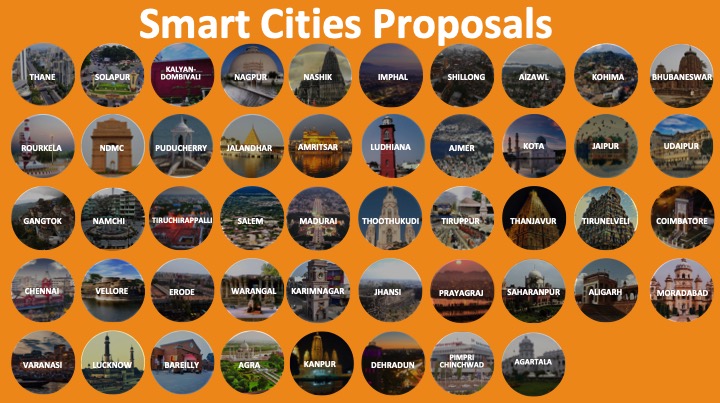
SWOT REVIEW (6th April 2020 - 10th April 2020)
The Exploration and Investigation phases of the cohort’s training exercise culminated in a SWOT analysis of the 100 Indian Smart Cities across the following sectors - Health, Housing and Slum Improvement, Skill Development/Capacity Building, Education, Disaster Management, Environment and Pollution, Energy, Sanitation and Solid Waste Management, Water Management, Stormwater Drainage Systems, Urban Mobility, Recreational and Public Spaces, Tourism, Heritage Development, Safety and Security, Ease of Doing Business, Governance. At the end of the week, the cohort held the final presentation of the SWOT Analysis of all the 100 smart cities, identifying probable areas/sectors of work. 2019 cohort had a meeting with the PwC team for tool development.
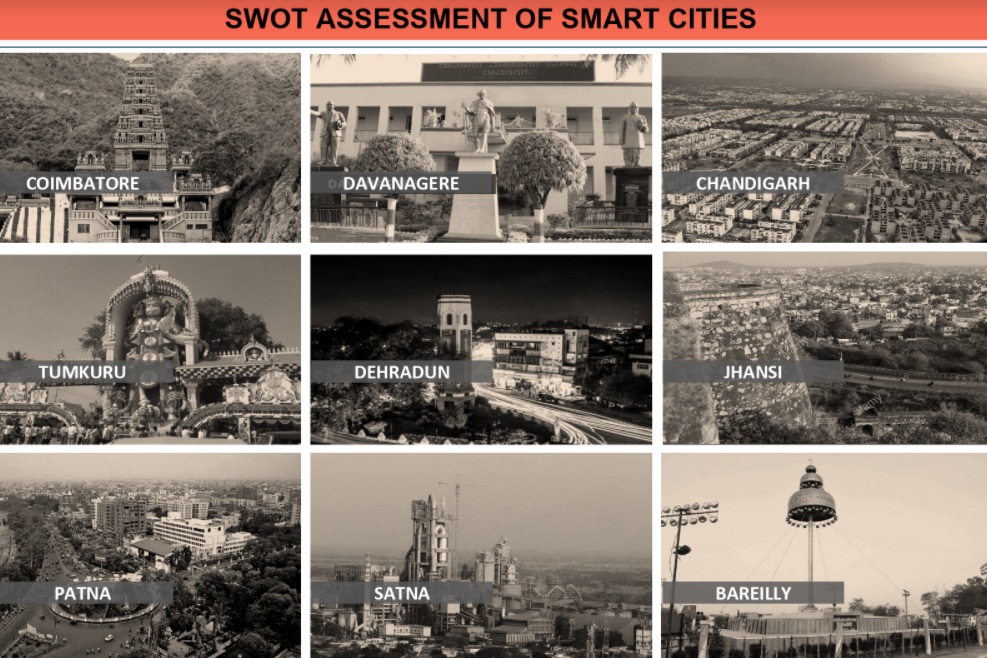
IDEATION EXERCISE (PHASE 1)- DESIGN THINKING PROCESS (13th April 2020 - 17th April 2020)
One of the first tasks involved in the Ideation Phase was the categorisation of the issues identified through the SWOT exercise into sectors. To this extent, a ‘Design Thinking’ process opted to debate and ideate based on issues identified in various sectors such as, in Mobility, Tourism, Disaster Management, Citizen Engagement, Migration, Informal sector, Urban Innovation based on ICT, SWM, Food Security, Health. to name a few. Various digital mediums like Jam boards and online meeting platforms were used for communication due to the work from home scenario. By the end of the week, the cohort effectively came up with about 68 problem statements.
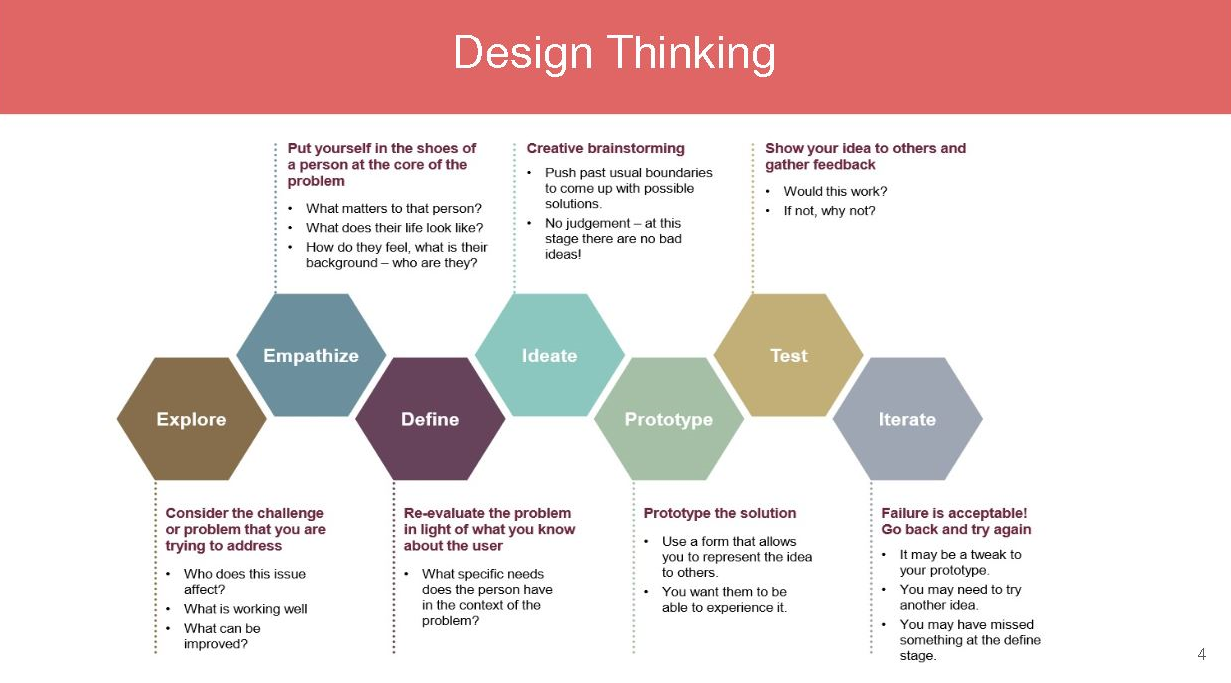
IDEATION EXERCISE (PHASE II)-THE FIVE ‘W’s’ (20th April 2020 to 24th April 2020)
Ideation Phase II focussed on refining the problem statements/sectors identified based on the five ‘W’s’:‘What’ is the problem? ‘Why’ is it a problem? ‘Where’ is the problem occurring? ‘Who’ is facing the issue? ‘When’ exactly is the problem occurring/recurring? Finally, a question pertaining to the solution, as to ‘What’ we, as fellows, can do to avert the issue was also discussed. The fellows addressed each of the problem statements and their solutions and about 40 of the issues were finalised for the second round of refinement. Additionally, the cohort was also involved in executing the required back-end work for MoHUA’s ‘ TULIP - The Urban Learning and Internship Program’ portal. Team conserve did a research study on the solutions that can be adopted by cities to meet the increasing water demands from various sectors.
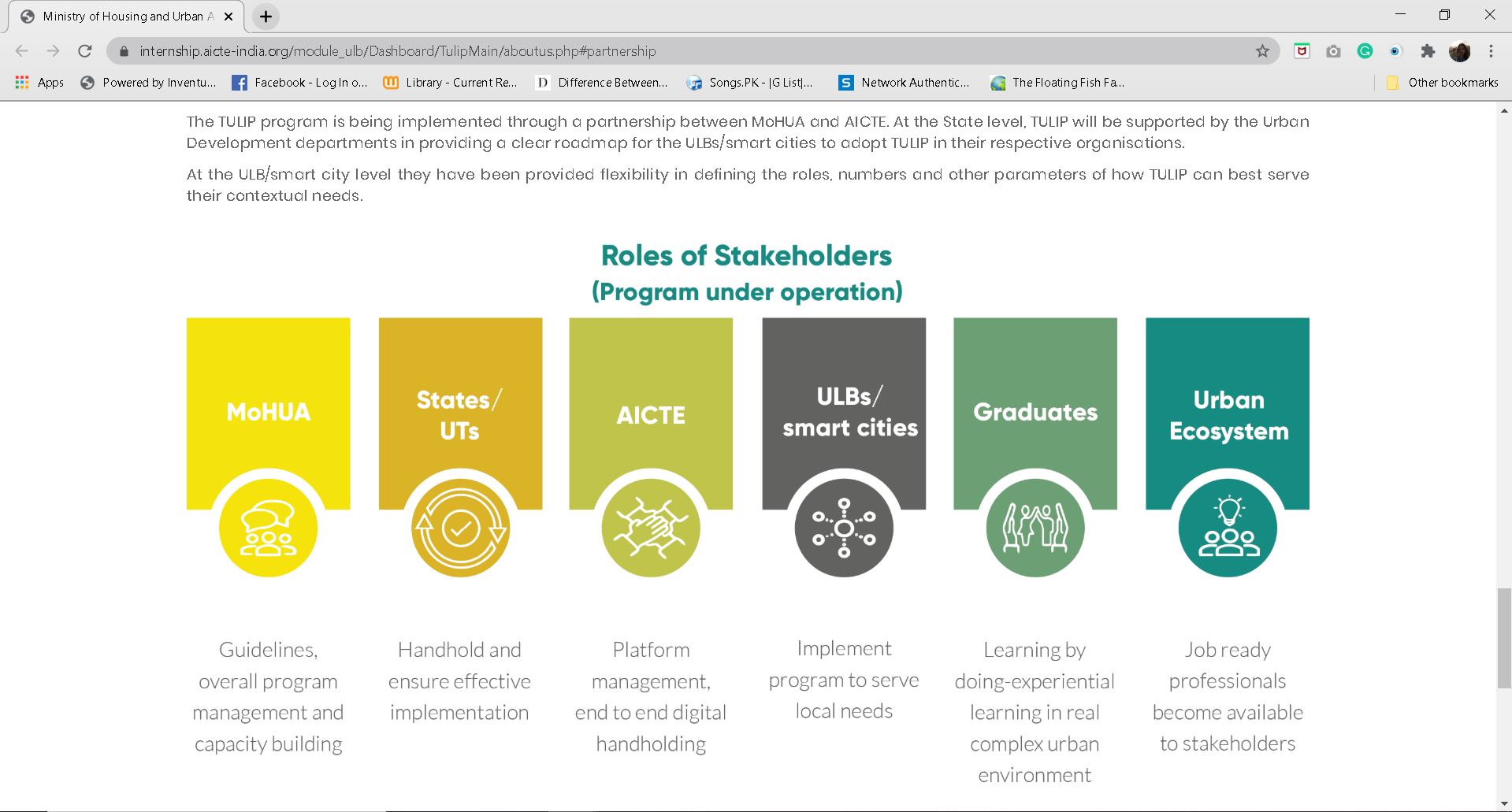
IDEATION EXERCISE (PHASE III) AND FIRST REVIEW - EXPERTS'VIEWS (27th April 2020 to 1st MAY 2020)
Ideation Phase III involved secondary research and discussion of all the problem statements sector-wise with possible solutions. Teams consulted experts in various fields in order to refine their understanding of the problems, as well as arrive at possible solutions - leading to the formation of projects that were to be proposed in the preliminary review at the end of the week. Additionally, the cohort also participated in two webinars - Urbanlogue, an online platform for India city officials to create smart urban transport solutions and Tech-Clinic, where technological solutions to battle COVID-19 were discussed and debated, were conducted by National Institute of Urban Affairs, Ministry of Housing and Urban Affairs, and the Smart Cities Mission. The two webinar series brought many experts in their respective lines of work on one platform where a plethora of urban issues. Along with it, how services across various sectors would resume after lockdown was discussed. The webinar series conducted proved to be beneficial for the fellows as it provided insights for further project ideas with solutions and streamlining the same.

IDEATION EXERCISE - SECOND REVIEW (4th May 2020 - 8th May 2020)
After the third round of refinement, 35 project ideas were finalised for the Second Review. The Second Review took place on 5th and 6th May 2020 with the Mission Director, Mr. Rahul Kapoor, Mr.Vikash Chadra, and Mr.Sampath Kumar. The developed project ideas were pitched and discussed with them. Certain project ideas that belonged to a similar sector were asked to be merged and about 32 project ideas were confirmed for a final review that was scheduled for the next week.
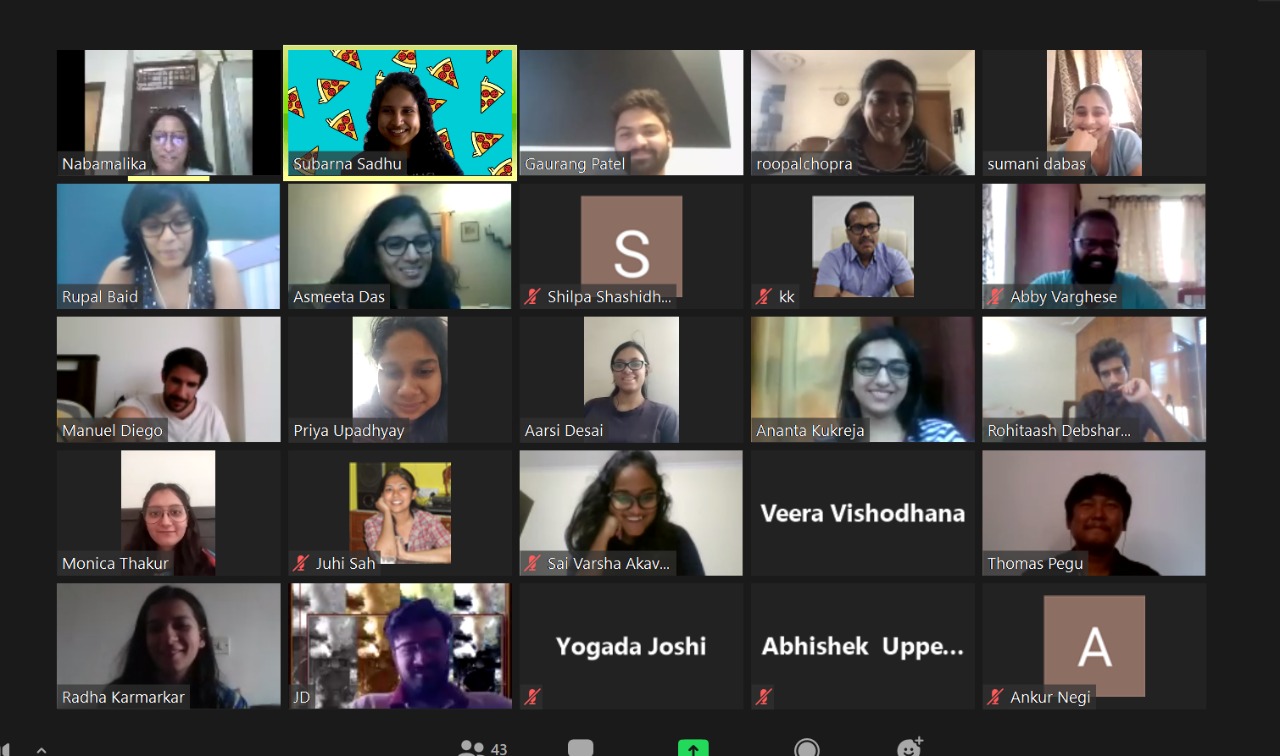
PROJECT FINALIZATION AND FINAL REVIEW (11th May 2020 - 15th May 2020)
On the 11th of May 2020, a final detailed review of the ideated 31 projects was conducted with Mr. Kunal Kumar, Joint Secretary of MoHUA, Certain projects were further merged at a micro-scale giving way to the formation of 13 Final Projects, one from each sector to be undertaken for ISCFP 2020. The projects finalized belonged to the following sectors: Tourism, Migration and Informality, Urban Data analytics, Environment, Urban Planning and Land-use, Disaster Management, Mobility, Water Management, Citizen Engagement, Health, and Urban Economics. Additionally, with the Prime Minister Mr. Narendra Modi announcing the ‘Atma-Nirbhar Bharat Abhiyan Economic Package’, the cohort held ‘Demystifying Economic Package’ sessions to discuss economic reforms and bonds introduced w.r.t the ongoing COVID-19 pandemic and its impact on various sectors. The session helped the fellows understand how the economics of the projects proposed be approached and how to streamline the projects in a way that voiced ‘Vocal for Local’.

NEWSLETTER IDEATION - ISCF DIGEST (18th May 2020 to 22nd May 2020)
This week commenced the work on the ISCFP Newsletter. The first issue of the newsletter focussed on depicting perspectives and experiences of the fellows during the pandemic. The basic framework for the Volume I of the ISCF Digest was ideated, the content and design for the same were edited and finalized for four weeks. Additionally, few of the fellows from the cohort were also involved in Affordable and Social Housing Aggregator and Building Infant and Caregiver friendly neighbourhood - ITCN project at NIUA and the Ministry.

IUDX PLATFORMS (25th May 2020 to 29th May 2020)
The design and content creation for the newsletter followed well into this week. Furthermore, a few of the fellows were involved in IUDX (India Urban Data Exchange) platform where they assisted the ministry, IUDX team, and IISc in providing technology and management support and helping in defining project objectives, plans, and data standards for the project. In addition to IUDX, the fellows were also involved in the IUO (India Urban Observatory) platform where they worked on Improving the existing platform and creating FRDs (functional requirement documentation) which are lists of features to be implemented in the future.
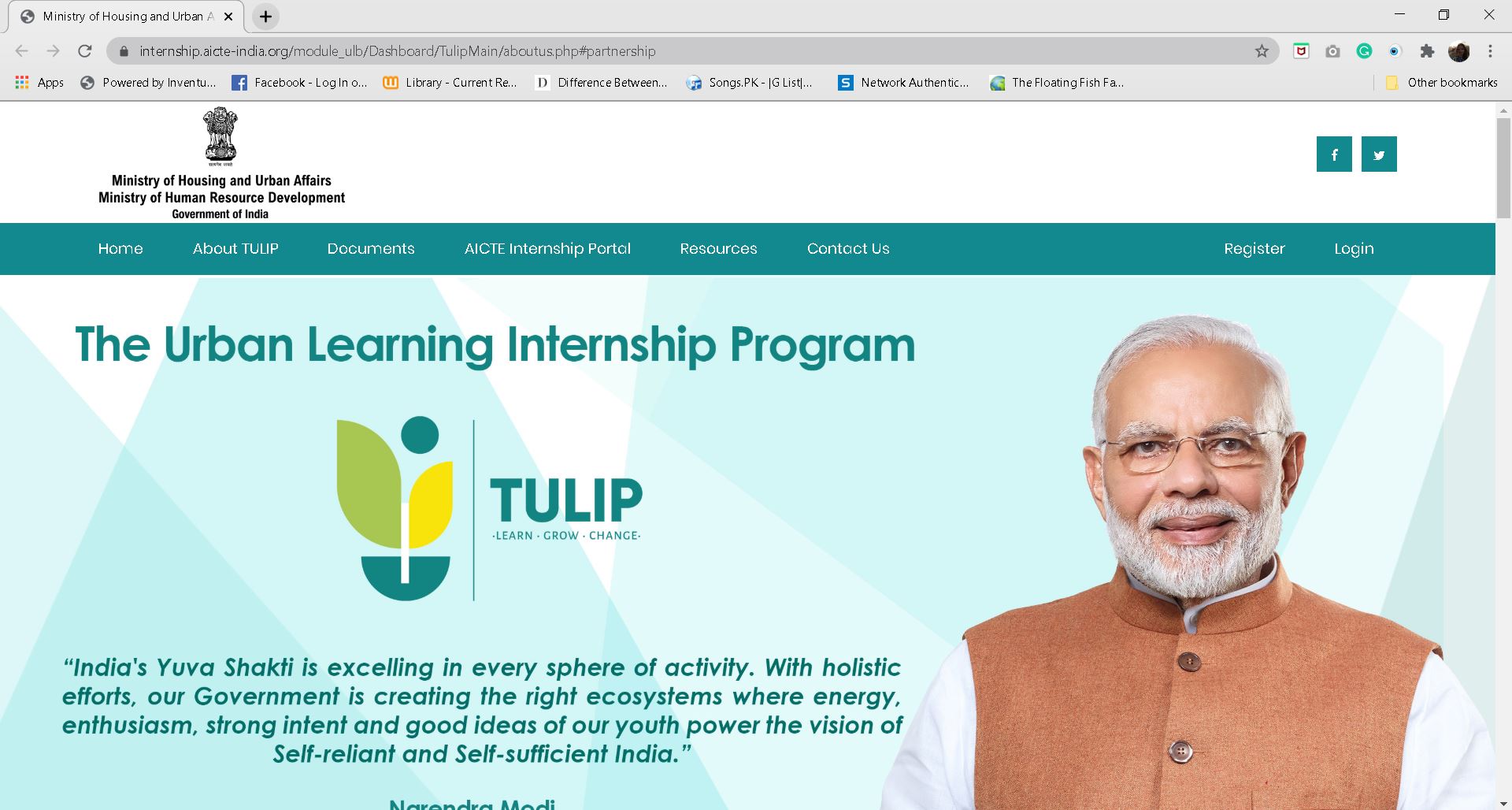
TULIP LAUNCH (1st June 2020 - 5th June 2020)
The Tulip Programme launched on 4th June 2020 saw the active participation of the cohort, especially in refining the website. The website’s user interface was tested from both ULB and the applicant’s perspectives. The cohort gave many insights and was instrumental in executing some of the back-end work required for the final website.
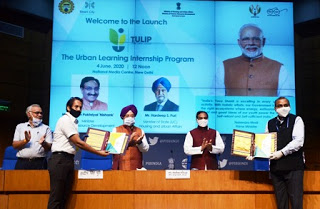
TEAM FORMATION EXERCISE (8th June 2020 - 12th June 2020)
With the projects finalised, the next steps involved team formation and mentor identification. 13 teams were formed as per the final projects. During this period, the teams commenced their in-depth research to start their project proposals and suggested a list of mentors for their various projects on whose support and guidance they would rely for the duration of the fellowship.
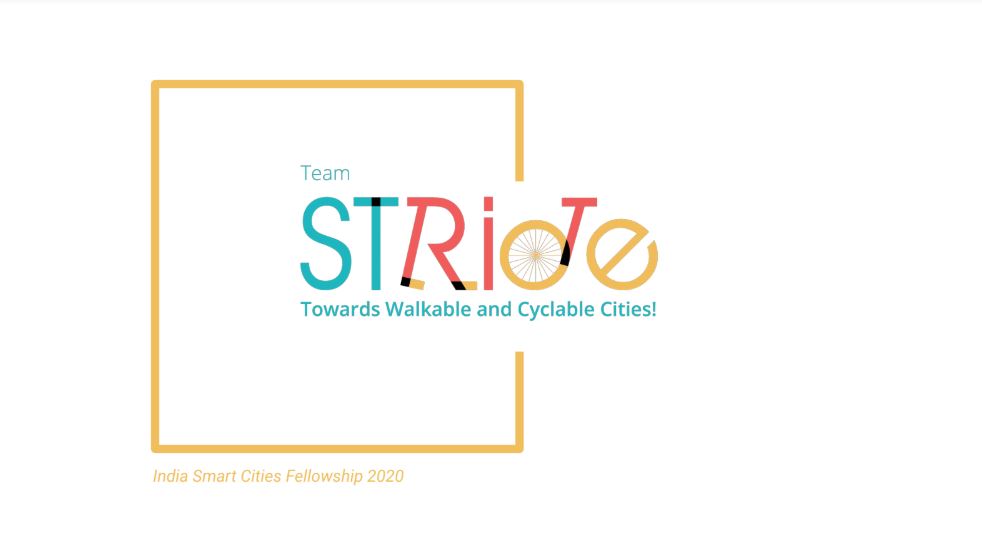
PROJECT PROPOSAL (DRAFT I) - PRIMARY RESEARCH (15th June 2020 to 19th June 2020)
The teams continued their in-depth research for the development of the project proposal. Elaborate group discussions were followed by extensive secondary research to identify, comprehend, and critically review the current urban practices across India and the world relevant to the project’s focus. This saw the teams reworking on their problem statements, aims and objectives, and the scope of their projects within one year.

PROJECT PROPOSAL (DRAFT I) - PROPOSAL PREPARATION (22th June 2020 to 26th June 2020)
This week commenced the drafting of the project proposal. Additionally, the teams also worked on phasing their projects, inclusive of a temporal phasing keeping in purview the COVID-19 times and the current ‘Work from Home’ situation and how it would/or not affect their various data collection and stakeholder consultations required for successful project completion and implementation.
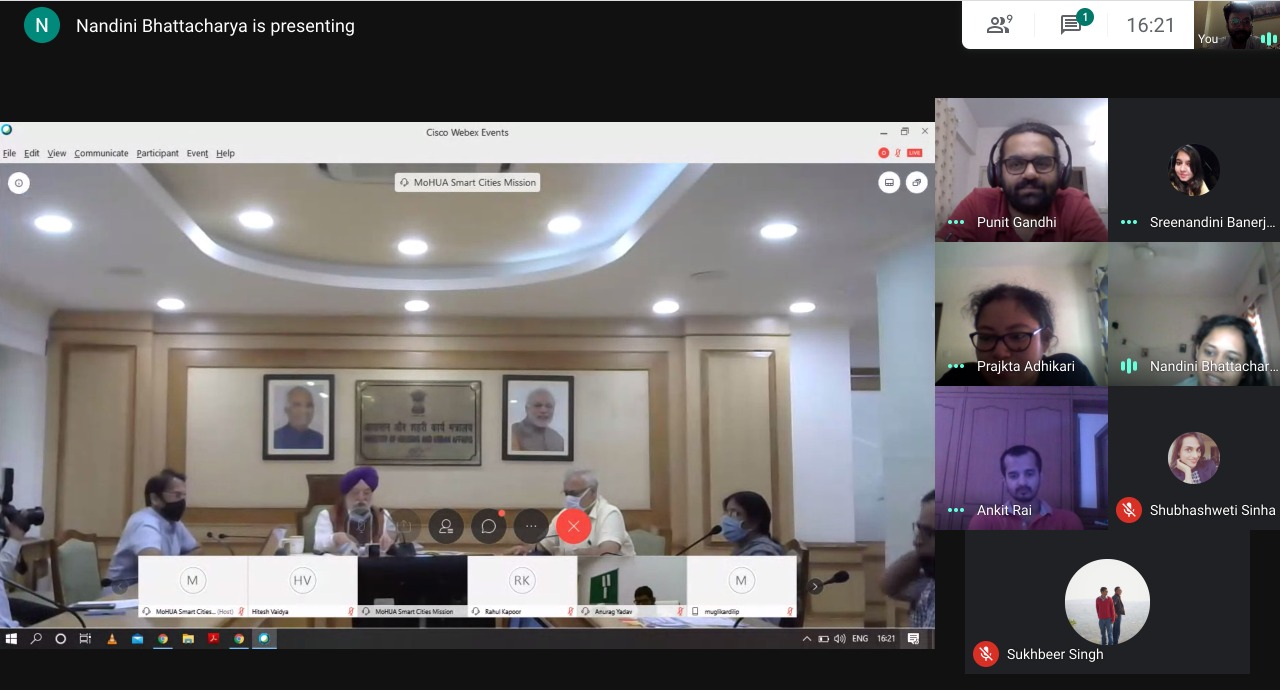
PROJECT PROPOSAL - DRAFT I SUBMISSIONS (29th June 2020 to 3rd July 2020)
The entire week was dedicated to finalising the first draft of the project proposal. Additionally, after innumerable iterations to design and about various levels of content review, the first volume of the ISCFP newsletter, ‘ISCF Digest - April-June Issue’ was finalised and scheduled for release on the website after securing required approvals from MoHUA.
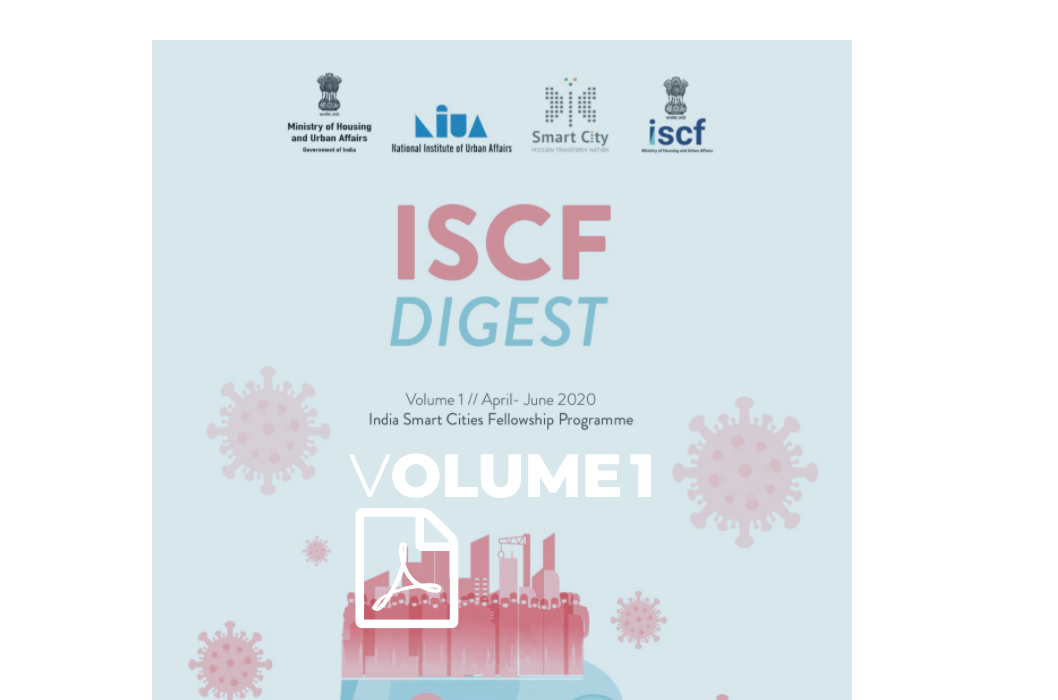
INTERNAL MENTOR CONSULTATION (6th July 2020 to 10th July 2020)
All the teams were assigned an Internal Mentor, an industry expert on each of the sectors the ISCF projects relate to, from NIUA, to guide the fellows on streamlining each of their projects. In this period, the teams undertook a critical review of the proposals they drafted to scale them down to be made implementable within the duration of the fellowship. Additionally, the fellows were also included in providing necessary feedback on the IUO portal and a cycle 4 change webinar.
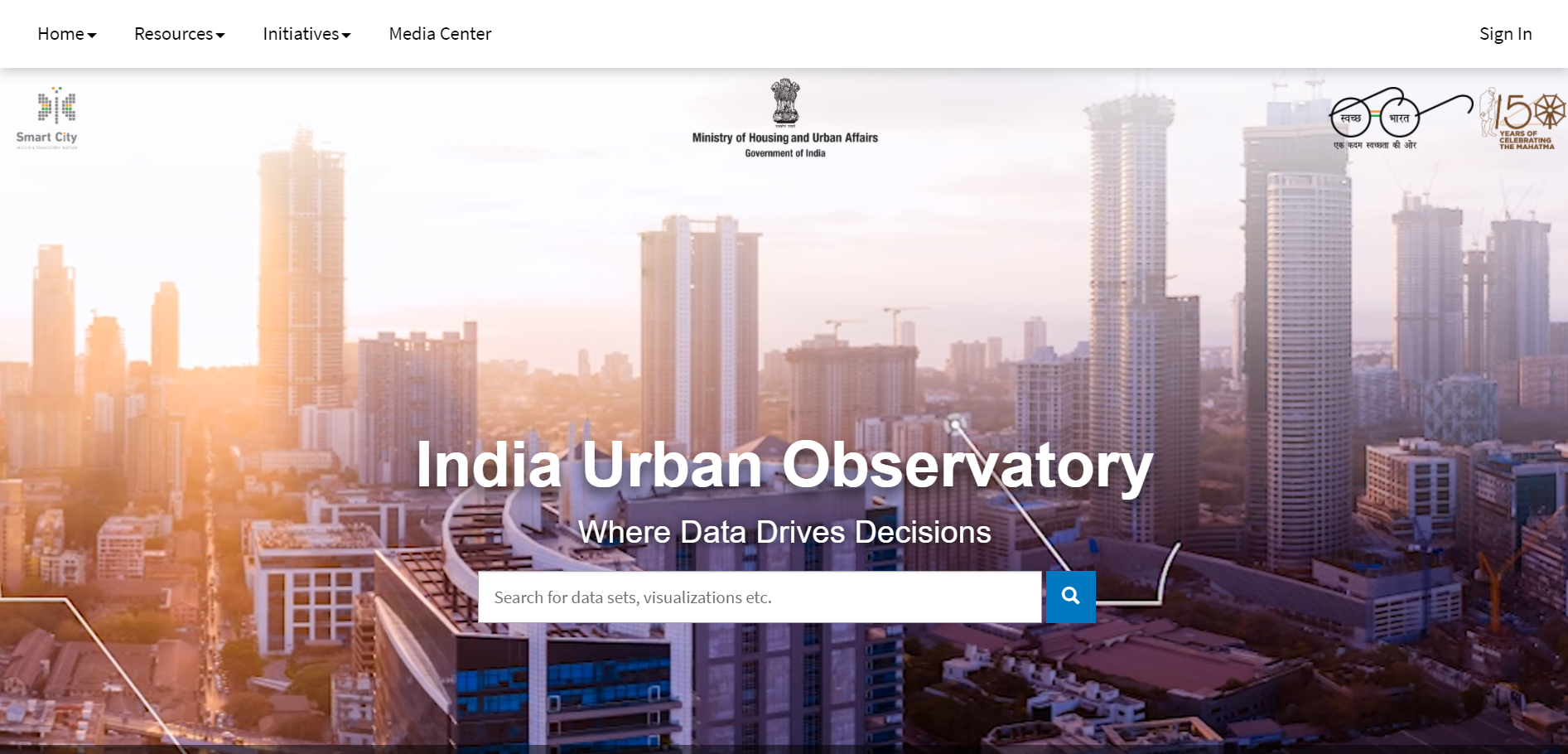
INTERNAL MENTOR CONSULTATION (13th July 2020 to 17th July 2020)
The fellows continued their consultations with their respective internal mentors.Elaborate group discussions were followed by extensive scoping of the projects to adhere to the scalability, replicability and adaptability of the projects pan India. This saw the teams reworking on their project proposal, namely – the problem statements, aims and objectives, the phasing of the proposed solution and the implement ability aspects of the project.
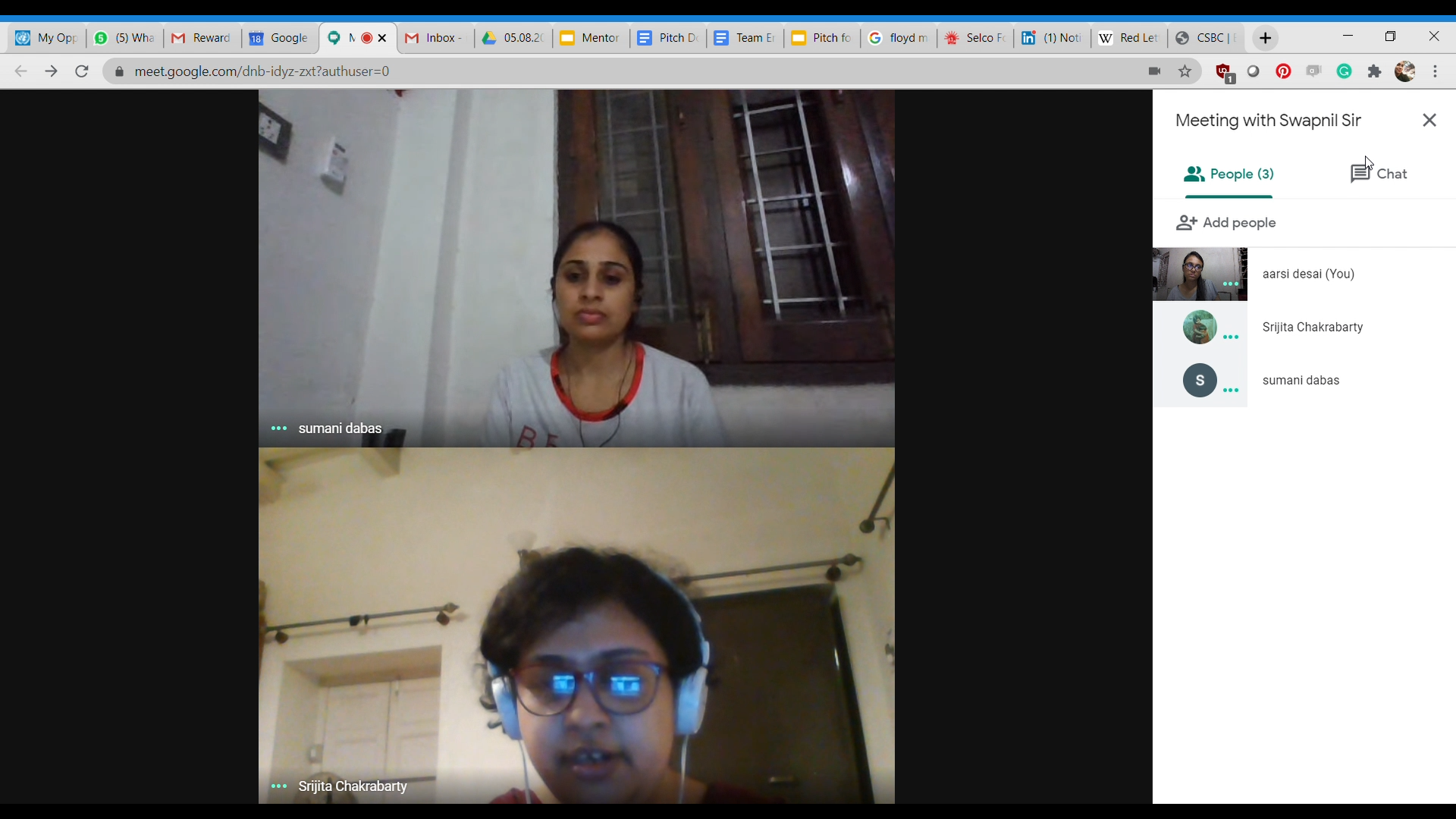
AMPLIFI - URBAN DATA CHALLENGE (20th July 2020 to 24th July 2020)
In conjunction with the internal mentor consultations, the fellows were additionally onboarded onto an ‘URBAN DATA CHALLENGE’ being conducted by MOHUA. As a part of the challenge, the fellows and their teams were asked to choose data from a particular sector that best fit into the theme of their project available on the AMPLIFI portal and visualise the data in two particular sub-challenges. This saw the fellows working on various platforms, creating interactive dashboards with the available data, that will eventually be uploaded onto the AMPLIFI Portal.
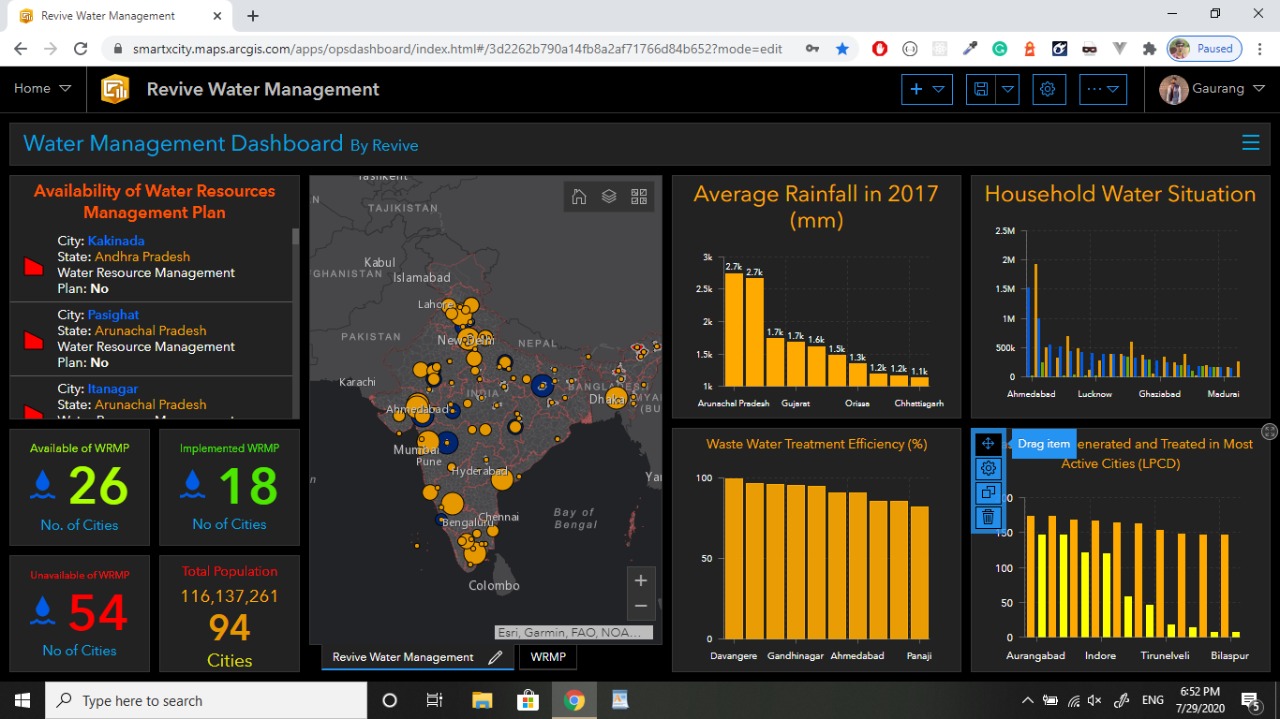
AMPLIFI - URBAN DATA CHALLENGE (27th July 2020 to 31st July 2020)
The week culminated in the end with the Urban Data Challenge based on the AMPLIFI portal. The fellows came together with the officials from PwC and MoHUA to present the workings of their visualisations which was largely commended with certain tweaks to the visualisations as provided by the MoHUA team, which were duly incorporated by the end of the week. Additionally, during the week the fellows designed questionnaires for primary data collection based on their project ideas to aid in scoping of their respective projects.
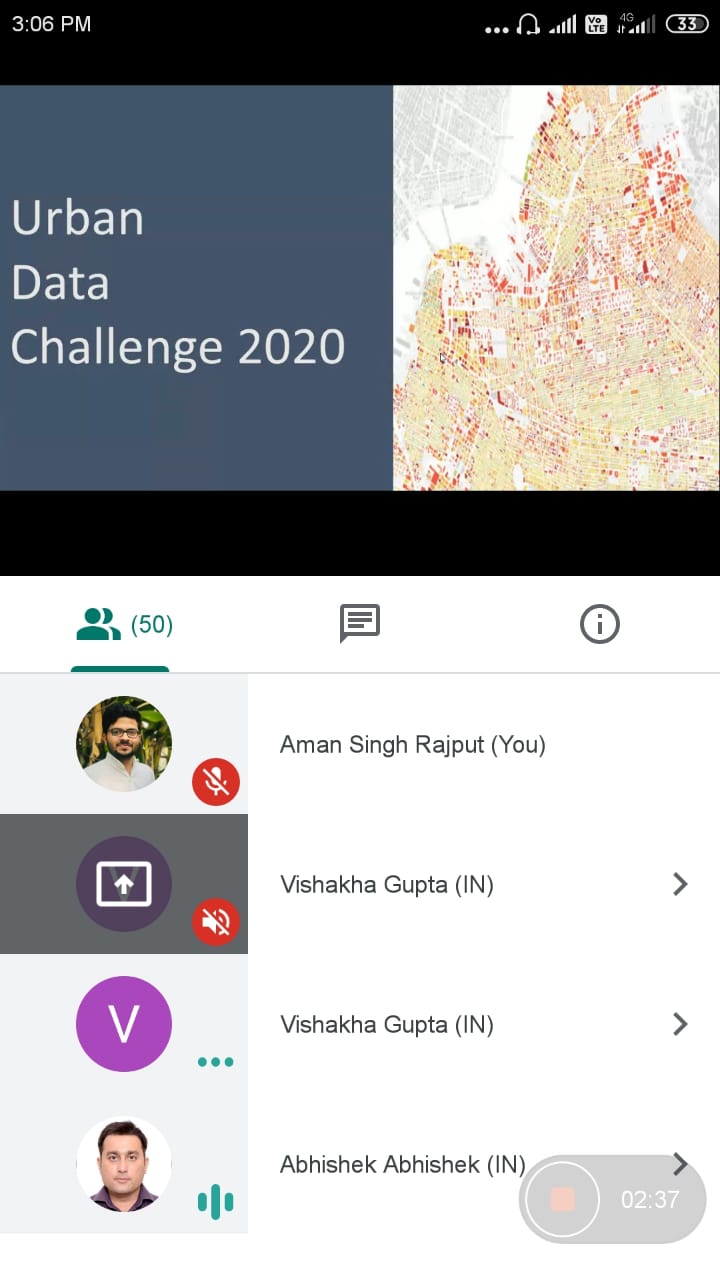
EXTERNAL MENTOR CONSULTATION (3rd August 2020 to 7th August 2020)
This week saw the external mentors being boarded onto the fellowship projects. Majority of the teams began drafting presentations on the progress of the project to be presented to the external mentors for their valuable inputs. Additionally, the fellows were also involved in finalising data inputs for the AMPLIFI Portal, with top 5 visualisations to be featured. All the teams started identifying and working on the parameters that are required to be addressed for their respective projects.
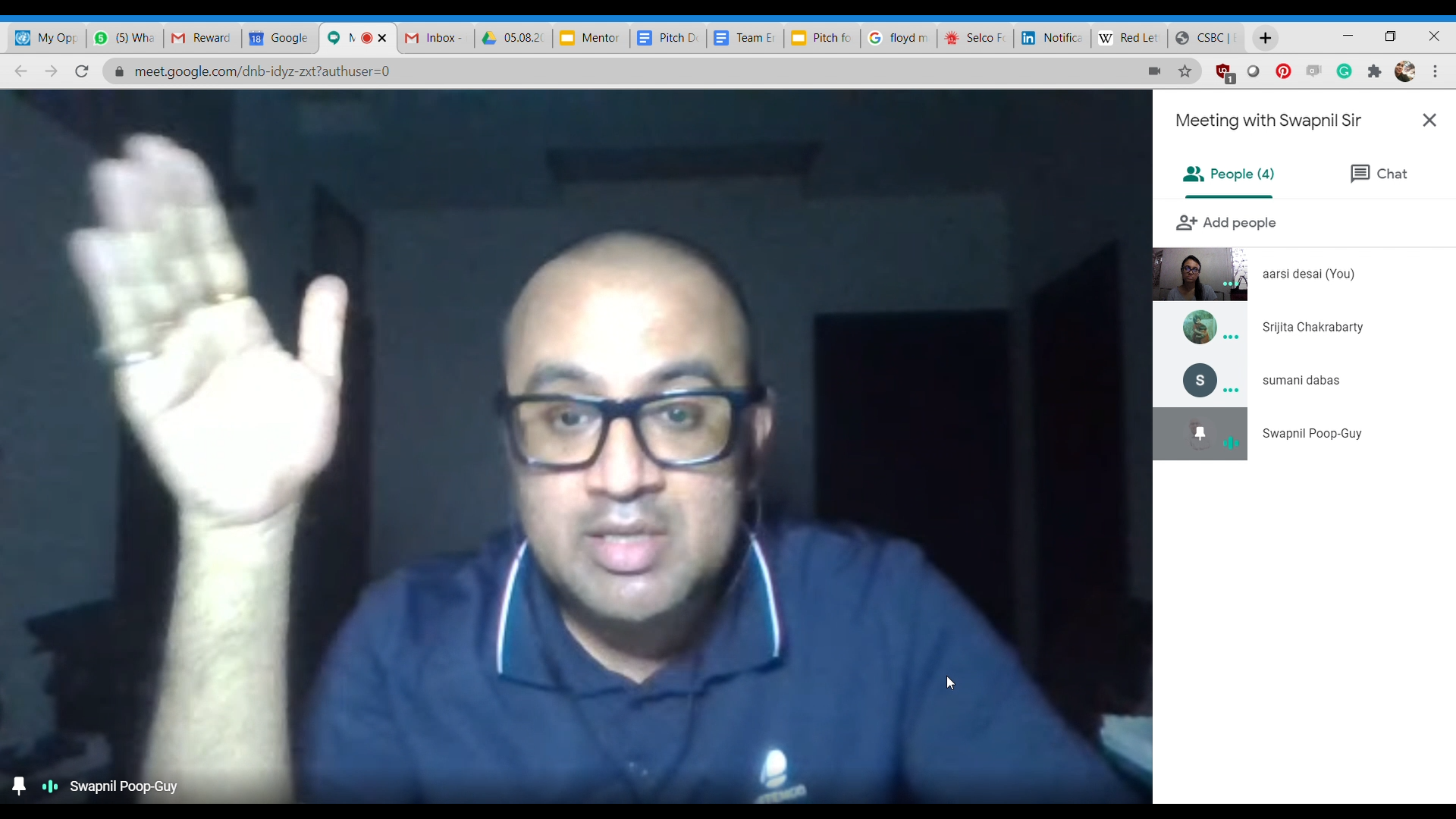
STAKEHOLDER CONSULTATION (10th August 2020 to 14th August 2020)
With most of the teams having been assigned both an external and internal mentor, this week saw the fellows contacting smart city professionals working in the field pertaining to the respective ISCF projects. The fellows began conducting preliminary surveys on on-ground realities of various projects being undertaken by the smart cities based on the sector the ISCF projects are focussed on. In this regard, Team RECON conducted meetings with the police officials of Varanasi. Similarly, Team REACT made advances to get in touch with the OSDMA and SSDMA officials to understand the ongoing digital interventions in the Disaster Management sector. The week culminated in a knowledge sharing session which saw the fellows from the extended cohort presenting their projects and the stakeholder consultation strategies that they have used to help the current cohort contact the stakeholders effectively.
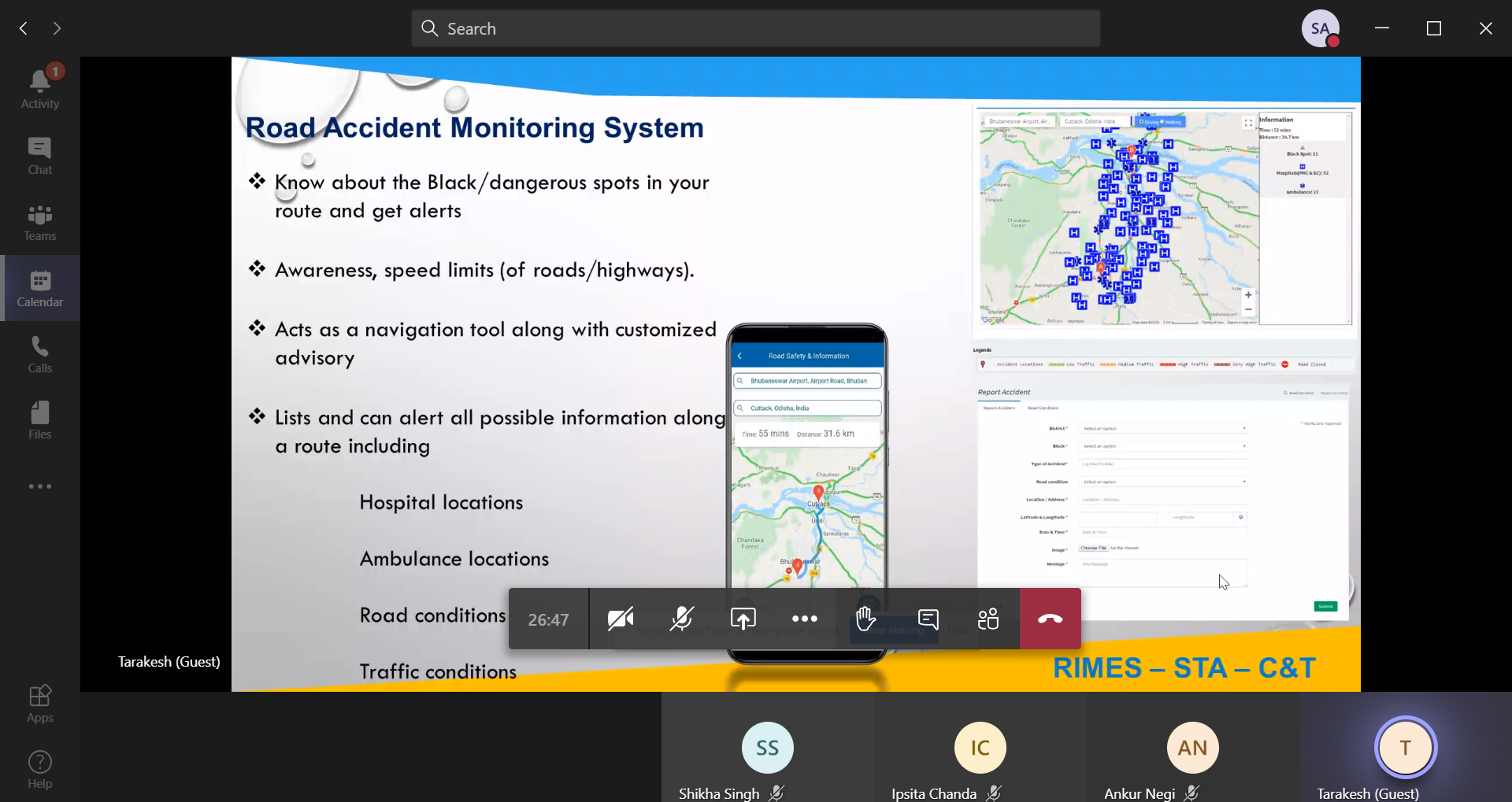
KNOWLEDGE SHARING (17th August 2020 to 21st August 2020)
A Knowledge Sharing session of 3 days was organised within the cohort, it included project presentations and discussions on project streamlining as well as challenges being faced by the cohort during the stakeholder consultation. The other two days included ongoing project discussions among all the teams and editing of the project proposal due for submission the upcoming week. Additionally, the cohort was also involved in the ‘Driving data culture in cities - The Smart Way’ webinar hosted by MoHUA. Additionally, Team MOBILISE was involved in the planning and onboarding of cities to a SMART - SUT Data challenge being conducted in conjunction with GIZ.
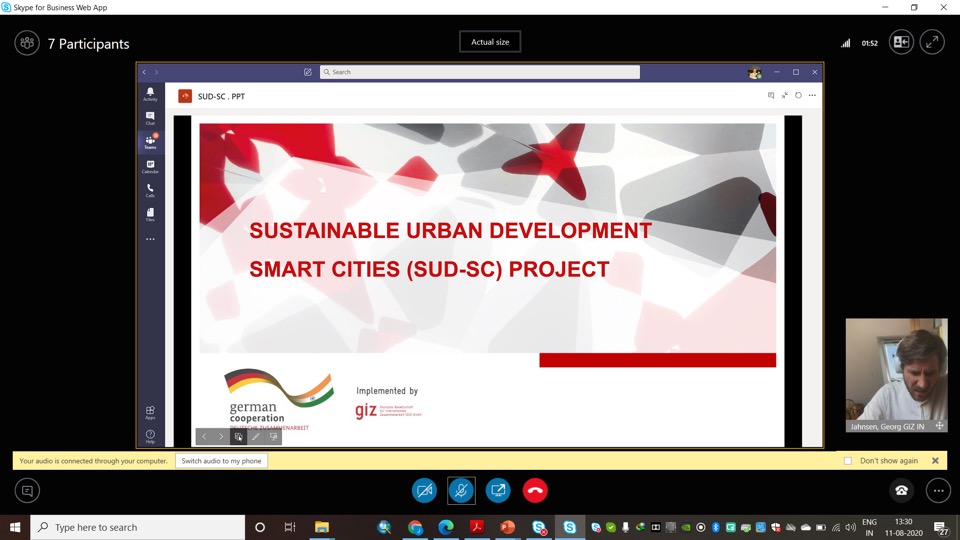
PROJECT PROPOSAL FINALIZATION (24th August 2020 to 28th August 2020)
With the final project review a week away, all the teams were preoccupied in finalizing their project focus, presentation, proposal and pitch videos with their respective internal and external mentors. Working on streamlining their projects, Teams Revive, Stride and Preserve attended a discussion on ‘Master plan of Delhi’ chaired by Mr, Victor Shinde, Water Environment Specialist and Sector Coordinator for Water and Environment at NIUA along with his team. Also, Team Usha Attended Health and urban planning WHO sourcebook Webinar Hosted by NIUA Chaired by Mr Kunal Kumar, Joint secretary Mohua and moderated by Mr Hitesh Vaidya, Director NIUA.
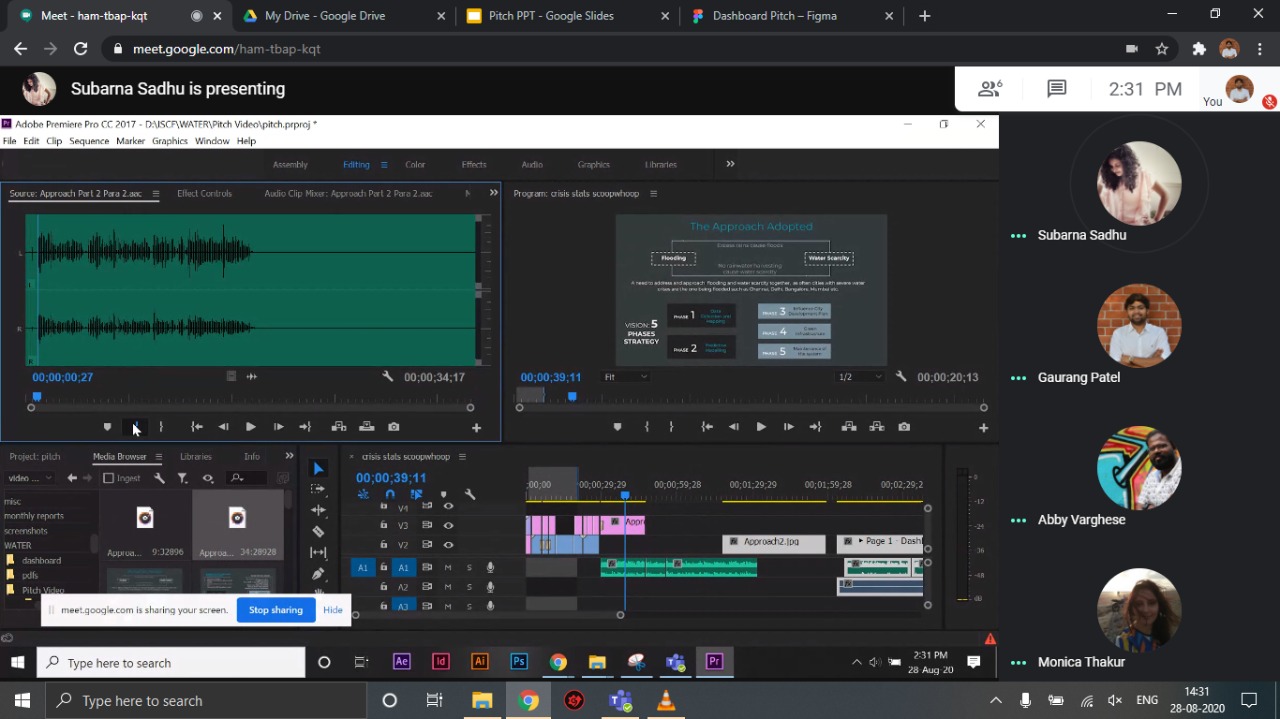
PROJECT REVIEW AND PROJECT PITCH (31st August 2020 to 4th September 2020)
The week involved a two-day review organized with Mr. Kunal Kumar, Mr. Rahul Kapoor and all the Teams’ External and Internal mentor present on 31st August and 2nd September. The Review consisted of the teams presenting the project starting with the problem addressed, the methodology undertaken, the product and the process it involves along with the stakeholders, beneficiaries and the benefits - both immediate and extended. The teams discussed cities that would be appropriate for executing their pilot projects and the rationale behind selecting those cities.
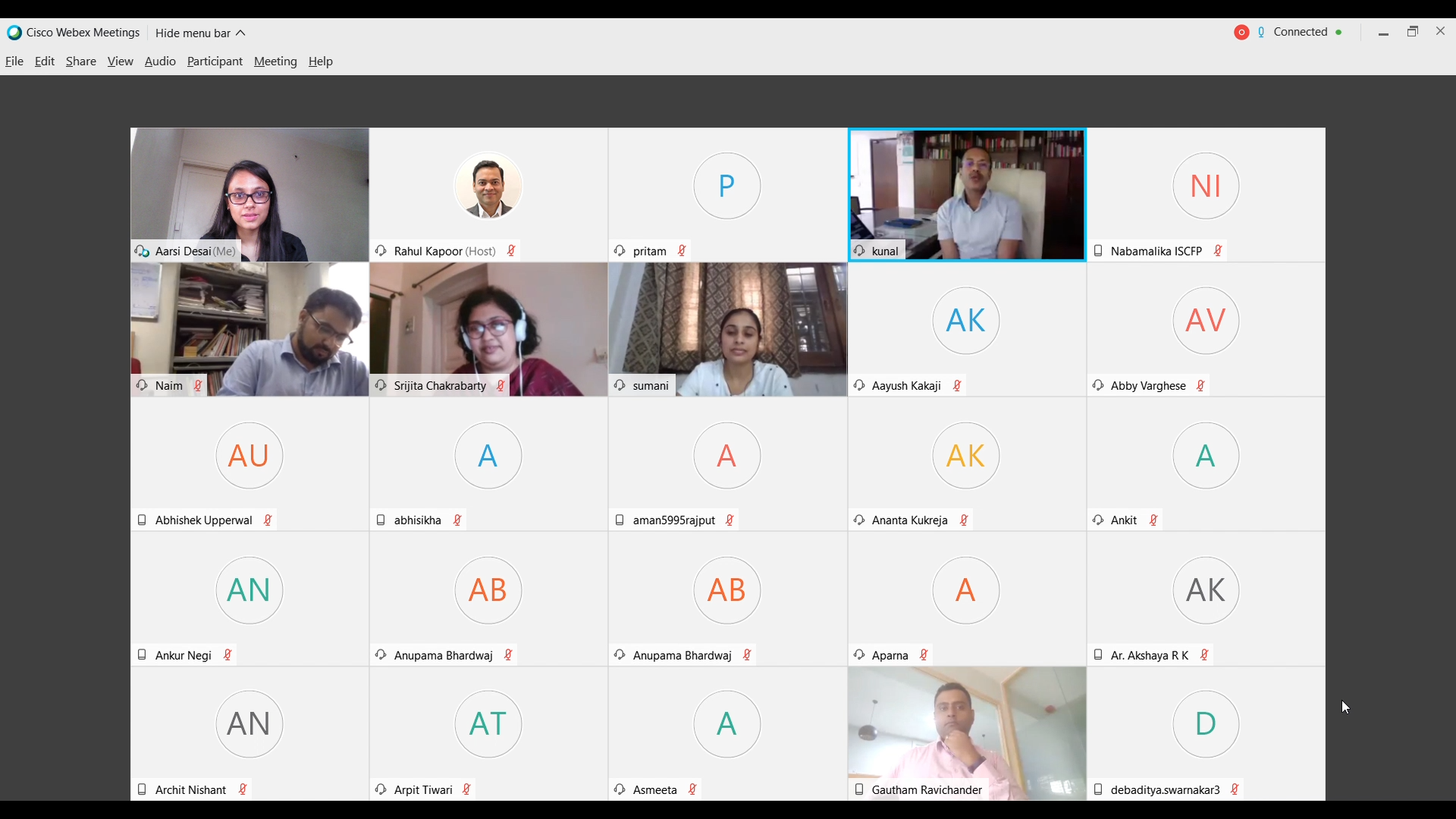
PROJECT DEVELOPMENT (7th Sept 2020 to 11th Sept 2020)
Post the project review, the teams continued to work on their project presentation and pitch review according to the comments received from Mr.Kunal Kumar, Mr.Rahul Kapoor and all the teams’ external and internal mentors. Additionally, the teams were also involved in narrowing down on 3 cities, where their projects could likely be piloted. This involved refining the city selection criteria, each of which were individual and project specific, and were discussed by the fellows with various sectoral experts, smart city professionals and practitioners at NIUA and MoHUA.
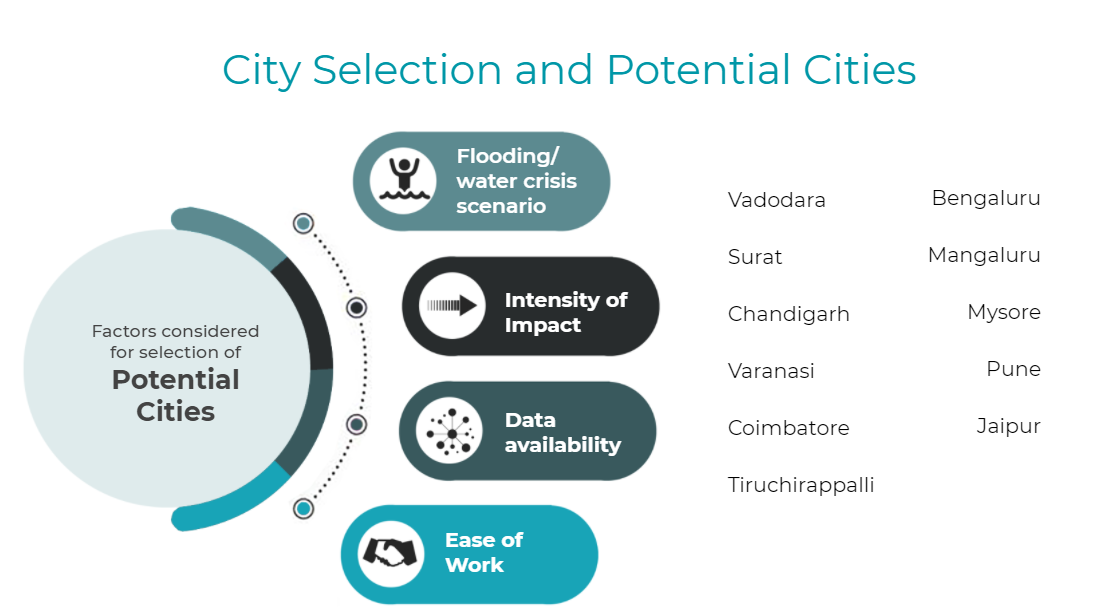
SHORTLISTING CITIES FOR PROJECT PILOT (14th Sept 2020 to 18th Sept 2020)
With a minimum of 3 cities shortlisted for the pilot of each of the project, the fellows began liasioning with various technical personnel in the smart city SPV’s to identify the data available with the cities. This involved understanding the available data points in a certain sector and the format in which it is available. Additionally, the fellows began conducting a desk research on their shortlisted cities to comprehend the scope of the project being proposed within the context of the city through online/telephonic surveys, and reaching out to NGOs, organisations and individuals from the private and public sector working within the urban sector in the city.
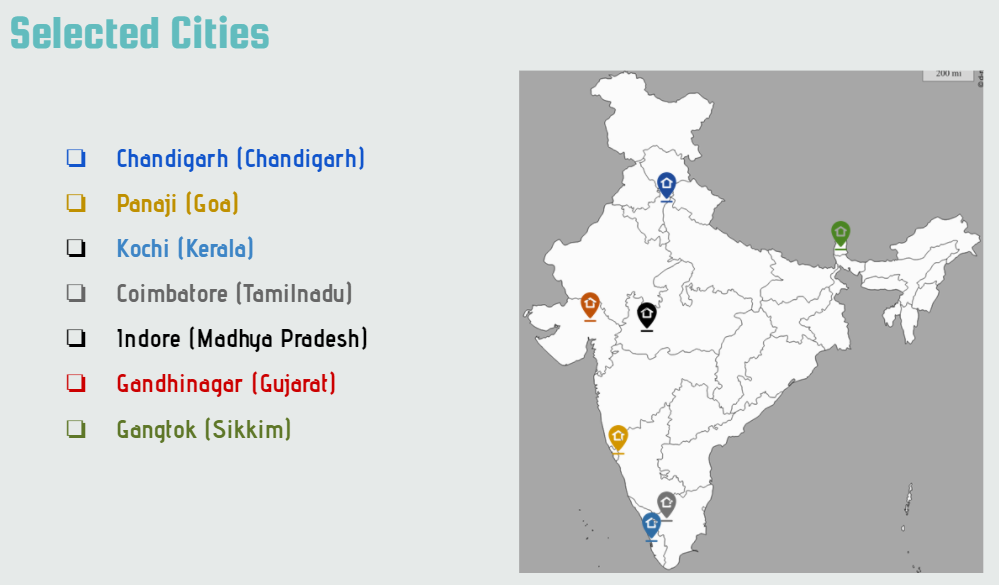
DEVELOPMENT OF PRODUCT PROTOTYPE (21st Sept 2020 to 25th Sept 2020)
With the final on boarding meetings with smart city officials fast approaching, the week involved refining the pitch videos to a greater extent involving experimenting with various software to explain project details, represent datasets to provide the smart cities a view of the product prototype. Pilot cities were finalised for most of the teams and to this extent, the fellows focused on developing their product prototypes contextualised to their pilot city which involved extensive background studies on various policies, plans and programs available in the public domain.
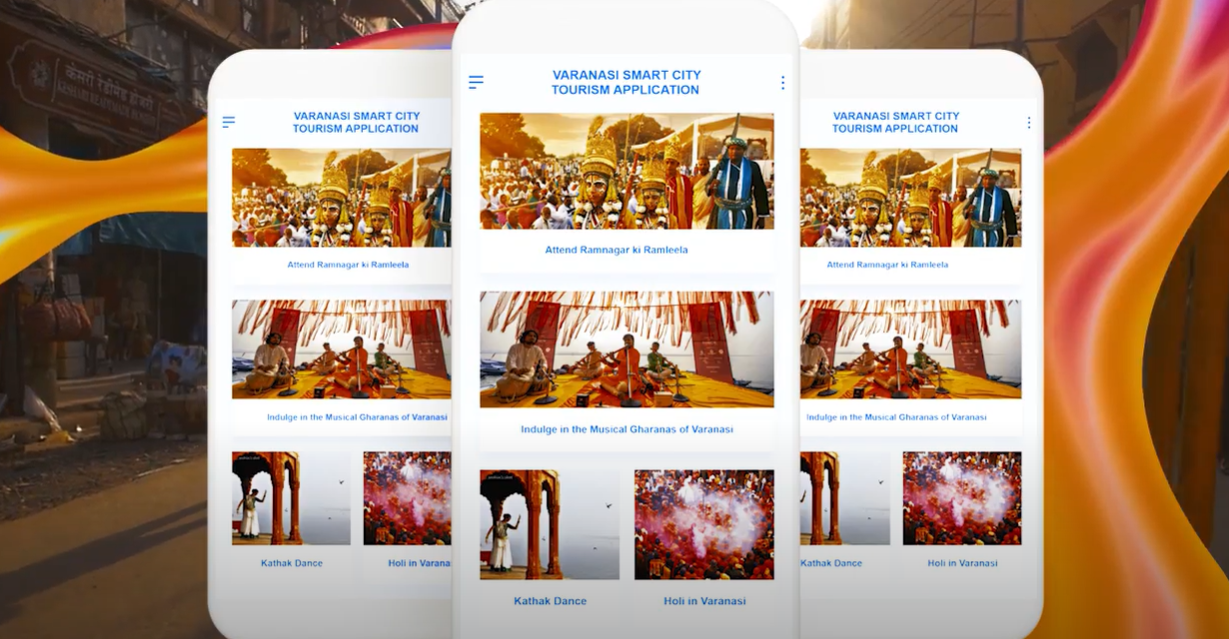
PROJECT DEVELOPMENT & PROJECT PITCH (28th Sept 2020 to 1st Oct 2020)
The week’s work involved fellows continuing with the previous week’s commenced work of city research and pitch video refinement.
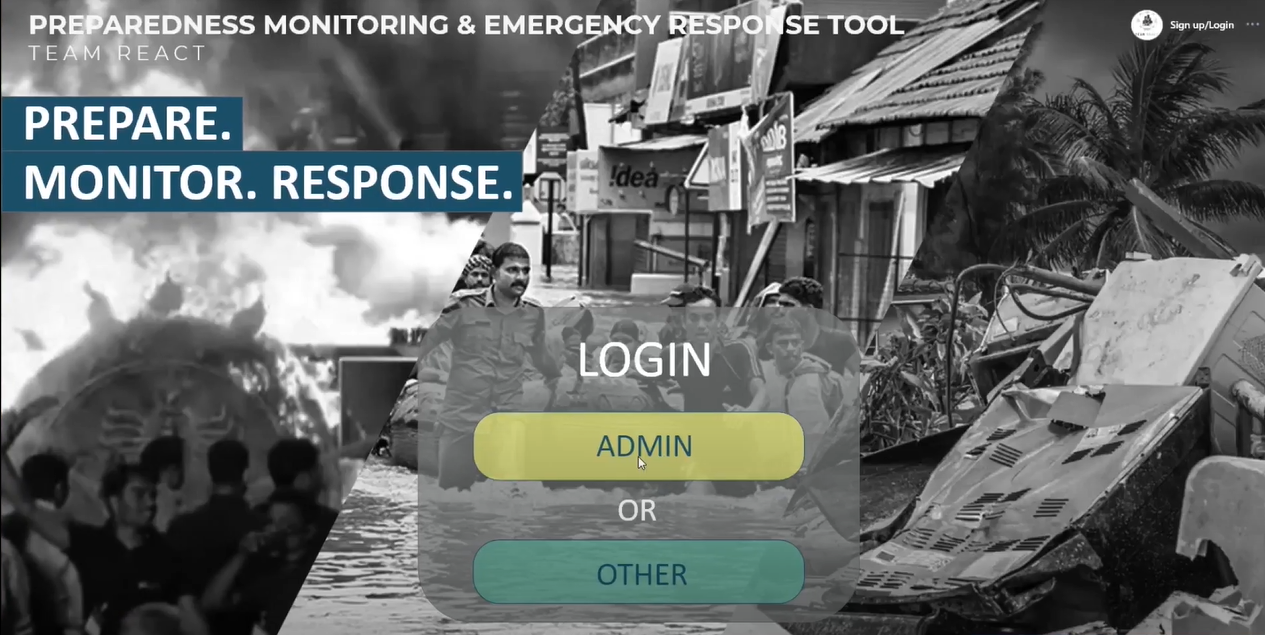
CITY SELECTION (5th Oct 2020 to 9th Oct 2020)
Based on the city research conducted by the teams, three cities were shortlisted. The cities then finalised one city by weighing the pros and cons of selecting that city on the basis of research done.
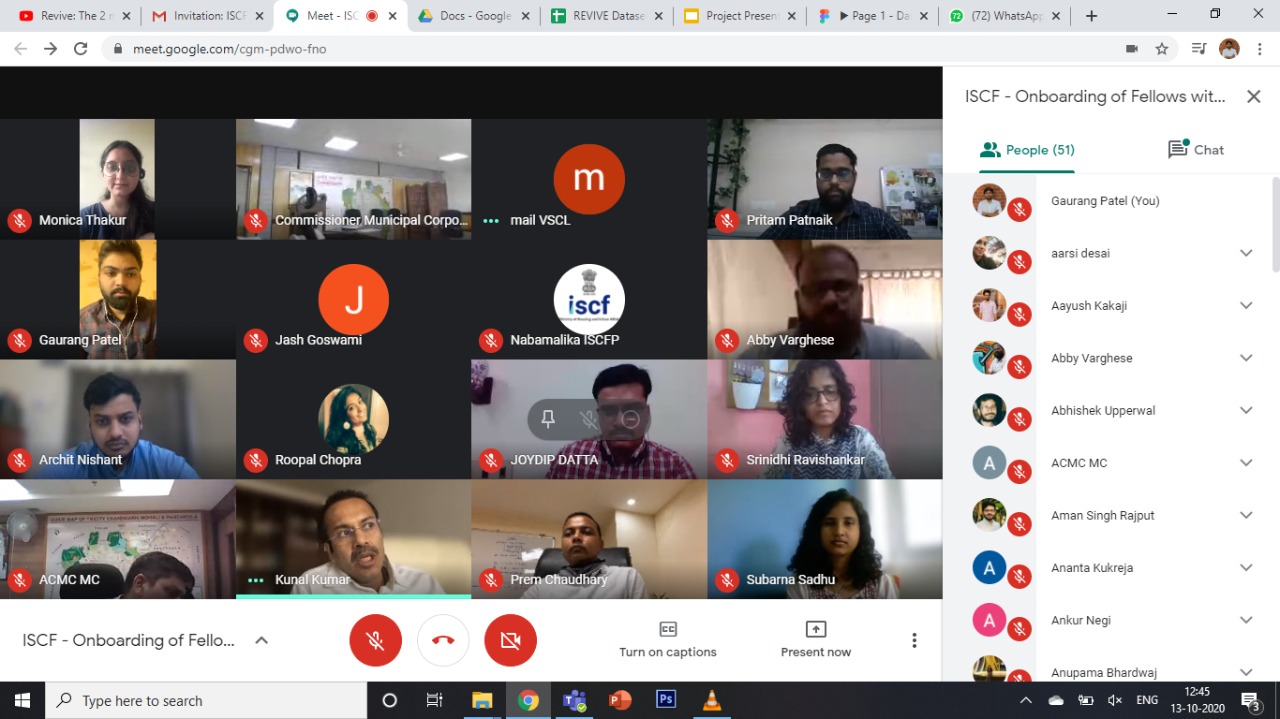
FELLOWS ONBOARDING (12th Oct 2020 to 16th Oct 2020)
The week saw the onboarding of all teams for their projects in their respective cities. Every SPV appointed a nodal officer as a Point of Contact for the fellows to coordinate with and aid them with logistical support. With this, the process of deployment of fellows in the respective cities commenced.
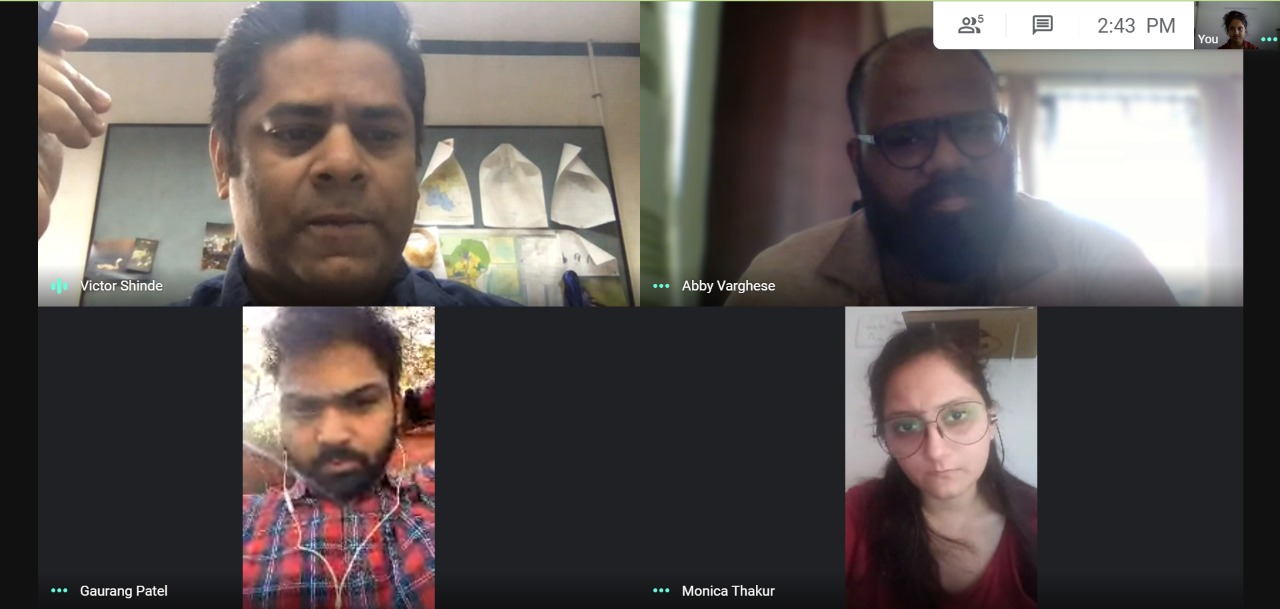
PROJECT REVIEW & PROJECT PITCH (19th Oct 2020 to 23rd Oct 2020)
With the appointment of a nodal officer, the teams arranged initial meetings with the city officials to understand the requirements and discuss the workflow of the pilot project. During this period, the fellows additionally improved their skills with various software such as GIS, Tableau, and many more.
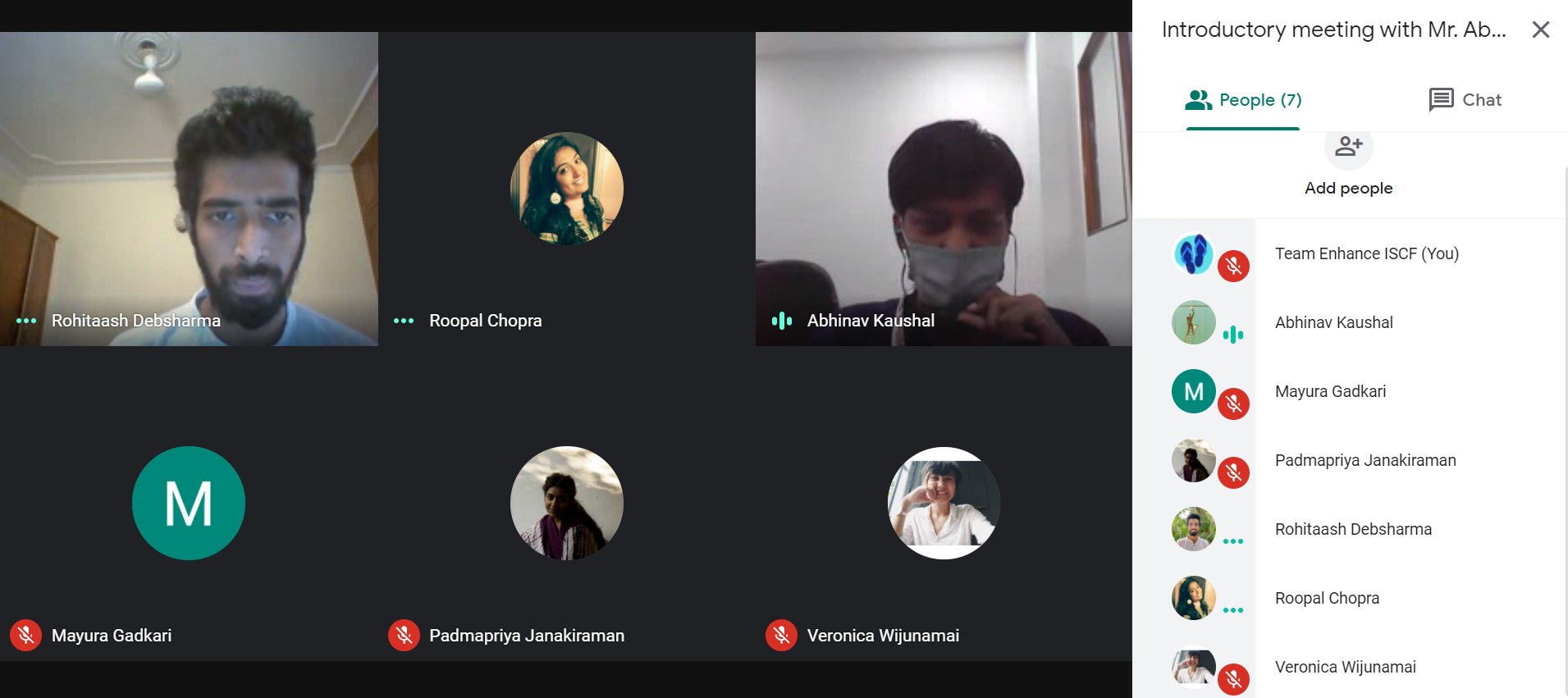
CITY RESEARCH & ANALYSIS (26th Oct 2020 to 29th Oct 2020)
This week fellows were involved in understanding the city better and analysing the Smart city proposals, related ongoing projects in the SPV, and thereby developing an action plan for further work progress. This included looking for various platforms and collaborations that could help with the availability of resources required such as data collection, product development support, and funding.
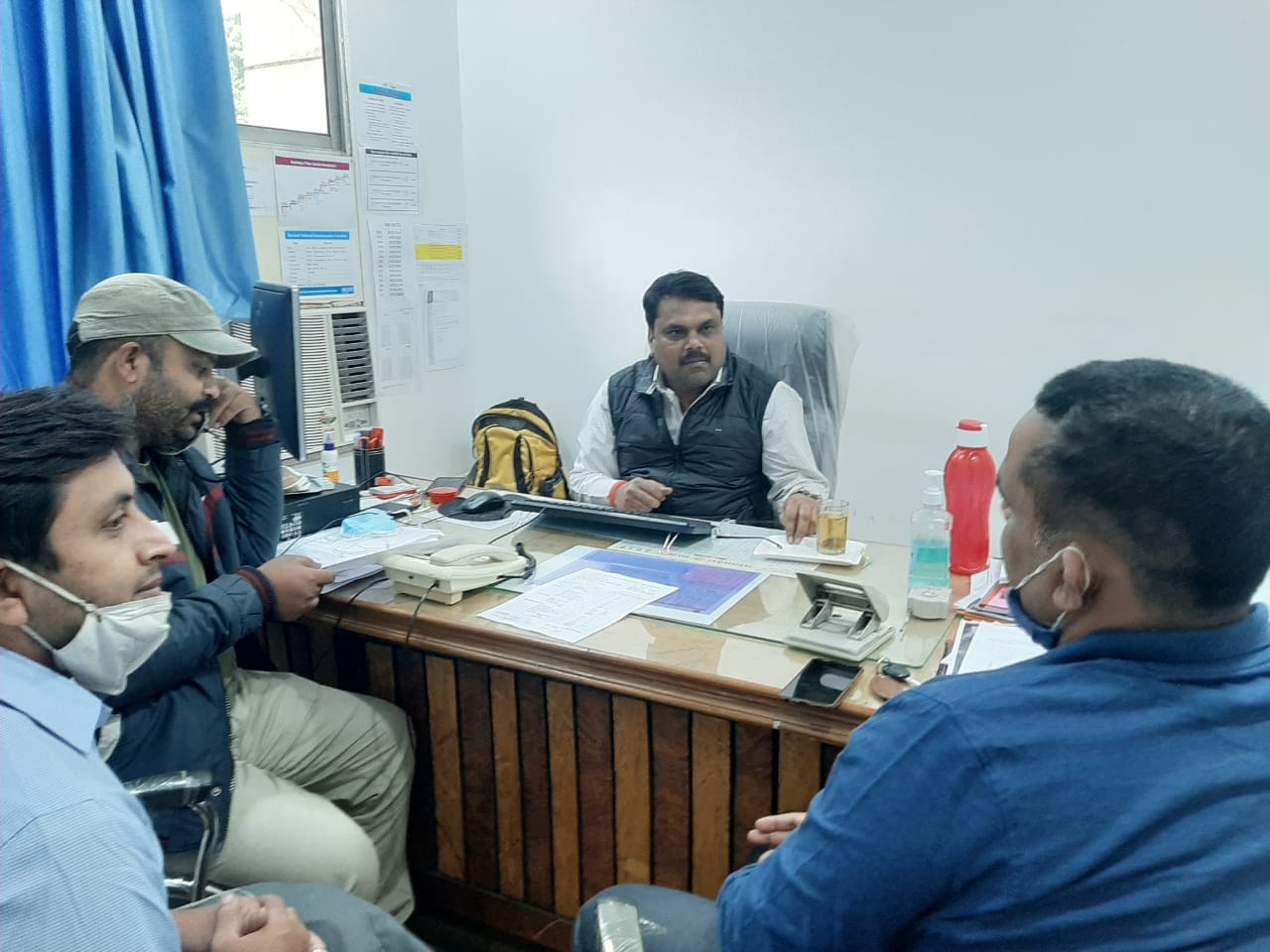
Project Commencement (2nd November to 6th November 2020)
The fellows were involved in coordinating with their respective nodal officers to schedule introductory meetings with the smart city CEOs and various other officials to discuss the action plan of the project and discussing the sources from where the data for the project could be collected. This also included the provision of the logistical and technical support that the teams required. Additionally, the fellows were also involved in the launch events of the "Nurturing Neighborhood Challenge" that focuses on shaping cities for young children and their families and the second cycle of "Data Maturity Assessment Framework" that assesses the data ecosystem of cities.
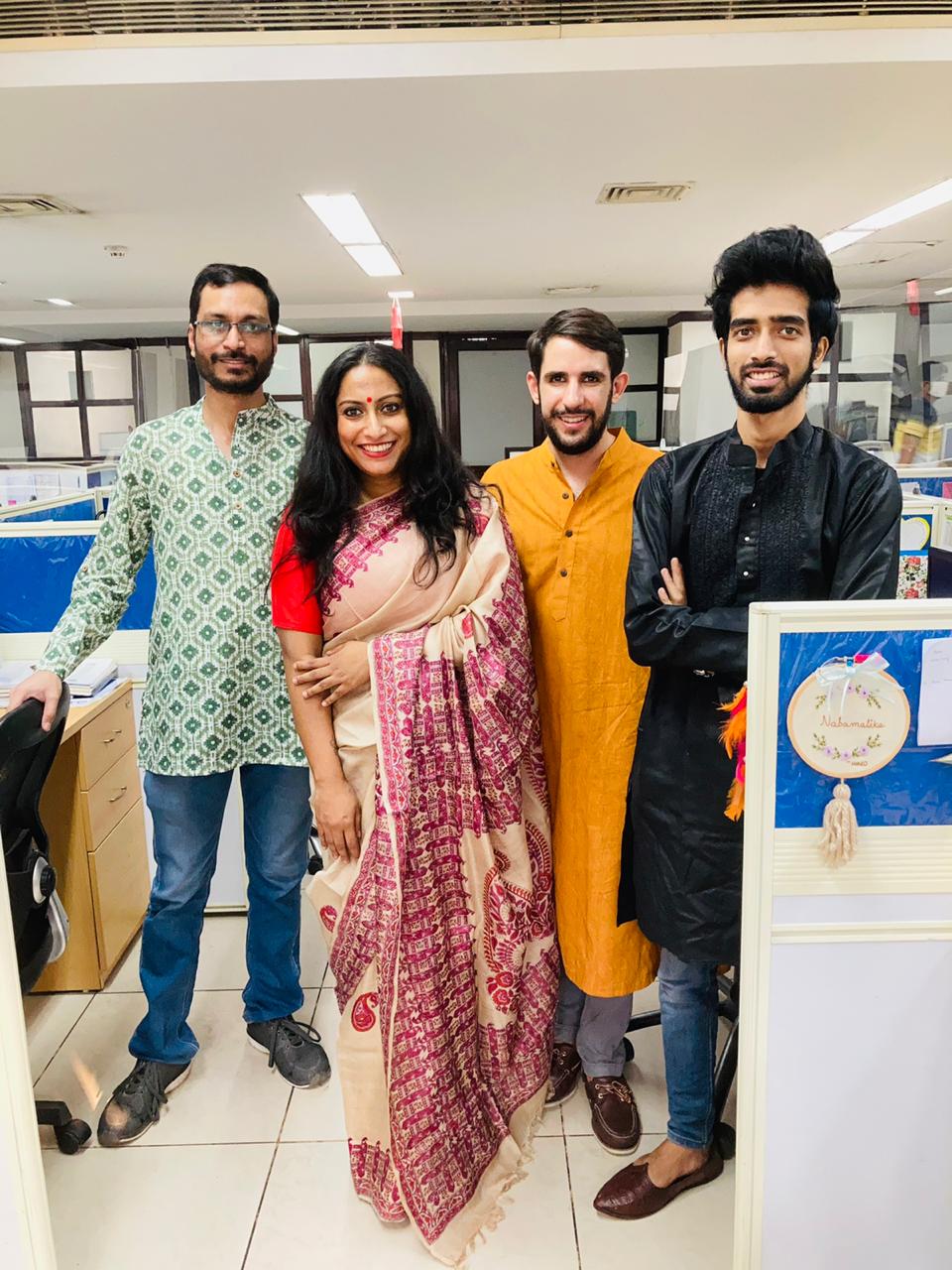
100 Smart Cities SWOT Analysis Documentation (9th November to 13th November 2020)
The fellows were assigned to document the SWOT Analysis that was done during the Investigation Phase, in a stipulated format. This document is a compendium of India's 100 Smart Cities that contains information about their current scenario and existing problems in terms of the Physical, Institutional, Social and Economic infrastructures i.e. the four pillars of the Smart Cities Mission. Along with this, it contains a critique of the Smart City Proposals, the status of the projects proposed, the challenges faced during implementation and finally the SWOT Analysis of the city. Additionally, the fellows were also involved in the discussion on practising innovation in the government by Mr. Kunal Kumar and Mr. A. Jere.
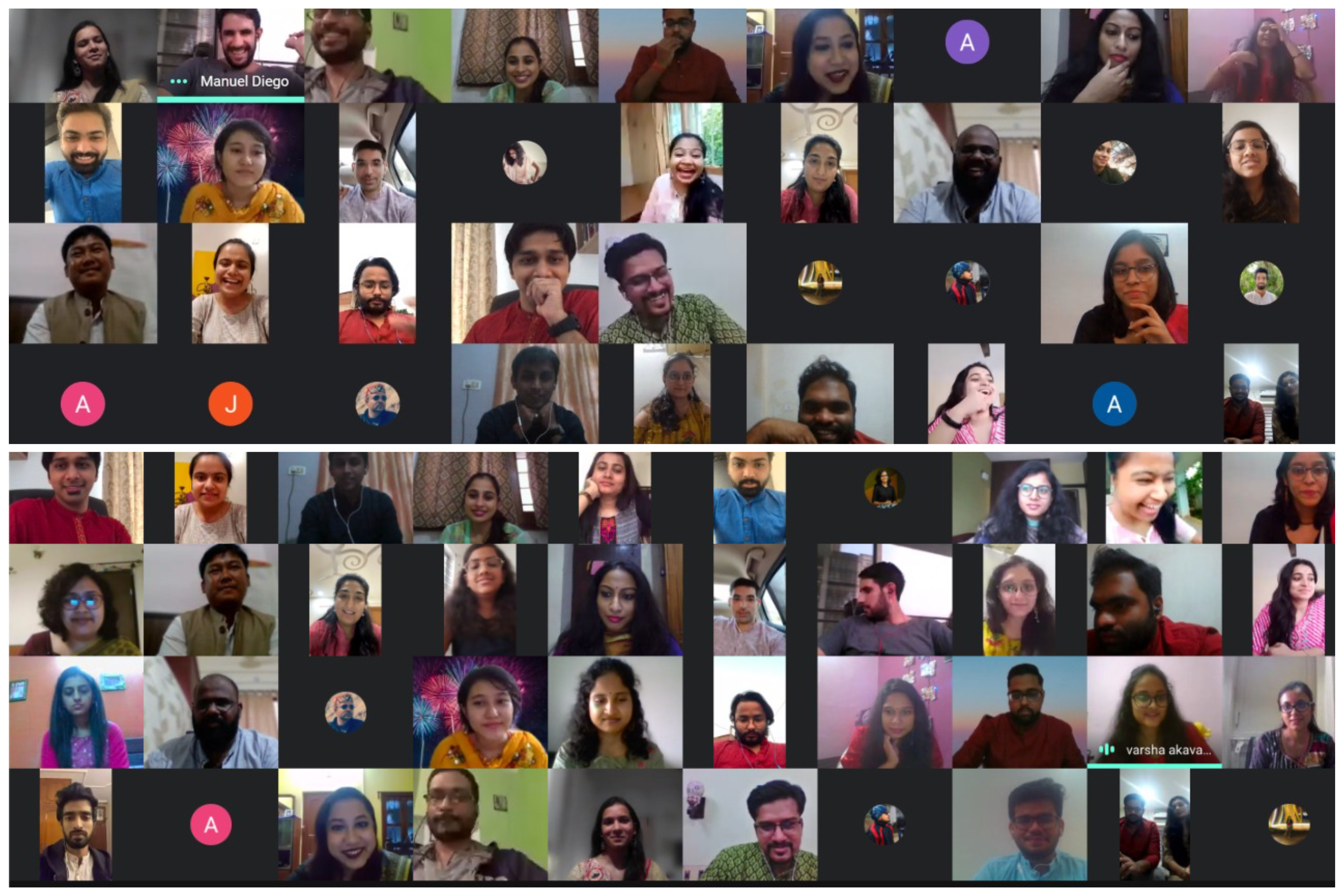
City Deployment (16th November to 20th November 2020)
The fellows were deployed into their respective pilot project smart cities. Soon after meeting the smart city CEOs and various officials, the fellows presented their projects and discussed the way forward in terms of the required city support. The fellows began their preliminary site/field visits and reconnaissance surveys aiming to comprehend and visualize the city according to the theme and scope of their project.
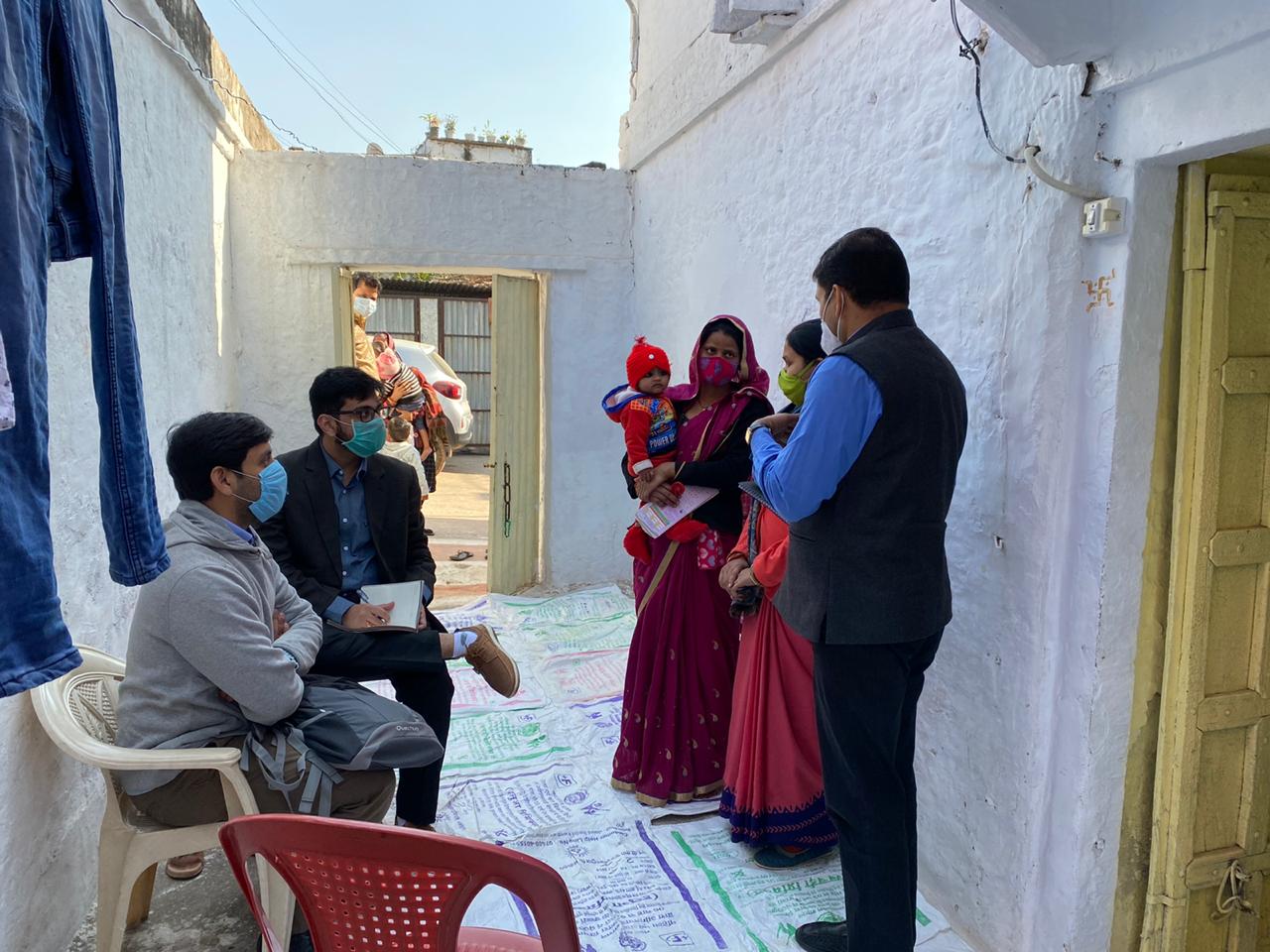
Liaising with City Officials (23rd November to 27th November 2020)
In the cities, the teams focussed on mapping relevant parastatal authorities and departments for their respective project’s data collection. This was followed by the fellows approaching the identified departments with official correspondence from their respective smart city CEOs to collect the required data. Alongside, the teams continued the site/field visits for exploring the city, enquiring and meeting citizens as per the project theme to map citizens’ needs and mould the project accordingly. The week culminated in a review meeting with the higher-authorities of the fellowship.
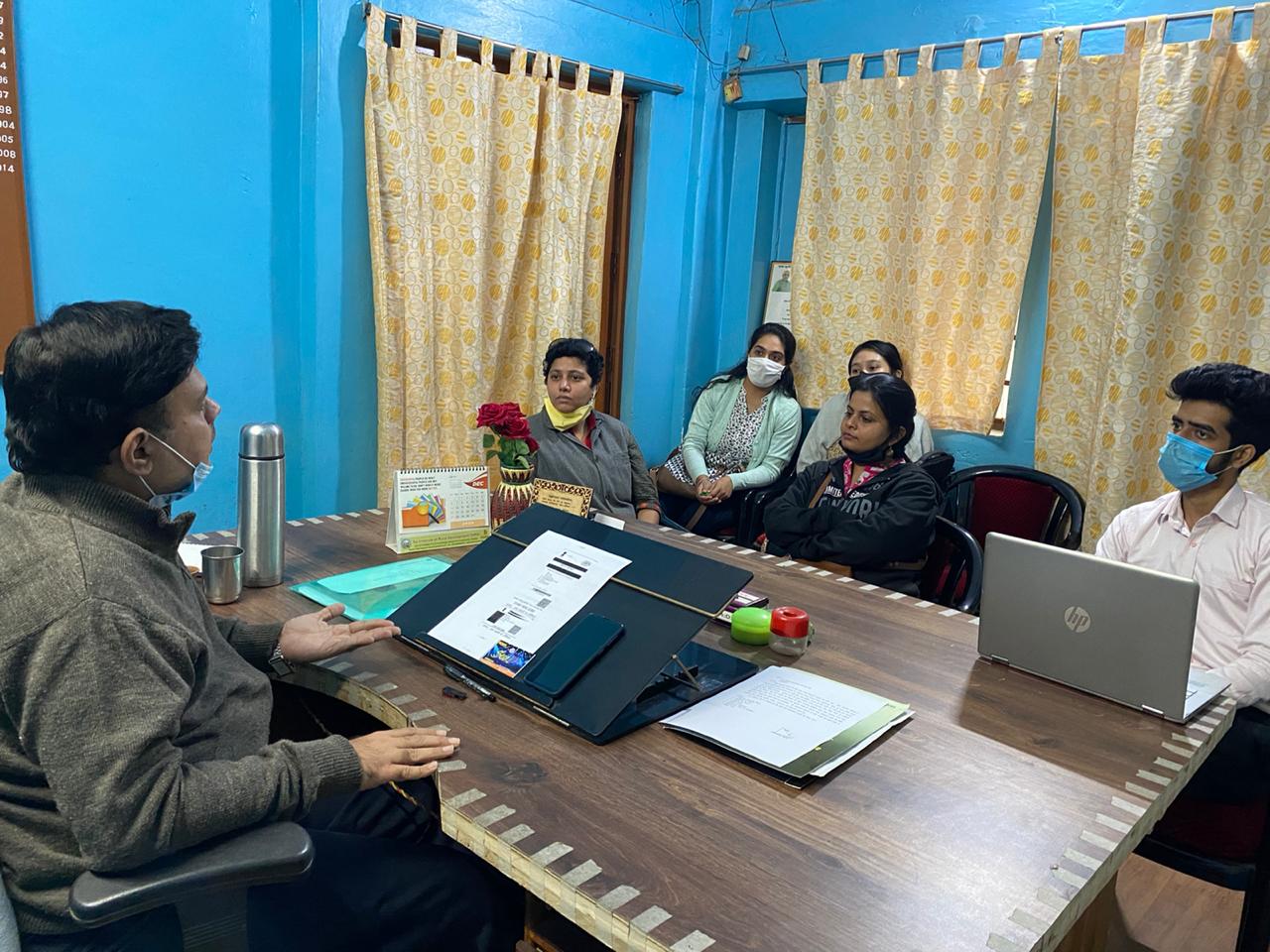
Field Visits and Stakeholder Meetings (30th November to 4th December 2020)
Similar to the previous week, the fellows worked on establishing rapport with the various stakeholders in their respective smart cities. This week saw the fellows cleaning, sorting, translating, and compiling the data that was received from various departments and parastatal authorities for further analysis. Simultaneously, the fellows continued working on India’s 100 Smart Cities SWOT Analysis document.
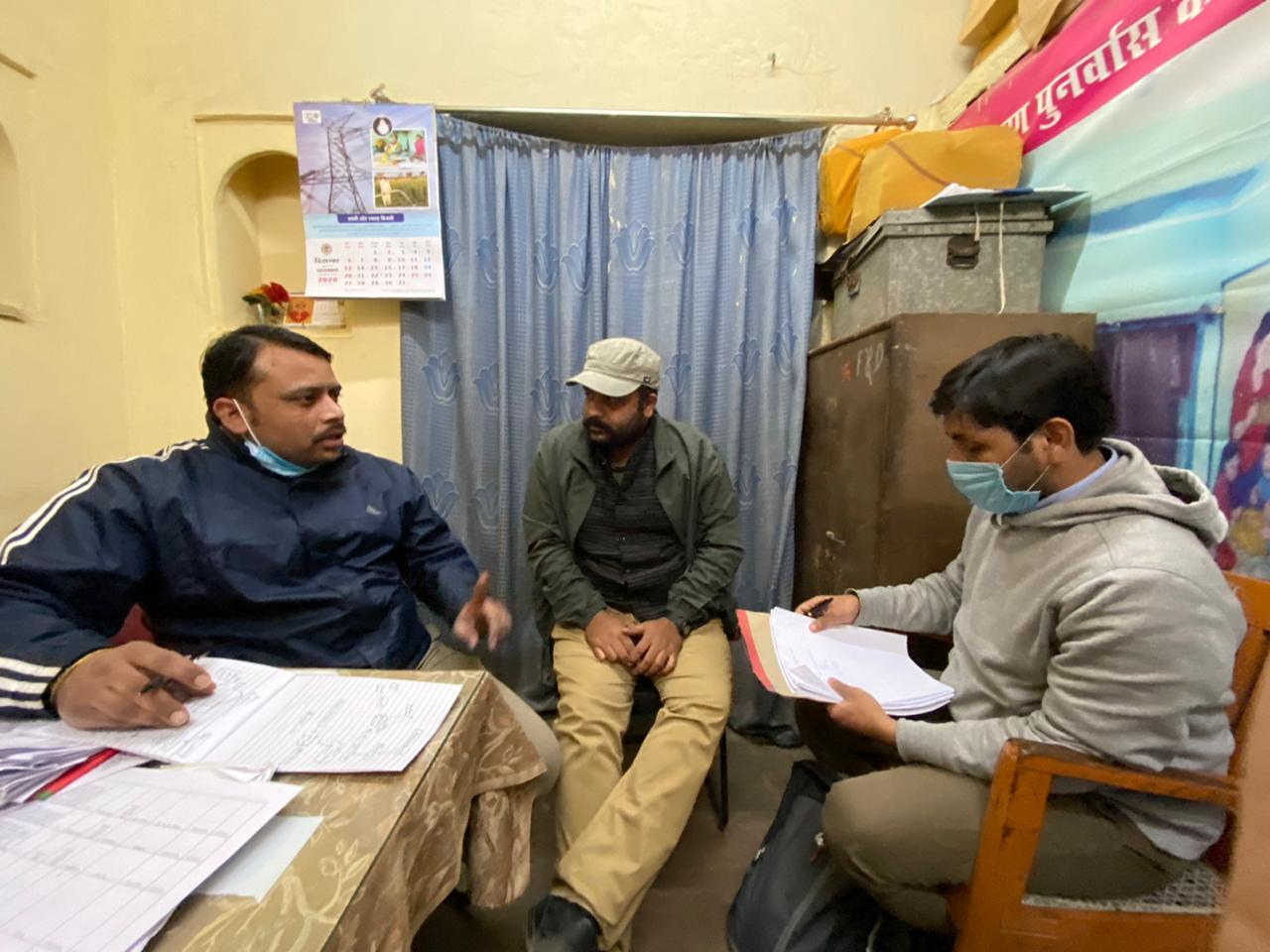
Data Collection (7th December to 11th December 2020)
The long process of data collections and arranging stakeholder meetings for every team continued. Team React, in Shimla conducted meetings with the District Disaster Management Authority, Himachal Fire Services, Architecture and Planning Department to name a few. They, along with their nodal officer finalized the indicators to analyse urban fire hazards in the city for their product development, narrowing its focus and increasing its scale of implementation. Along similar lines, most of the teams were not only involved in defining their project’s scope, but they were also simultaneously working on drafting project charters and FRS documents to commence the product development process for their projects. Team Stride on the other hand had an opportunity to participate in the ‘Cycles4Change Challenge’ and presented their design interventions to Mr. Raj Cherubal, CEO of Chennai Smart City. Team Umeed had a chance to visit the Odisha migrant settlement in Sidharth Nagar, Bhestan, Surat to understand the on-ground realities of the migrants w.r.t the policies and programs implemented by the city during the COVID-19 pandemic. The week culminated in a project update meeting between Nabamalika Joardar, Fellowship Manager and all the teams of the ISCF cohort.
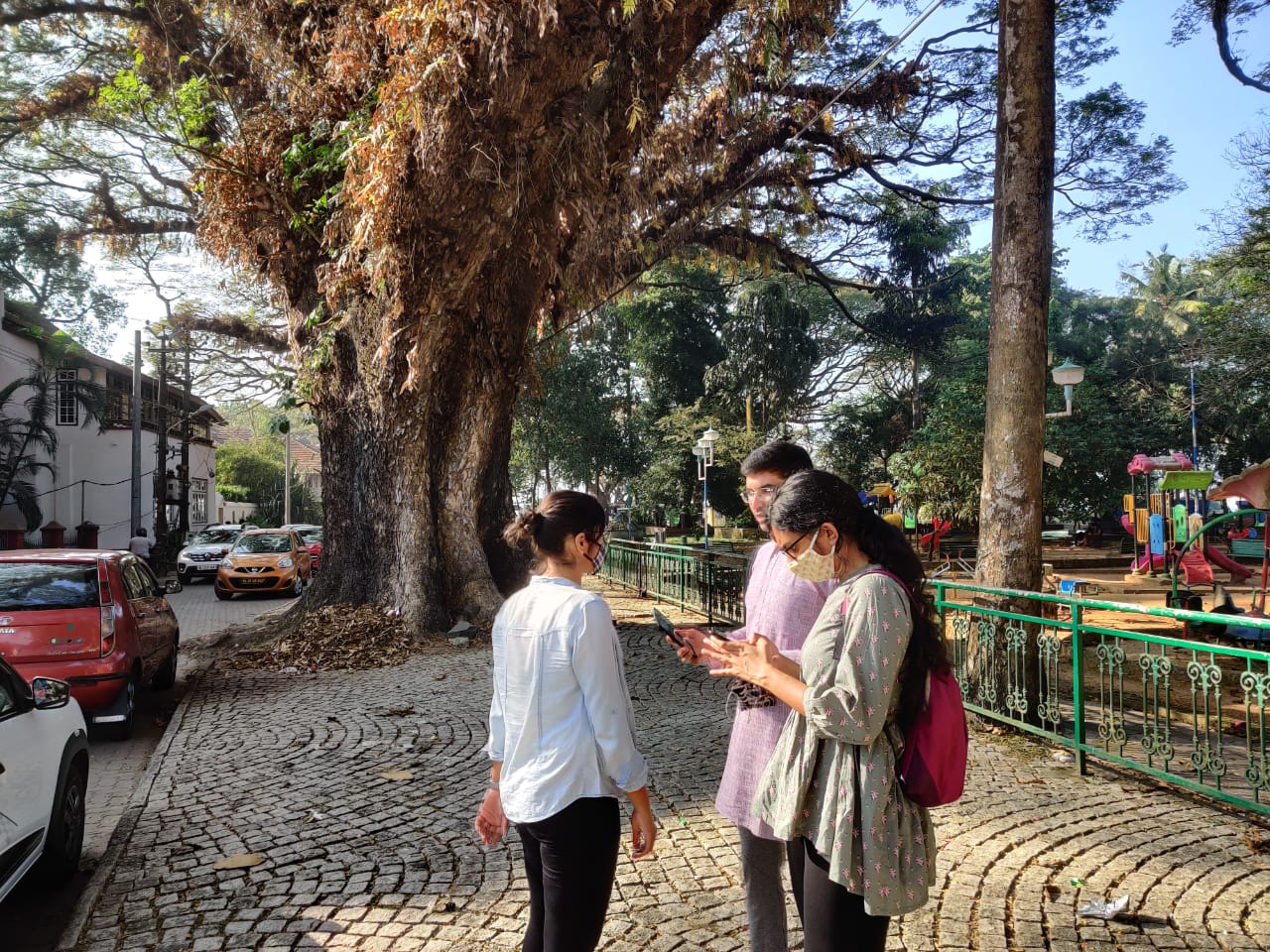
Project Streamlining I (14th December to 18th December 2020)
The week commenced with the fellows updating their project progress to their respective mentors and taking their inputs on the project. On the smart city front, Team Mobilize started working on their product’s architecture, data received and space requirements with the IT Team at Faridabad Smart City. Team Enhance on the other hand, began mapping crafts and handlooms across Varanasi Smart City with the help of technical personnel from the Handlooms and Handicrafts Department, Ministry of Textiles. The majority of the teams were involved in the stage of starting the product development with state/city-oriented IT departments/empanelled agencies/PMU as per the respective smart cities that the teams were in.
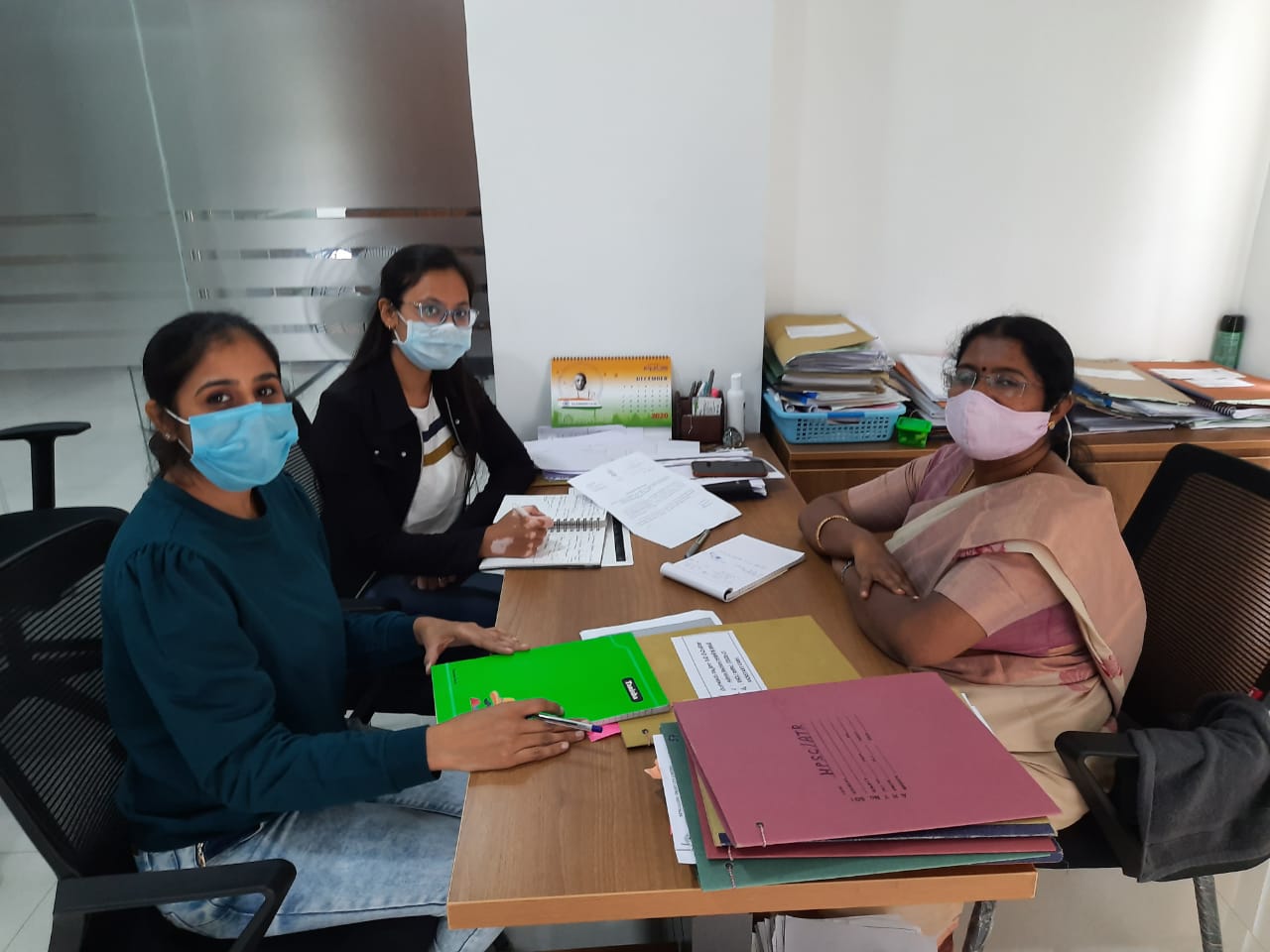
Project Streamlining II (21st December to 25th December 2020)
The teams majorly worked on scheduling consultation meetings with developers for product development this week. In this regard, they focussed on furnishing formal letters from the smart city in order to onboard development and knowledge partners to their respective projects. Team Mobilize, utilizing the TULIP platform, invited applications for interns to develop their product. Team Saksham on the other hand was involved in drafting the Functional Requirement Document for the IT department of Pune Smart City Development Corporation Limited (PSCDCL) to help them comprehend the extent of requirements that the team requires to develop the web application. Team Build too had a series of recurring meetings with the IBI Group and Honeywell Consultancy in Bhubaneshwar where they briefed developers about the design, interface, and data requirements for their project's dashboard. Team Preserve was presented with an opportunity to participate and brainstorm for the 'Cycle4Change Challenge' and presented their idea to the CEO of Kochi Smart City.
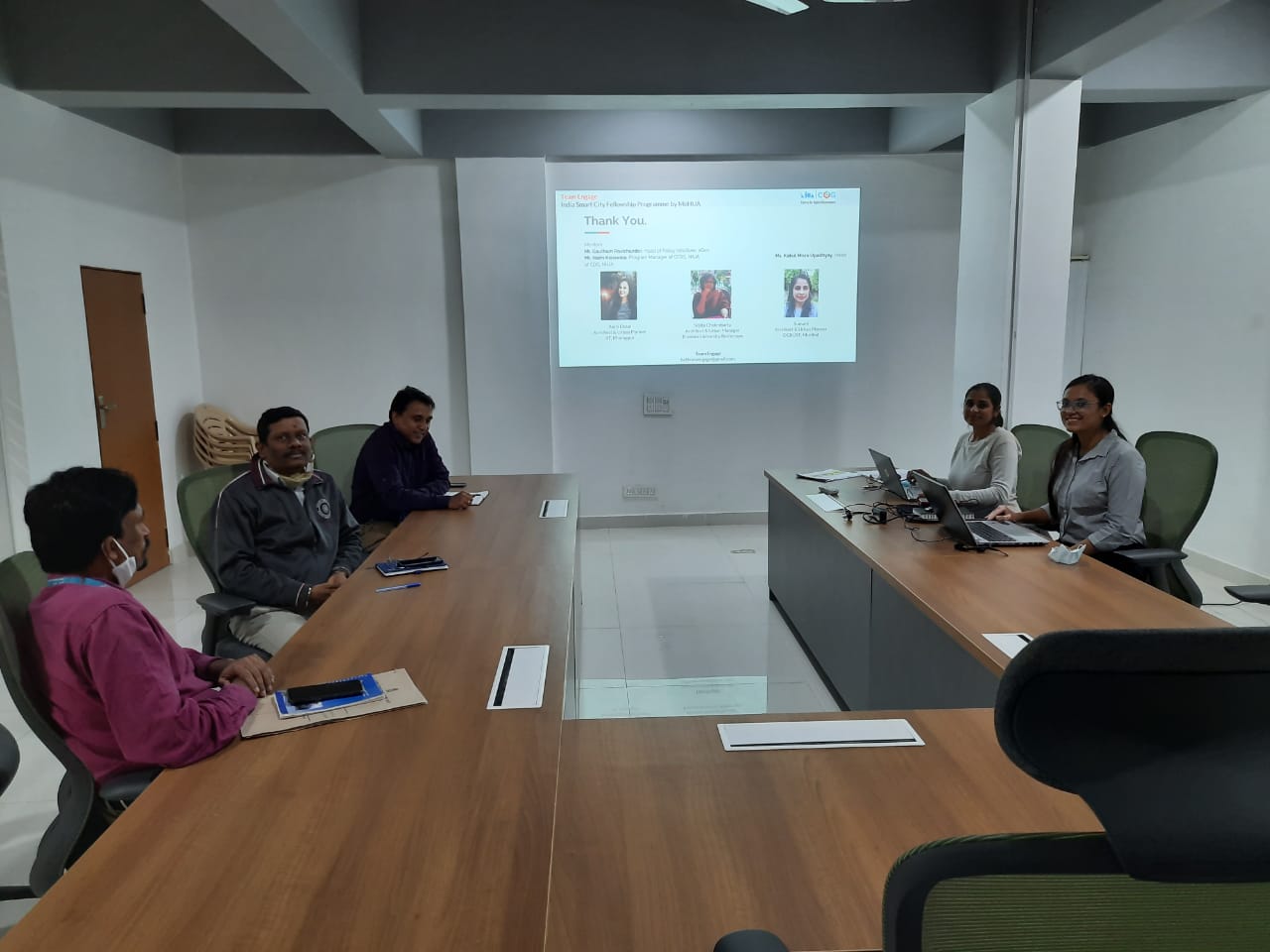
Product Proceedings I (27th December 2020 to 1st January 2021)
The fellows focussed on identifying data gaps, data pre-processing and began data analysis for their product development. Team Mobilize hired the required number of interns and began their product development in association with the Faridabad Smart City. Team Revive drafted the ToR document, revamped their proposal document, and conducted a UI/UX design meeting with the developer for their product to be developed in association with the Chandigarh Smart City.
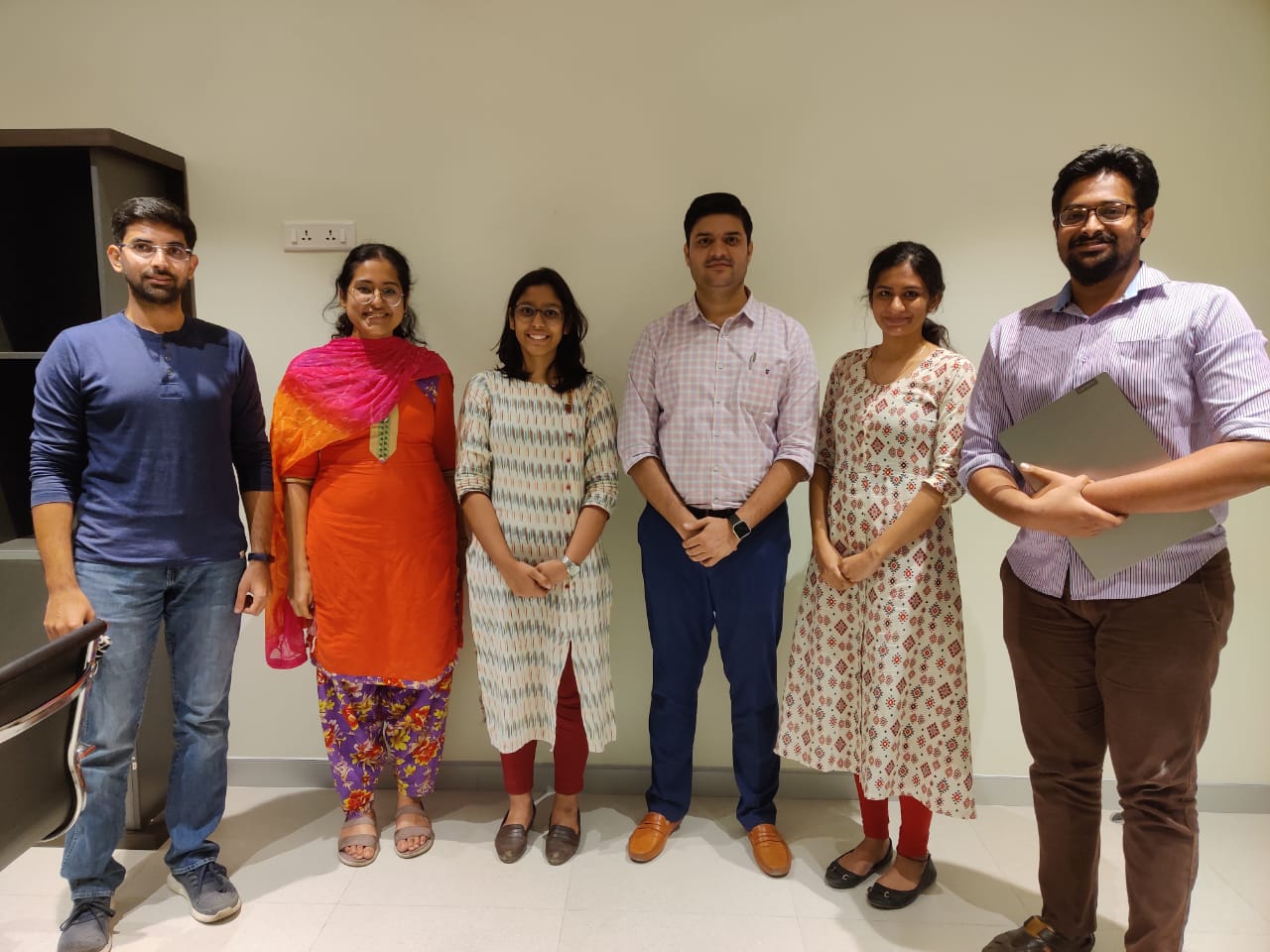
Product Proceedings II (4th January to 8th January 2021)
This week, the teams followed up with their respective city officials and other relevant stakeholders to get hold of the data required for their projects. Most of the teams also had meetings with both their internal and external mentors to give the project updates or for consultation on the projects. While some of them also reached out to staff from NIUA for expert advice. Team Reckon for their project contacted Tanya Debnath from NIUA for Housing Income Pattern Calculations. Meanwhile, Team UMEED had a joint project discussion with Mr. Kunal Kumar, Joint Secretary of MoHUA, Mr N V Upadhyay, Deputy Commissioner, and Mr CY Bhatt, CEO, Surat Smart City. Team Engage had back to back meetings with experts to discuss the storage space required for their platform. They also reached out to the NGOs for possible collaborations and assistance.
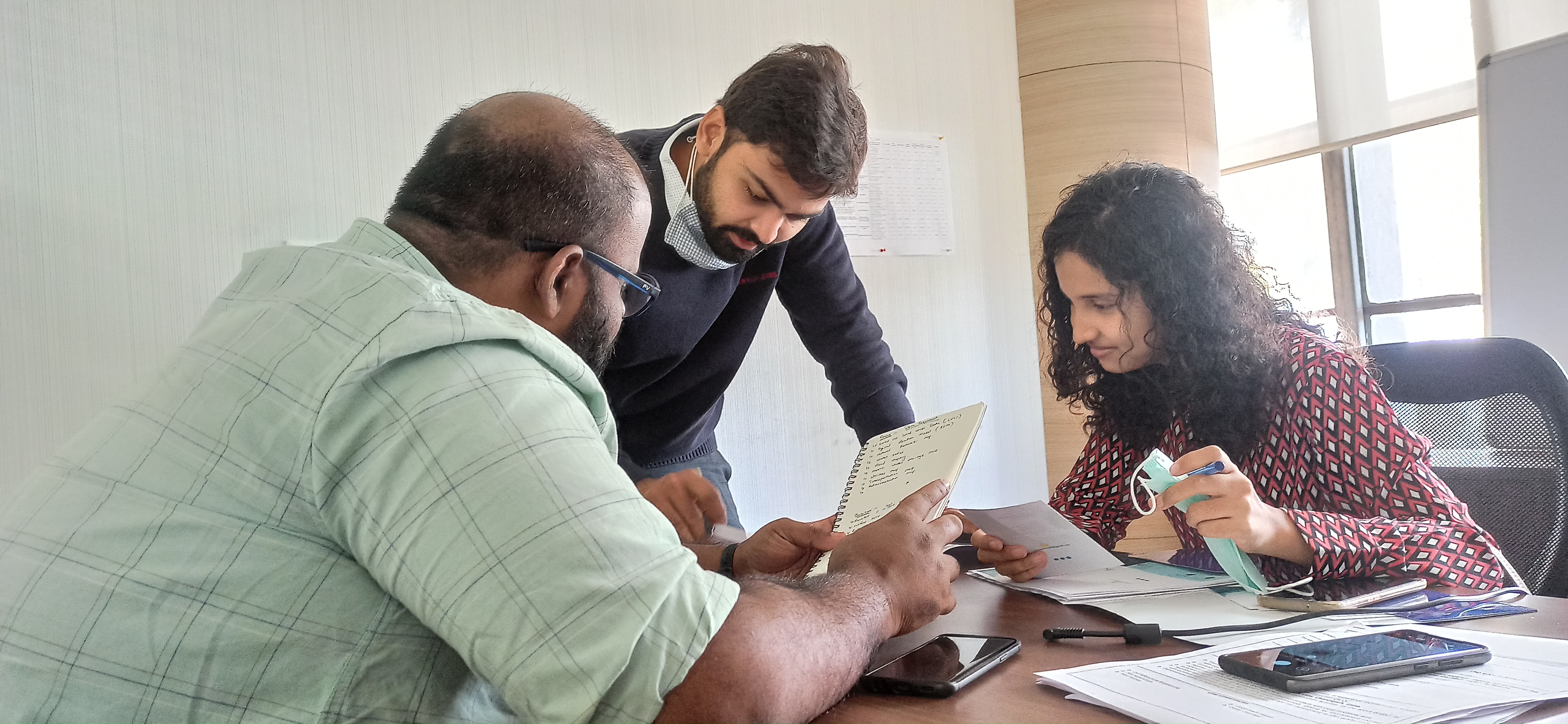
Product Proceedings III (11th January to 15th January 2021)
Over the week, many teams inducted app and web developers for product development. Few teams also started carrying out action plans for on-ground interventions. Temas were also engaged in figuring out ways where the product could be linked with the existing systems via API Integration or other methods to make the product dynamic in nature. Team Preserve carried out the second pilot testing of their product. This week, Team Stride primarily worked on streamlining the project approach note for the approval process, and also continuously made engagements with officials from Chennai Smart City through emails and calls. On the other hand, Team React made progress with their data collection from their visit to the Himachal Pradesh State Disaster Management Authority and Deen Dayal Upadhyay Zonal Hospital.
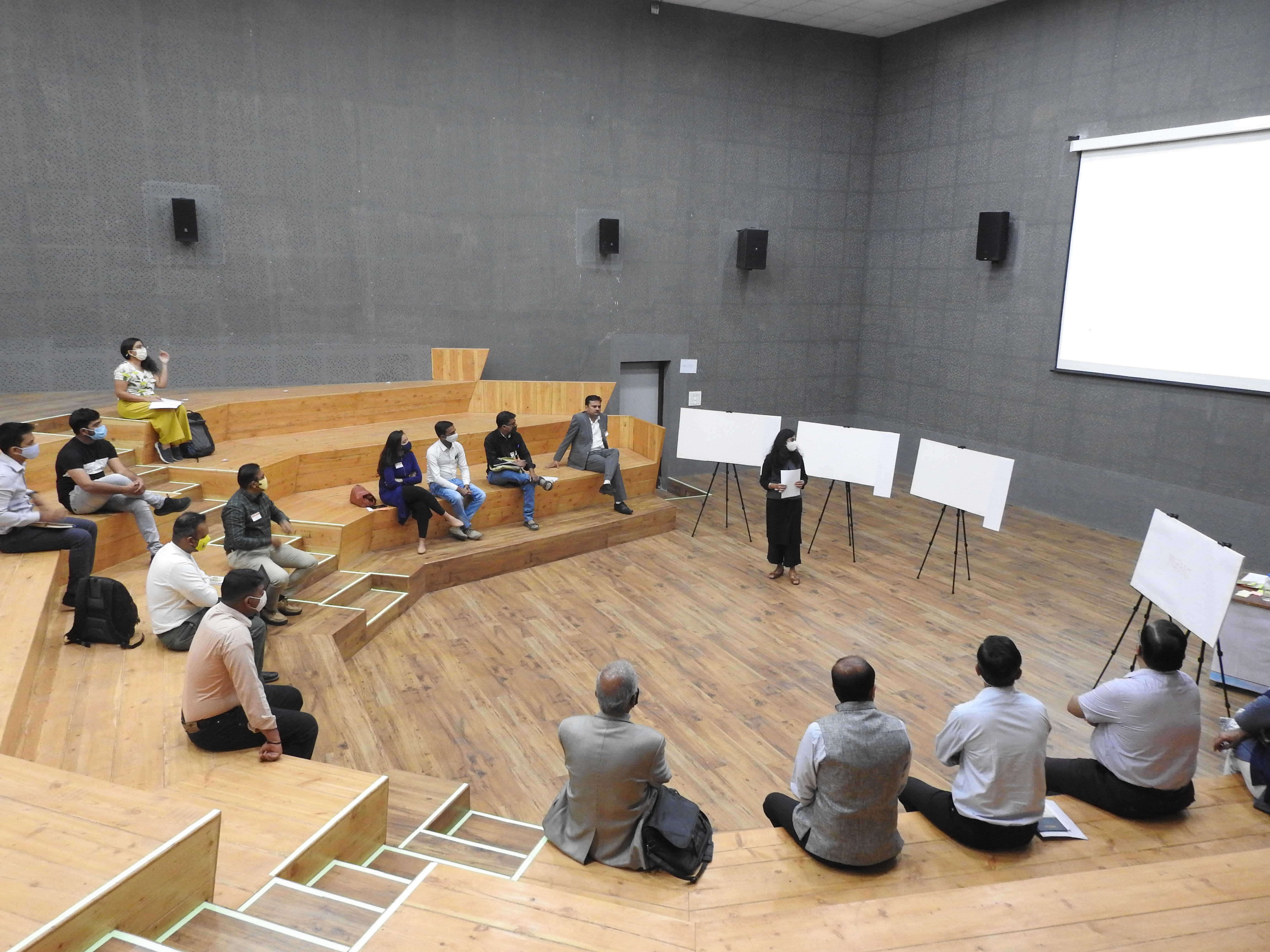
Product Proceedings IV (18th January to 22nd January 2021)
The teams continued the process of data collection, carrying out discussions with the developers and making initiatives to connect their projects with the citizens and the industry. Team Enhance, Team Revive and Team Stride began the development of UI/UX of their products. Team Enhance continued with the cultural mapping for the Handloom and Handicraft Sector. The team had the chance to meet Mr. Rajeshwar Acharya ji who is a Padma Shri Awardee and the Chairman of Sangeet Natak Academy. Team Saksham was gearing up to organise an interactive webinar with the education sector professionals to understand the challenges and requirements in Pune.
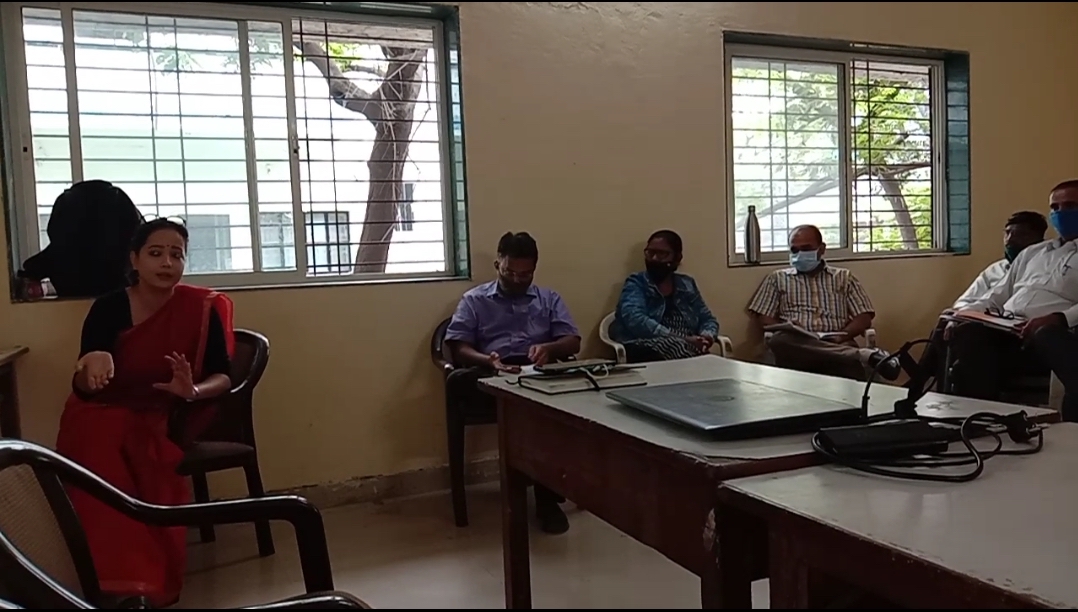
Product Proceedings V (25th January to 29th January 2021)
As a majority of the teams continued to be immersed in the process of data collection and data sorting, they were simultaneously working towards refining their products. Among these, a few were able to move towards the stage of testing their products entirely and partially. Team Preserve had their fourth product testing with the interns in Wards 1, 2, 3, 4 and 5. Team USHA conducted their first dashboard review meeting with the web developer this week. They also met with the District Collector to get his inputs on the project, post which the team completed their deployment period and joined the regular office at NIUA.
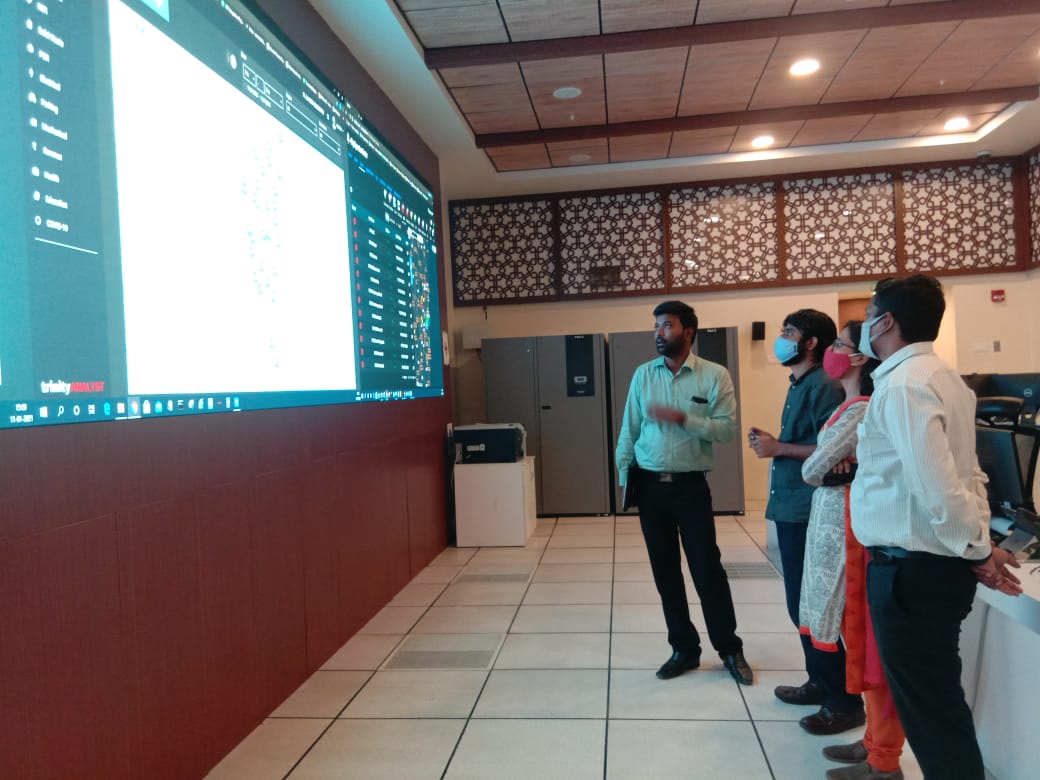
Product Proceedings VI (1st February to 5th February 2021)
The week commenced with the fellows continuing to finish the digital products under their respective projects. By this week, most of the teams started product development with full vigour. Some teams also conducted stakeholder engagements for developing their app. Team Saksham had a meeting with the Sayogi Dal at the Sikshan Mandal in Pune on the modules they should make for their app. Team Preserve conducted outreach activities for the pilot project. Team Mobilize worked with NIUA in the Smart Move Innovative Urban Mobility Challenge to organise and anonymise over 85 participants concept notes for the challenge. Team LED visited the District Collectorate of Thiruvananthapuram for a project update. Team USHA worked towards finalising the application that will be used by healthcare workers.
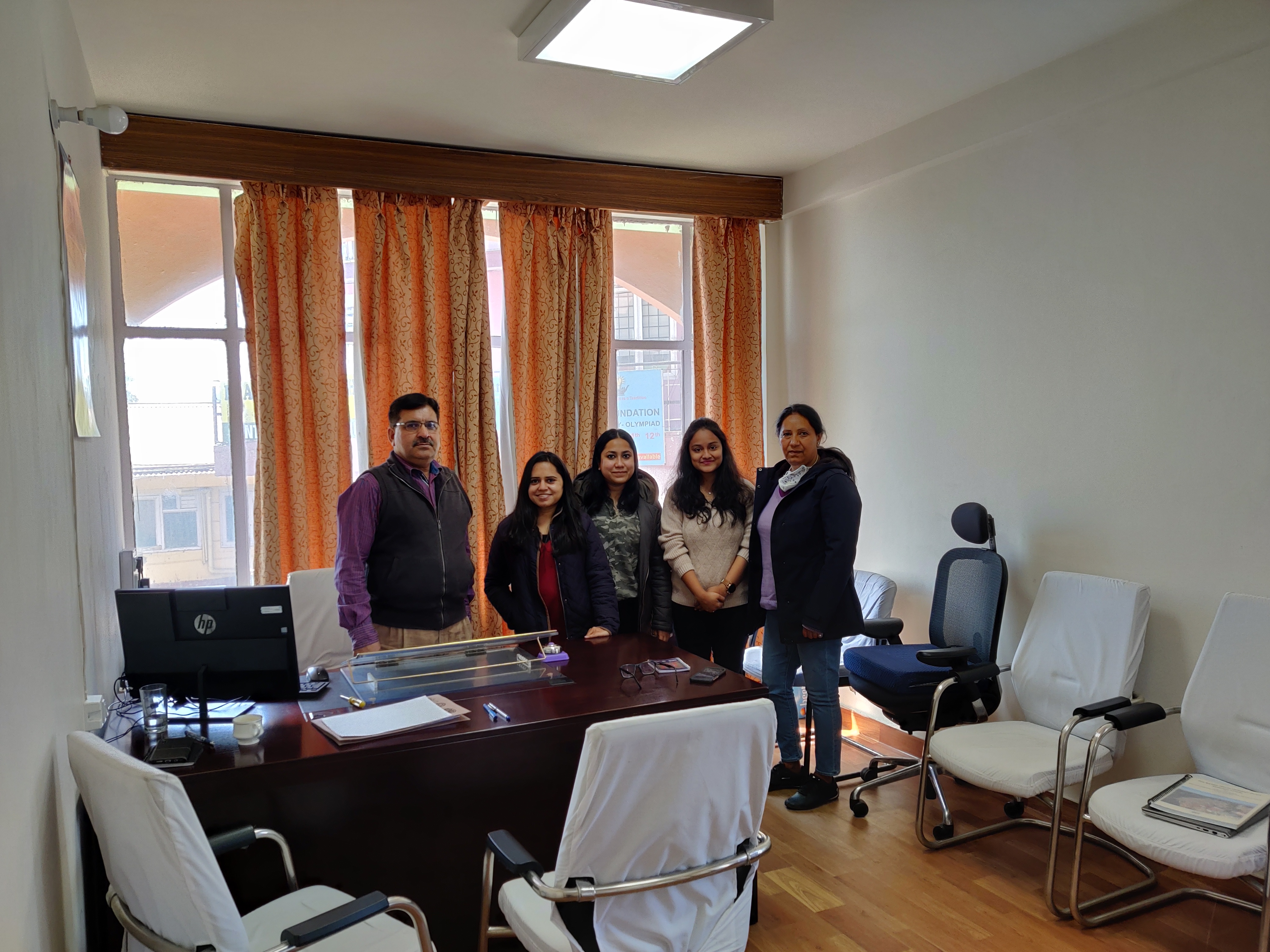
Citizen and Stakeholder Engagements I (8th February to 12th February 2021)
Team Preserve created a user manual for their tool and made a training video for the citizen volunteers involved in their project. This was useful during the Tree Mapping Drive that was conducted on 12th February 2021, where with the help of citizen volunteers, the team started mapping of the trees in Kochi. Team Stride, along with the Bicycle Mayor in Chennai kickstarted a citizen engagement campaign to map cycling amenities in the city. The teams continued with product development. Team Engage tested their product and conducted troubleshooting of errors. Team USHA finalized the design and functionality of the dashboard and hosted the dashboard on the Gwalior Smart City server. Team Mobilize conducted a workshop at the Indian Urban Observatory with the other data-led initiatives of MoHUA namely, IUDX and IUO for mutual coordination for the project. Teams Recon, UMEED and LED worked on data cleaning, standardization and analysis. Team Saksham held a webinar, “What is Social Emotional Learning” with Shri Kunal Kumar, Joint Secretary, MoHUA, Mr. Rahul Kapoor, Mission Director, Smart Cities Mission, officials from Pune Smart City Development Corporation Limited and Primary Education Department in Pune.
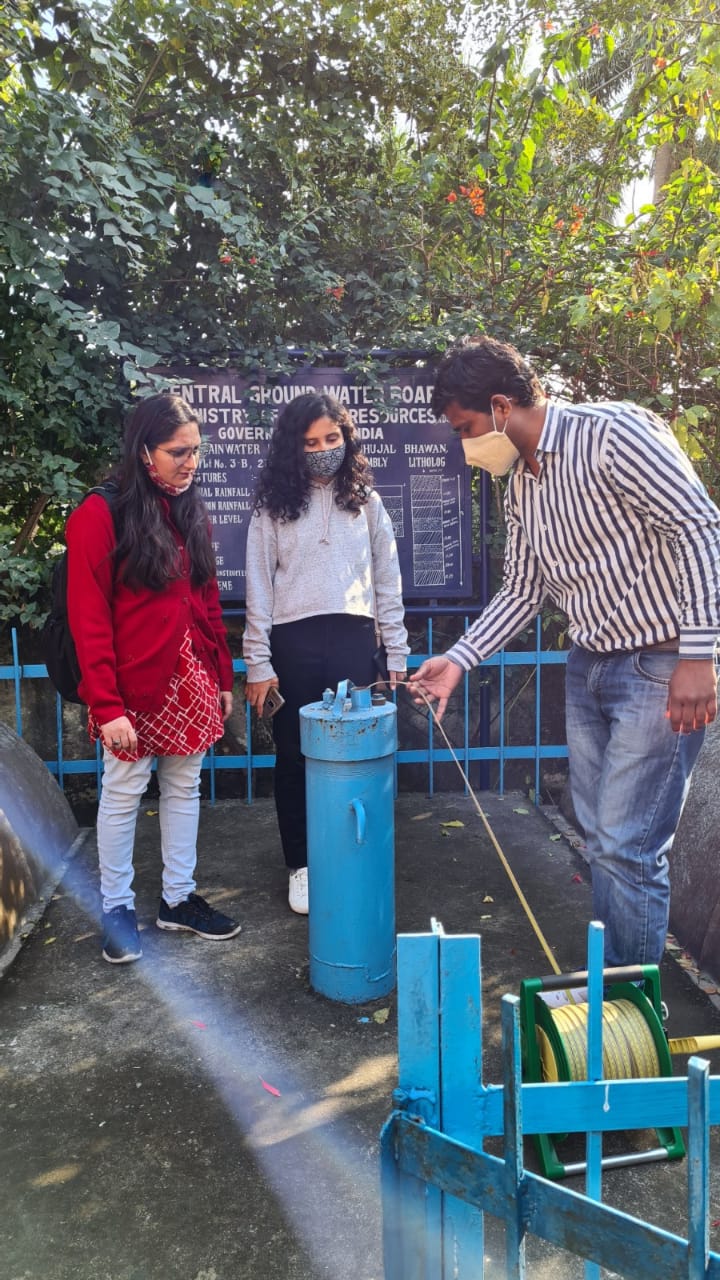
Citizen and Stakeholder Engagements II (15th February to 19th February 2021)
Team Mobilize coordinated with various city and state agencies in Faridabad to access data and to discuss open data licensing schemes. Team Preserve conducted the pilot of their project and successfully mapped 350 trees in the designated area with the help of citizens who also gave their inputs and suggestions for their app, ‘Green City’ that will be used for geo-tagging trees in the city. Team Stride reached out to the citizens persistently for crowdsourcing and the development of the prototype of their product. Team LED conducted statistical analysis for their data to input it into their product. Team Saksham visited schools to collaborate with them for their product that assesses the social and emotional learning of school children.
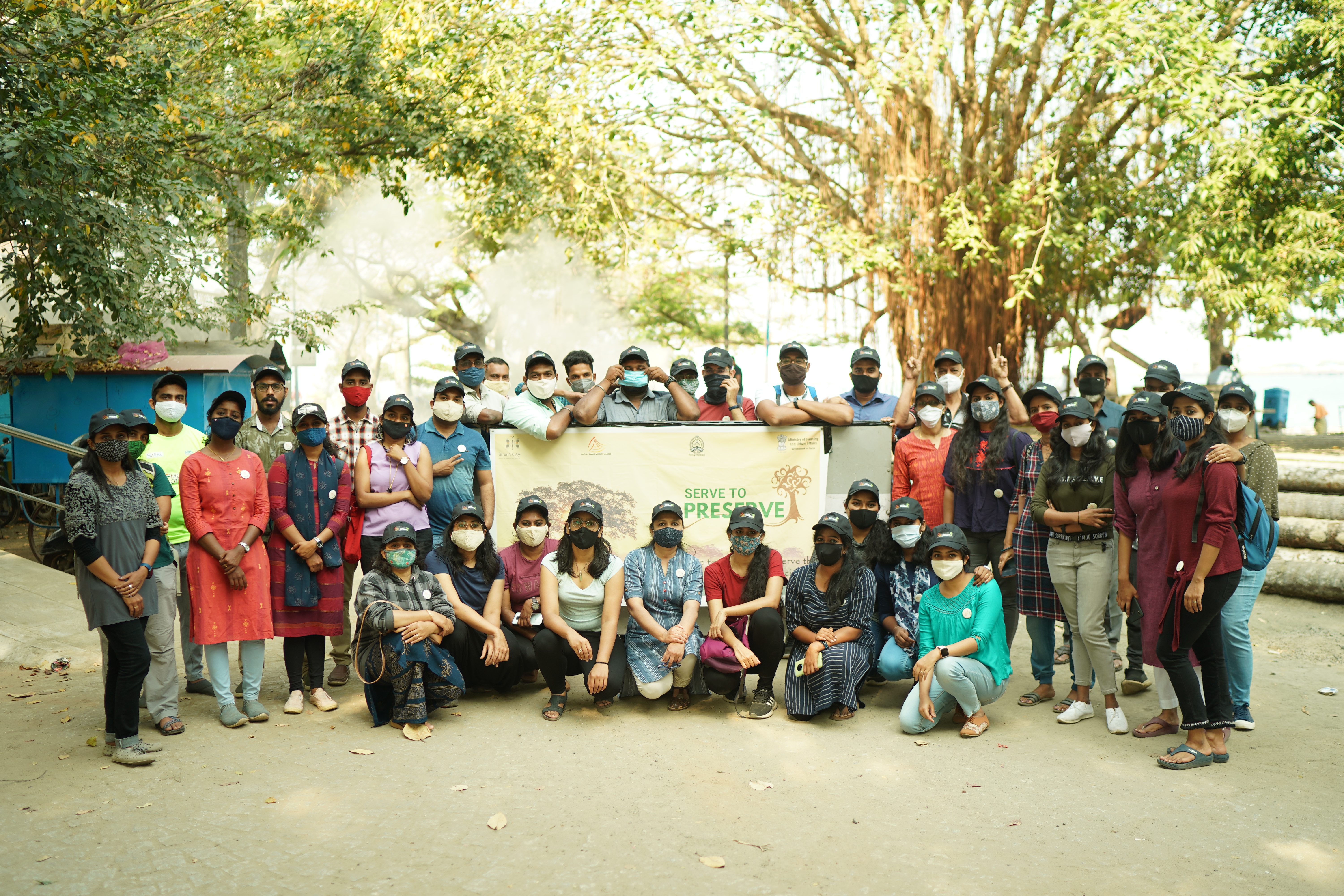
Deployment Culmination Week (22nd February to 26th February 2021)
In the last week of deployment, the teams were in the process of refining and troubleshooting errors for their products. Team Recon test ran regression models on their data sets to validate their project. Team Mobilize developed maps and dashboard in collaboration with Faridabad Smart City for the upcoming Culmination Event of ISCF. Some teams like Saksham and Engage had discussions and consultations with mentors and their Smart City officials for product refinement. Team USHA introduced the tool to stakeholders at the Gwalior Smart City and planned for stakeholder training for using their product.
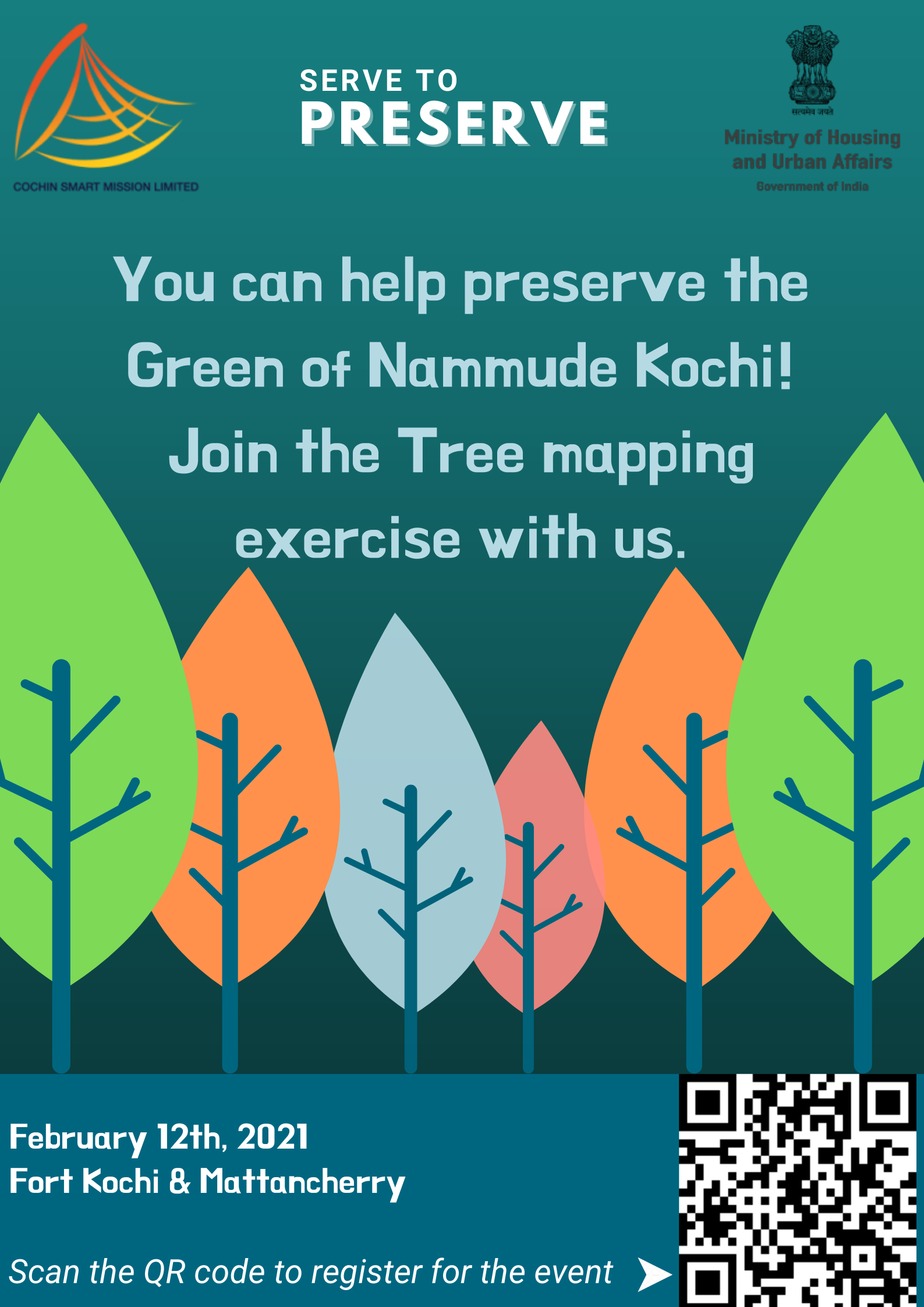
Fellowship Culmination Week (1st March to 5th March 2021)
Fellows returned to Delhi this week as their deployment came to an end to prepare for the Culmination Event of ISCF. All teams prepared presentations and videos representing the work done by them in the last one year and the products developed by them. On 5th March, there was a Culmination Event where Shri Kunal Kumar IAS, Joint Secretary, Ministry of Housing and Urban Affairs (MoHUA), Shri Rahul Kapoor, Mission Director, Smart Cities Mission, MoHUA, Mr. Hitesh Vaidya, Director, National Institute of Urban Affairs (NIUA) and Dr. Debolina Kundu, Associate Professor, NIUA reviewed all the thirteen projects made by thirteen teams of the cohort. At the end of this event the 46 fellows were felicitated by the leadership.
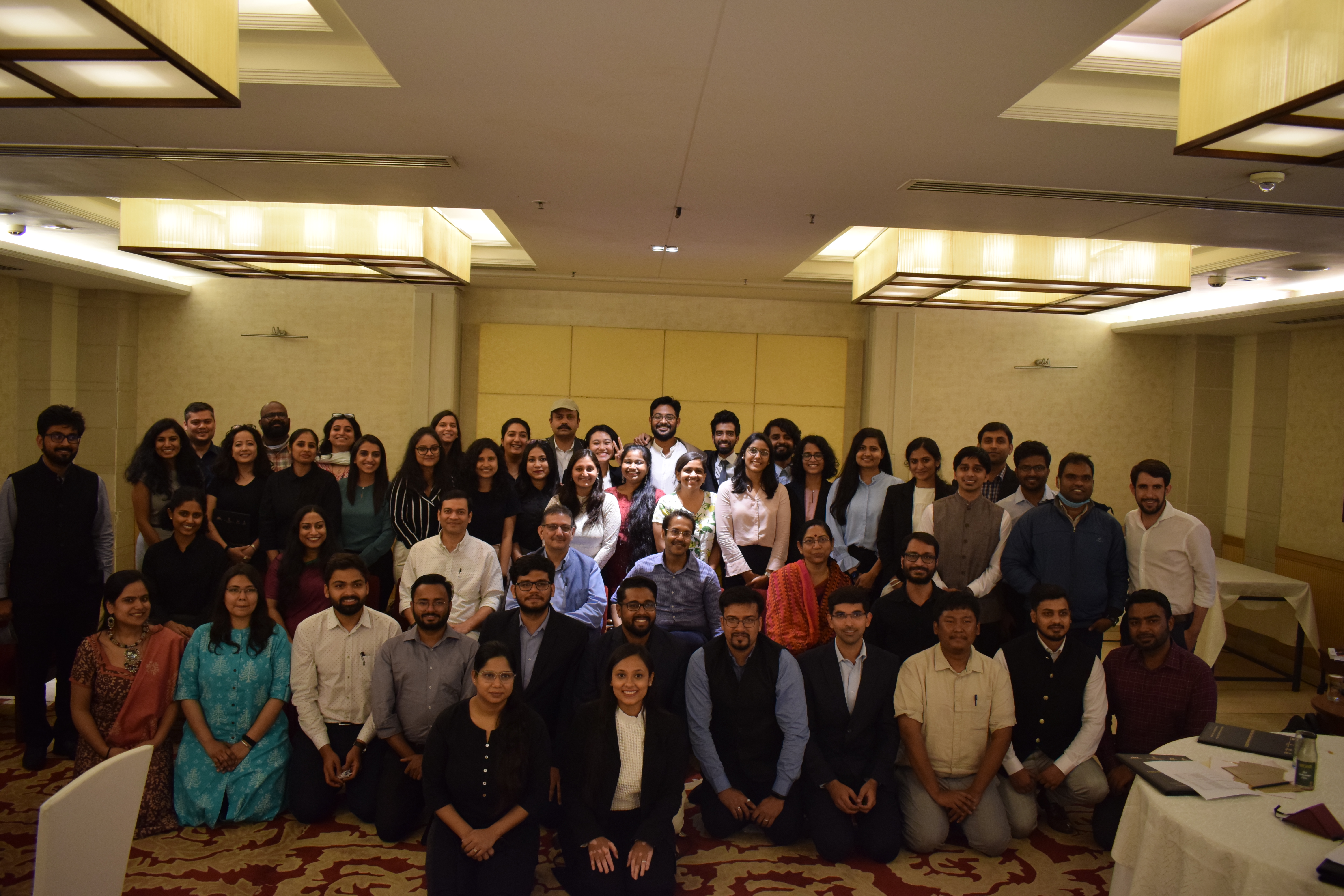
Final Proceedings (8th March to 12th March 2021)
The final week of the fellowship was spent writing project reports and standard operating procedures for the products developed. Fellows also wrote content for the Fellowship Compendium.
